#Instead I think they looked upon the destruction and the violence and the hatred in his eyes
Note
I think me and you might have two different pictures regarding the pig reader. I was picturing the most ever “Fuck it. we ball” bitch on the planet. That reader that I'm imagining couldn't win and then immediately went for The Silly To survive.
Probably not realistic at all. It is a bit more of an OC character with a second personal narrative. Maybe a bit of a Mary Sue? I don't know, I just think it's interesting.
As Someone having a battle of wills against the Luca Blight over how much Miserable Non-sexual pet play that they would do without him even saying a damn word is the kind of dark comedy I can get behind. Are you determined enough? How much of a good actor are you to act like an obedient little piggy? How long can you last holding yourself together? How much can you take and still know that you are a human deep inside? How much do you have to bury to survive? How long can this act last before you get consumed? Or can you be clever enough to get yourself out without revealing yourself to be smarter than you should? All you know is that you should never stand up and absorb as much as you can and try to keep yourself as sane as possible. you will get through this. This Little Piggy has a life worth fighting for. (((What's got to be done to make this work? How are you going to appeal to him?)))) You're not going to come out of this unscathed but you're going to come out of this No Matter What.
(((This thought probably came from How I Probably cuz I really can't comprehend somebody doing for any amount of time In this particular scenario involving Luca blight Without Either being absolute batshit insane or completely cracked out in deceit and determination. (To be fair being pathetic is totally an option but man does anyone want to be that pathetic?)))
Am I honestly asking for an unconventional badass reader in this situation? Yes actually. Can we split this in two versions cuz I think both are very valid. Mind breaking with agony due to a great fear of death versus strong-willed piggy with no shame, willing to do anything. (((Not to say that the reader in the mind breaks the Submissive Pig thing can't be strong nor is incredibly valid, of course. any reader got to be to last this long but man is that such a nearly inconceivable dark spot to even think about let alone wright geez. I like to explore all angles still )))
I actually think we're very much on the same page with this reader's strength, anon. Where you are on the outside and seeing the inherent hilarity of the situation, I'm simply writing it from the perspective of Luca Blight projecting onto the reader.
To him you are lowly. To bow your head and eat whatever scraps he's willing to give you. To oink and squeal and stare with empty eyes. To do anything, even give up your pride, to survive. He sees what he wants to see with you, a pathetic thing desperate to live, like himself all those years ago captured by a city state. It is the way of being human, a way he's long sense abandoned. He finds humor in seeing it on full display.
But you're right, the reader is strong. They made a choice and they stick by it and they are strong for it. How long are they willing to bow their head, to be treated as an animal, to be looked down upon and shamed. They don't feel that shame but it is there, in the pitying eyes of Jowy Atreides, in the mocking laugh of Rowd, in the way the Windamiers refuse to acknowledge them. It's there, it is not felt but it is there and it is known.
The one thing I've yet to wrap my head around is the reader's feelings for Luca. You'd expect resentment, hatred, for the man who burned your village and murdered your friends and family and now owns you like a personal pet. Who laughs at you and yells at you and threatens you with a sword daily before once again collapsing into hysterics upon looking at your face.
Perhaps it's pity, to be so near Luca Blight, like no one has ever been before, is to see the little things, to hear the fear crack in his voice before he raises it louder while speaking to himself in his chamber. To see him loose sleep, to skip meals, to randomly burst into rage unfit for a king and destroy his chambers before collapsing into a fit of hysterical laughter amongst the destruction. You know something awful happened to him, that he may have lived like you are now once upon a time.
I think I've landed on indifference. Like how Luca cares naught for you, you care naught for Luca. You are his pig, a creature he keeps around for entertainment, and you stay for food and the warmth of his bed and safety so long as you stay as you are. This is the exchange. It is one of chance, of happen stance, anyone could have been here in his room resting on a pillow by his feet. But it's you. Oh so stubborn you.
This little piggy has a life worth fighting for.
#Luca Blight#Luca Blight X Reader#This is to say I think this reader is very strong#I think they're stubborn and determined#I think they put their life above their pride and it doesn't bother them to do so#I think they're like Luca in that way#And that's why they get to live where other's didn't#I see the humor in the senario trust me I do and so does Luca that's why he keeps you#But I also see the realness of it#The choices made and the actions taken to persevere one's own life above anything else#I think the only thing we disagree on is the idea that they fought Luca Blight at first#Facing him in any sort of combat in a forfeit of life#He doesn't stop attacking until his opponent stops breathing#Instead I think they looked upon the destruction and the violence and the hatred in his eyes#And chose to kneel their head and commit#For it was their only option#Shaking you shaking you Anon Do You Understand???#They're so strong this reader is so strong THEY ARE JUST LIKE LUCA AND THEY ARE BOTH SO STRONG
0 notes
Text
The Hell In Your Eyes - 3
Summary: Loki doesn't meet her until two weeks after his initial imprisonment, but he knows he hates her. He has to hate her. Because the way she talks to him and helps him and saves him meals can't mean anything. She is too soft to deal with Loki, who is hardened with pain, pain, and more pain. And Loki hates soft things.
Have you ever seen the hell in someone’s eyes and loved it anyway?
Characters: Loki Laufeyson/(f)Reader
Warnings: brief mentions of violence
Word Count: 4836
Previous Chapter
Loki is annoyed.
Loki has sat through thousands of years of political dinners, exchanging thinly veiled insults under a layer of diplomacy, all while smiling through his teeth. Loki has spewed sensical nonsense, charming naive, innocent maids and sweeping young stable boys off their feet. Loki has endured Odin’s wrath — in all its horrible glory — countless times, and never once had he shed a tear, nor had a single cry escaped his lips.
The whole of Asgard had coined him the Dark Prince — and who was Loki to disappoint?
He had long since learned people saw what they expected to see.
And so as the entire realm rejoiced in his demise, as Laufey left him to die, as Odin condemned him for eternity, as Thor abandoned him, as Frigga had sided with her husband again and again and again, Loki maintained his carefully constructed front.
Yet one encounter with a mortal, and he had unraveled at her feet.
If physically kneeling before the wretched creature wasn’t enough, he knew she had seen past his mask. By the time he had regained his composure, he was sure she had seen him.
It won’t happen again.
Loki is a god, and gods do not crack. Gods maintain their image, regardless of circumstance. Gods do not show weakness, do not show vulnerability.
This is a lesson Loki knows well, a lesson etched into his skin countless times by Odin’s hand.
And yet for each time Odin reinforced this lesson, the very same lesson was burned away by Thanos a thousand more.
Loki tried, he truly did. Loki maintained his godly facade for an impressive amount of time, resisting as his body was taken apart over and over and over again. Perhaps it wasn’t as long as he thought. Loki feels as if his entire life was spent doused in agony, spent with his flesh melting off and his bones withering away.
Ultimately, a god is no match for a Titan.
But a mortal is no match for a god.
And yet, Loki has found himself at her feet — at her mercy — twice.
Even after, Loki couldn’t bring himself to summon his cruel exterior. Perhaps it had to do with the way she had waltzed into his space, all soft and defenseless, carrying that deplorable drink as if it was the elixir of eternal life (unfortunately, it tasted just as divine). Perhaps it was his body, still sated and full for the first time in months, reminding him of the food — the debt — he owes. Perhaps it was the way she held out her arm towards him, even though he could see it shaking.
Whether it was any of these things or none at all, Loki’s cool mask of indifference was rendered utterly useless at her delicate, mortal hands.
Loki hates her.
His hatred fills every fiber of his being. It’s a scalding, fiery hatred, much unlike the frozen excuse of Loki’s heart. His frost giant heritage seems to reject her very being.
Loki hates her voice, hates her hands, hates her. He hates how she makes him falter when there is no place for mistakes.
Loki’s thoughts are interrupted by Thor, who enters Loki’s quarters without an ounce of hesitation — ever the righteous, confident, arrogant bastard.
Ah, but Loki almost forgot. Thor is not the bastard — Loki is. How despicable; for really, Loki can not even call himself a bastard. Yet, ‘the Bastard Son of Odin’ has a certain charm to it. Perhaps another false title for his collection.
“Loki!” Thor booms, “Here are your clothes that Lady Angel washed. You should be grateful brother, for she offered of her own volition — ”
Is it so surprising someone would offer to help Loki without external influence?
“ — to see and visit you! You are doing well. I am happy to see you are finally making an effort to get to know all of our friends — ”
Thor is happy? For Loki, or for himself? Why must Loki, even now, strive to prove himself to Thor? Why is Loki’s worth solely dependent on Thor’s judgement?
“ — and Lady Angel is absolutely wonderful. I am delighted to see you two getting along so well! I can’t believe you finally made a friend— ”
At this, Loki’s composure cracks for the second time that day.
“What am I? A pathetic child wandering aimlessly through a school corridor? A helpless hatchling at the mercy of others — groveling for the bare minimum? Who are you to congratulate me for ‘making a friend?’ She is not a friend ,” Loki spits out. He can feel his teeth grinding against each other, his fingernails once again digging into his palms. “She is nothing more than another worthless mortal, unworthy of even breathing the same air as I, and yet you suggest I be grateful?”
Thor advances on Loki, his eyes hardening. The atmosphere is tense; unlike the typical bickering between the brothers, Loki identifies something distinctly different in the way the air vibrates. The space between the two gods crackles. “Watch yourself brother —”
Brother. The word grates upon Loki’s nerves. How can Thor so carelessly throw the word around, even knowing of its false implications — implications and lies Loki foolishly believed.
Sometimes Loki wonders if Thor does it on purpose.
“Do you hear yourself Thor? Bending yourself over backwards to defend this wasted excuse of consciousness — you are the King of Asgard. What is she? She is nothing.”
And now Loki is no longer staring at his brother, but the ceiling of his prison. His back is slammed against Stark’s hardwood floors and there is sharp ringing in his ears, likely the result of the crack in the floor right behind where his head is currently embedded.
Loki almost laughs.
Truly, it is comical — comical that even now, Thor’s first instinct is to physically threaten Loki. As if Loki doesn’t almost enjoy it.
But Loki’s laugh catches in his throat, prevented from escaping by the large hand tightening around his airway.
Thor’s hand is around Loki’s neck — a mirror of His.
A thousand years Loki has known Thor. A thousand years of childish brawls, foolhardy battles, pointless arguments. How many times has Loki betrayed Thor? Thor betrayed Loki? And yet, Loki believed he knew his brother’s character.
A thousand years Loki has known Thor, but never once has he thought Thor to be cruel.
Oh how wrong he is.
Thor’s hands are gripping Loki’s neck and for the life of him Loki can’t breathe. He tries to draw air into his lungs — lungs that are screaming with a familiar ache — and fails. Phantom pains flicker across his entire body and somehow, in the second before his vision goes black, Loki manages to croak out a strangled wheeze of a laugh.
Loki is once again strapped upon a bed of coals, once again stabbed with blades of flame, once again torched with fire so hot he freezes. Loki remembers the only other time he begged — begged and pleaded for the sweet mercy of death, all while knowing death was a pleasure he was never to be granted.
Loki is once again kneeling — boneless — at the feet of a Titan, looking up into a face promising endless pain, a face painted with the patience of a thousand moons and splattered with the ruined blood of a Frost Giant.
Loki did not know that a Frost Giant’s blood could boil.
Ah, but the Mad Titan knew, and he ensured Loki would never forget.
Loki recalls the moment he let go — an eerie echo of his fall from grace, his fall from the Bifrost. And he remembers the horribly invasive power of the scepter, along with the blessed relief and utter disregard for self preservation that followed.
And it is this — the relief — that plagues Loki. He does not fool himself; Loki may be the God of Lies, but he has no reason to lie to himself . It is not the destruction of New York nor the deaths at his hand that weigh upon his shattered mind. No, it is the fact that Loki found solace in his actions.
Make no mistake — Loki does not rejoice in his crime, but nor could he say he regrets it.
For if Loki were given the choice, he could not — would not — choose to spare Midgard at the cost of his own sanity.
(But Loki was never given a choice.)
Alas, Loki is already insane.
The Mad Titan has taken so much from Loki.
Physically, Loki has long since disregarded his own body. He remembers the beginning of his torture, when he still held the title of 'Prince of Asgard,' when he spoke with arrogance and oozed of indignantion. Oh how naive he had been. When the first whips had landed across his skin, Loki's thoughts could never have anticipated what the coming months would entail. Loki did not once stop to consider how he would escape the clutches of his captor — oh the confidence he held! — but instead lamented the scars he would surely have to bear. Dimly, Loki recalls worrying over his marred skin, irritated at the blemishes he would surely have to cover when taking future lovers.
Loki scoffs.
Loki does not recognize the man who spent time thinking of lovers. Or of his physical appearance. Or of his interests. Or of any other insignificant pleasure that ultimately contributes to the annihilation of a soul.
(Even now, Loki carries with him an irrational fear of physical touch — a seed planted by the Mad Titan that Loki cannot gouge out, not even if he tore open his very being.)
In fact, Loki wondered if his corporeal form had even existed anymore. But most of all, more than the ruination of his physical form, Loki mourns the damnation of his mind.
Ultimately, the Mad Titan did triumph over Loki. For no matter how many times Loki escapes, fakes his death, runs away, he can never evade the visions that haunt his mind, the voices that infect his thoughts, the termites eating away at what remains of Loki’s sanity.
(If Loki were given a choice, he would have chosen death again and again and again.)
Alas, Loki was not — is not — given a choice, for suddenly he is not lying on a bed of coals, but on his apartment floor again. Thor has since removed his hand from Loki’s neck and Loki half wishes Thor just kept it there. Just kept on squeezing and squeezing and squeezing until Loki died on that bed of coals.
Loki wonders, if he were to die at Thor’s hand, would his brother feel remorse? Or perhaps, more realistically, relief?
Unfortunately, Loki is not dead, and Thor is gazing at him, concern evident in his gaze. As if Thor wasn’t the one who put Loki in this condition — wasn’t the one who greedily snatched all of Odin’s affection, wasn’t the one who pushed Loki out of favor, wasn’t the one who led his brainless minions in a brash suicide mission, as if Thor wasn’t the one who stared Loki in the eye as Loki let go into the abyss.
As if Thor wasn’t the first domino in a long ripple effect that eventually drowned Loki in his sins.
Thor was the smooth pebble that young children skipped over lakes, just barely skimming the surface of a tempting downfall — nevertheless gracefully leaping unscathed across the reflective waters. Yet Loki was the jagged, unskippable rock, destined to fall through the air and fall through the water with no hesitation. Loki has long since come to terms with this simple fact.
No longer does Loki resent his brother, for he understands: light can only shine in the presence of darkness. And if Loki is condemned to darkness — so be it.
Loki does not resent his brother, but oftentimes Loki despises his lightness . What some might say is endearing — the inability for Thor to give up — is just a burden. Even now, Thor still thinks he can change Loki, can fix him. Thor still thinks that by vouching for Loki and providing Loki a place to live and surrounding Loki with Thor’s friends that he can mend Loki’s broken soul and bring back the brother he once had. Thor is still in denial — he refuses to grasp the very simple concept that Thor’s brother — the Second Prince of Asgard, God of Lighthearted Mischief — is long dead. And so Thor continues to try. But light yelling into the darkness does not change it.
And even now, with Thor looming above Loki, Loki does not resent his brother.
But Loki resents Thor’s very being — the core of who Thor is. Thor is a duality; one of naivety and compassion, yet tainted — or perhaps embellished — with a smidge of cruelty and arrogance.
And as Thor is speaking to Loki, mouth forming words Loki is too tired to hear, Loki simply lies on the floor, limbs relaxed around him, throat sore, and does the only thing he can do when feeling so utterly empty.
Loki laughs.
______________________________
Midgard is rather charming in some regards.
Loki will eventually have to investigate the laundry process, for he has just now made the curious discovery that freshly dried clothes are warm . He suspects they were warmer right after they were dried, but he can still feel the presence of the heat, lingering within the very fabric of his garments. He wonders just how much they were heated up to — would it have burnt his frozen hands at the peak of its fiery glory?
No, Loki’s hands are too well accustomed to fire now.
But he doubts that her hands are. He envisions Angel pulling his clothes out of the dryer, her hands touching the same clothes that he has worn, that he will wear, that he is currently touching.
Yet is it entirely possible Loki is standing around, imagining a scene that never played out, for it was not Angel who brought Loki’s laundry back to him, but his dearest brother. Looking at his pile of clothes again, Loki takes in the telltale signs of Thor. The messily folded shirts stare back at Loki, mocking him.
He wonders if she ever even did any part of his laundry. Perhaps she only offered it as a way to ease the uncomfortable tension that had arisen earlier. Or rather, (and his stomach twists uncomfortably at the thought) she lugged his laundry basket downstairs and dumped it straight into Thor’s arms.
Why else would she refuse his help to accompany her?
A twinge of something rises up within Loki as he realizes she accepted Thor’s offer to bring his clothes back. Or, much more likely, she had pushed the task onto Thor in a desperate attempt to avoid encountering him again.
Not that Loki could blame her.
And yet the uncomfortable sensation within Loki only grows, and he realizes that he feels something akin to disappointment. Loki cannot allow himself to feel disappointment. He had long since learned not to expect anything from anyone — or perhaps, much more cynically, to only depend on — to trust — himself.
Trust, Loki knows, is a fickle concept the naive embrace. Trust itself is ill fated, the certainty of an inevitable betrayal the same as the certainty that one day everyone living on this cursed realm will perish.
Loki hates Angel. He hates how she pretends to care for him, hates how she imitates Thor, hates how she always finds a way to break him, and Loki hates how Angel makes him feel.
Loki's silent anger boils inside of him — like the steady countdown of a ticking bomb — manifesting itself out of him as the laundry basket is violently launched across the room.
He hates how he feels absolutely no satisfaction at the way the freshly clean clothes scatter across the floor, hates how he lost control, and hates how the damned mortal forces him to feel emotions he does not want to feel .
Sometimes all Loki can do is hate.
______________________________
The heat from the clothes have long since seeped into the floor.
The sun is just now setting, dousing Loki’s room in a fiery glow. Warm light spills across Loki’s bookshelves, his impeccably made bed, the clothes strewn around his floor. Loki sits on the ground, bare of his illusions, allowing himself to just be .
Staring across the room, he notices tendrils of light carefully curling around the air, miniscule particles of dust dancing in the golden glow. This is a gold Loki enjoys. Unlike the brash, loud character of Thor’s gold — of Asgard’s gold, this is a much softer, gentle color. The comforting hue reminds Loki of his mother, and against his will, he feels a wall of despair beginning to build within his chest.
For a second, Loki loses himself as the wall crashes over him. He drops his head, allowing his hair to dangle in front of his face, obscuring his view of the floating particles. He feels like a child — wants nothing more in this moment than to run to Frigga, for her floral scent to fill his senses as she envelopes him in her arms. What Loki wouldn’t give to have Frigga’s delicate fingers comb through his hair just once more, for her soft lips against his forehead, murmuring words of comfort.
But he can’t have that. Instead, here he is, sitting on the floor of a glorified prison in the midst of a community of people who hate him, with nothing but Thor to act as his buffer.
Looking up, Loki gazes at the honeyed light as it glides over a particular heap of clothing. He watches, mesmerized, as the light gently moves, unhurriedly bathing each corner of the fabric in its rich glow.
If he were still on Asgard, Loki would most likely have been reading, thoroughly immersed in some story or another. The sun would have showered his pages in its quiet glow, lighting the words aflame. He would have taken a stroll in his mother’s gardens, breathing in the sweet scent of her flowers as he sat in his favorite hidden alcove. He would have taken out his book and continued to read, read until the golden hue of the sun was replaced by the tender shine of the moon. Only then would Loki return, serenely walking back to his chambers, stopping only to retrieve a cup of tea, and resume his reading on his balcony.
Loki wants that.
Loki wants an afternoon to himself, with no worries plaguing his mind.
Loki wants to be able to read, and to do so in an environment which permits him to let his guard down.
Loki wants to sit outside, surrounded by flowers, and watch as the sun transitions into the moon.
Loki wants to indulge in a hot cup of tea as he watches the moonlight spills across the pages of his book.
Loki wants so many things — and he can’t have any of them.
Standing up, Loki decides he has spent enough time reminiscing over what he cannot have today. He feels sticky and hot and cold and hungry and all he wants right now , is a long shower.
And so Loki walks over to the same pile of clothes, now dull and abandoned by the sun, gazing disapprovingly downwards. Thor is truly an imbecile, for he has not even managed to separate their clothes correctly. Loki is currently staring at a dark green sweatshirt, one he knows for a fact he has never seen before. Tiredly, he tosses it upon his bed and scoops up a clean change of clothes, then turns around and trodds slowly into the bathroom.
______________________________
Water droplets rain all around Loki, swiftly sliding down his body.
He doesn’t particularly enjoy showering — it reminds him too much of another substance: denser, stickier, and much more red, trickling down his skin. Loki much prefers baths. Baths, however, render their subject very much vulnerable, and Loki does not fancy risking any more vulnerability than strictly necessary.
So Loki is standing in the shower, unabashedly soaking up the shallow warmth the water provides. Surely if Thor could see him, his brother would lecture Loki on wasting Midgard’s precious resources. But, Loki reasons, if Stark truly possesses the excess of wealth he boasts of, Loki’s water usage will not be of much concern to the man. And so this is a luxury Loki will grant himself.
The shower is one place where Loki feels the safest, where he allows his thoughts to wander and drift into otherwise forbidden territories. Today especially has been challenging, and even his muscles seem to ache, the fibers pulling away from each other, trying to rip Loki apart from the inside out. His mind is exhausted, filled with swirling thoughts of Frigga and Angel and Thor, with the occasional Odin and Titan intruding whenever a particular body part cries out.
And as Loki gazes down at his body, the disfigured canvas of scars stare back at him and he attempts to soothe away the countless aches. No matter how much time has passed and how much magic Loki pours into himself, the pains never seem to retreat. Rationally, Loki knows it doesn’t make sense. He knows his magic is fully capable of healing himself, knows that by all accounts he is healed.
But Loki also knows he does not imagine the sharp pains coursing through his veins.
He is fighting himself — the part of himself that does not want the pain to stop. Because all Loki knows is pain, and he fears the absence of pain almost as much as he dreads its glorious presence.
Loki raises his head, allowing for the stream of water to bruise his face. And if Loki’s closed eyes leak the occasional tear, no one would know.
______________________________
Loki’s self destructive spiraling is abruptly cut short by three succinct knocks from his bedroom door. Still soaking in the shower, Loki debates whether or not to answer; after all, he truly has no desire to see his brother again today. Or preferably, ever again. Unfortunately, Loki is all too aware that if he does not answer the door to let Thor in, Thor will simply let himself in. And if there’s anything worse than seeing Thor, it will be seeing a displeased Thor while Loki stands nude and wet.
Reluctantly, Loki turns off his shower, changes into his freshly washed ‘sweatpants’, and leisurely walks towards the door. He is honestly surprised Thor hasn’t invited himself in yet. He is more surprised when he finally opens the door and is promptly met with — not Thor’s brutish face, but the goddamned mortal.
She stands there, in front of his door, barely out of arm's reach. Loki can’t help but drink her in. He notices her hair, laying loosely around her face, framing her profile. She’s sporting a sweater, much too warm for the present weather. Its collar is stretched out over years of use, teasing his eyes with a fraction of her collarbones peaking through. Her legs are barely covered by absurdly short shorts, and Loki feels the back of his ears heating up. Hurriedly, he averts his eyes, falling down to her feet, once again hugged by soft looking socks — mismatched.
His scrutinization is interrupted by her voice; so soft.
“Hey! Sorry if I interrupted you. I heard you were in the shower but I was going around taking everyone’s dinner orders. We’re getting Chinese.” She tilts her head to the side, lifting her chin ever-so-slightly, distractedly exposing the tantalizing skin of her neck. She swallows, and Loki’s eyes discreetly follow the bob of her throat. “I was just wondering if you wanted anything?”
It takes a moment for Loki to register her question and another for him to process it. She is going to order dinner? For him? And she is asking him for his preference? Loki has not had the privilege of preferring anything in a long, long time. Damn this mortal.
“I am not familiar with this particular cuisine, nor Midgard’s in particular.”
She meets his eyes then, and only after does it occur to him that her eyes had been previously glued to his abdomen. His abdomen, he realizes which has been bare this entire interaction. “That doesn’t answer my question.”
He forces himself to roll his eyes, running a hand through his still dripping hair to hide the scarlet his ears have surely become. “I am saying that I do not have a preference, woman.”
She lifts her shoulders briefly in a gesture Loki has come to associate with Midgard’s daftness and promptly moves closer to him. Instinctively, Loki takes a step back, then curses himself for doing so. He truly must be losing it, backing away from a defenseless mortal. But she doesn’t push further, instead tilting her head at that angle again, asking him another question.
“Can I come in?”
Loki hesitates. He doesn’t understand her motives, doesn’t know if this is a trick the Avengers have set up or perhaps a test designed by his brother. All he knows is that Angel is staring at him with her eyes wide and innocent and completely devoid of deceit.
Angel must carry magic or Loki must be possessed by the Mind Stone again, for against his will, Loki steps to the side, allowing her to brush past him. The sleeve of her sweater comes into contact with Loki’s stomach, and he jerks away.
Awkwardly, Loki closes his door and turns to face the mortal, noting how hilariously out of place she looks, standing in the midst of Loki’s domain. With a wave of his hand, the previously scattered articles of clothing fly onto his bed, meticulously folding themselves. Angel’s surprised, quiet gasp does not escape his notice. She walks towards his bed, small hand landing on Thor’s sweatshirt.
“Take that when you leave.” Loki internally bristles at his own tone, noticing how Angel’s shoulders locked up when he spoke and did not relax when he stopped. “Please,” he adds.
To his surprise (again), Angel approaches him, sweater in hand. “Why?”
At this, Loki is caught off guard. Without warning, he is overwhelmed by distaste. His patience has been tested over and over again, and he does not have even a drop more to deal with this mortal’s incompetence. His hatred for her rushes back, multiplied a thousandfold. Who does she think she is and why will she not leave Loki alone? Why must she cut short his relaxation, intrude upon his personal space, inquire after him when he knows — he knows — she does so unwillingly? Why is she holding up Thor’s goddamned sweater, pretending not to know why Loki hates it so? As if she doesn’t know it belongs to Thor.
In fact, Loki is positive she is intimately aware of whom it belongs to, undoubtedly so. He hates Angel, hates her for reluctantly offering her help, hates her for her smoothies, hates her for asking him about his preferences. Briefly, he envisions snapping her neck. Effortlessly. But the image makes him recoil, bringing about not satisfaction, but horror.
His fists clench, his broken fingernails once again digging into bruised skin. It costs Loki an immeasurable amount of self control not to simply throw her out, hurl her from his quarters. Instead, he snaps at her.
“Girl, do not test my patience. I am warning you, it has been a very long day and if you do not exit extremely promptly, it will not end well for one of us.”
Loki hates the way her shoulders tense up again, hates the way she physically flinches away at his dismissal.
Loki hates how though he can sense her increasing heartbeat, her nervousness, Angel still looks him in the eye and informs him, in a terrified voice coated with forced calm, “I’m sorry to hear that Loki. I added this sweater into your laundry after it was done, but I should have known it would not have been welcome.”
Loki hates how she then drops her eyes, staring intently at her mismatched socks.
“I’ll just leave your dinner outside.”
Loki hates how she leaves, her hands gripping Thor’s — his — sweatshirt tightly, footsteps moving at a much brisker pace.
Loki hates how Angel closed off, how he closed her off.
Loki hates how Angel clearly did do his laundry.
Loki hates how Angel thought of him, giving him an extra sweatshirt, offering him a choice for dinner.
Loki hates Angel more than he hates Thor, more than he hates Odin.
Loki hates Angel more than he hates the Mad Titan.
The only person Loki hates more than Angel is himself.
Fuck.
______________________________
We don't even ask for happiness, just a little less pain.
- Charles Bukowski
______________________________
Previous Chapter
~
~
Taglist: @spacedaddydinn @doct0rstrange
#Loki Laufeyson#loki x reader#Loki Laufeyson x Reader#the hell in your eyes#thiye#loki x you#friends to enemies to lovers#reader insert#loki fic#jouce writes
60 notes
·
View notes
Note
what do you think about obara?
Hi there!
Obara would be my third favorite Sand Snake after Sarella and Elia.
Obara Sand always walked too fast. She is chasing after something she can never catch, the prince had told his daughter once, in the captain's hearing. (AFFC, The Captain of Guards)
My goodness, what could it be?
Oh, right. Her mother. Her identity. Her sense of self.
She is the reason I can never ever truly like Oberyn.
“I am the whore's whelp, or had you forgotten?"
(AFFC, The Captain of Guards)
No matter how heartbreaking Oberyn’s determination to get justice for Elia’s murder, I can never forgive him for this.
"The day my father came to claim me, my mother did not wish for me to go. 'She is a girl,' she said, 'and I do not think that she is yours. I had a thousand other men.' He tossed his spear at my feet and gave my mother the back of his hand across the face, so she began to weep. 'Girl or boy, we fight our battles,' he said, 'but the gods let us choose our weapons.' He pointed to the spear, then to my mother's tears, and I picked up the spear. 'I told you she was mine,' my father said, and took me. My mother drank herself to death within the year. They say that she was weeping as she died." Obara edged closer to the prince in his chair. "Let me use the spear; I ask no more."
(AFFC, The Captain of Guards)
Oberyn not only suddenly came to take her away from her mother. He did not come to offer her a “better life”, or do his duty to her as her father.
He made her choose.
He demonstrated an absolutely despicable abuse of power. He shows up out of the blue after presumably no contact and no support, assaults and humiliates her mother, a woman already on the very edge of society, and then makes Obara choose between this distorted image of victimized weakness, and his own power. Female tears vs. his phallic symbol. It’s a false dichotomy, the birth place of “not like other girls”, of internalized misogyny, of self-hatred.
She cannot have both. She cannot love both. She must disdain one to reap any benefit from the other. It is a horrifying violation. He erases half of her identity by dragging it through the dirt and creating a clear distinction between himself and his offer, and the woman who has been Obara’s caretaker all her life up to then. Her own mother. Her own sex.
We know that the young red-haired prostitute died trying to save her daughter, little Barra, while Robert had not lifted a finger to support them, and only had scorn for the girl’s choice of name. Was she weak?
Even her mother’s grief and desperate end is turned into a weapon against Obara, instead of proof of her mother’s love, it is proof of her mother’s supposed worthlessness. She must hate her mother because to stop would be to recognize that her father, her sole source of security in the world, was a monster to do this. She must cling to this phallic symbol of a weapon because Oberyn tainted all alternatives. The whore’s whelp she calls herself, spitting on her mother every time.
When she arrives at Sunspear to confront Doran about Oberyn’s death, she asks for troops and permission to sack Oldtown. Her hometown. For the wealth of the Hightowers, supposedly, but somehow her first instinct upon the news of her father’s demise is to attack the place she herself came from, her mother’s city. Begging to use the spear.
Perhaps it is the only way she knows how to express her pain, as Oberyn stole her tears. Self-destruction.
Even Nymeria understands there is a personal motive outside of Oberyn’s death.
“Obara would have me go to war.”
Nym laughed. “Yes, she wants to set the torch to Oldtown. She hates that city as much as our little sister loves it.” (AFFC, The Captain of Guards)
Obara is the only one of the elder Sand Snakes for whom GRRM constructs this kind of look back at her "acquisition" into the royal family, and I sincerely doubt that it is accidental. It is the one that matters, the one that is the most illustrative.
Nymeria has her noble Volantene mother’s beauty and bearing.
Tyene is said to carry her mother’s innocent appearance, and received a religious education at least thorough enough to enable her to “ingratiate herself” with the new high septon. It is, of course, a cynical facade.
Sarella proudly practices the marksmanship of the Summer Islanders of her mother’s heritage.
But Elia and Obara both show the real cracks that counter this hazy facade of the fierce Eight Sand Snakes, liberal Oberyn‘s loyal and independent daughters. They are all an extravagant self-indulgence on Oberyn’s part, created wherever he went and then picked up like a shiny tourist trinket. They all must revolve around him, the reflections of Oberyn in the looking glass of their mothers.
No," Elia broke in. "You're the one they'll want to ransom. You're the heir to Dorne, I'm just a bastard girl. Your father would give a chest of gold for you. My father's dead." (TWOW, Arianne II)
Elia, bless her, has her mother to lean on and still she keenly feels the legal reality of her position. Obara does not even have that.
Sarella out of all the elder Sand Snakes, seems to be the most emotionally independent. She is the only one NOT around all the others in Dorne, and while she follows her father’s footsteps in Oldtown, she practices her mother‘s traditional archery and emphasizes her.
Alleras smiled back at him. "I only buy for friends. And I am no lord's son, I've told you that. My mother was a trader." (AFFC, Prologue)
This healthier balance, this valuing regard for her mother’s heritage (unlike Tyene's pretense) is what makes Sarella truly remarkable to me. She is not hot-headed nor does she seem to be boiling with a thinly veiled fury. She does not seem to advocate for murder, but we see her muse about feeding the people. She is serene, like the black swans on the Godseye, like the swanships, with a steady hand and a sure intention. Whatever exactly that intention may be. Ironically, sexism forces Sarella into a masculine role, as well. But it is a deliberate mask, elegantly worn. Freely worn. Unlike Obara's struggle.
The character in whom I see most parallels with Obara Sand is Jon Snow in his current iteration.
Ned, well-meaning though he may have been, robbed Jon of half of his identity and left him with an image that is considered tainted by the world around him. His mother is as inaccassible as Obara’s mother, emotionally, though for different reasons. Their father’s choices left both of them emotionally crippled to a degree. One mother was erased by silence, rendered invisible. The other, worse, was erased by violent and verbal degradation.
Consequently, it is Obara we see the most seemingly “unhinged”, when she is introduced, the most overtly violent, the most “unfeminine”. This is not an expression of personal taste, nor a handy mask. It is a grim adherence to the choice she was offered.
She is almost thirty, and came to Dorne almost two decades earlier, well before Elia’s murder.
"It has been twenty years, or near enough to make no matter.” (AFFC, The Captain of Guards)
She was somewhere between Sansa’s and Arya’s current age when Elia was killed. Does she perceive the contradiction in Oberyn living for vengeance for Elia, when he treated her own mother not so very very differently? He did not kill her truly, but he erased her just the same, with a violent contempt. A "weak woman", with only tears for weapons, her child ripped from her.
If Obara sees it, she is not letting on. She craves violence. She craves an expression of power to put something where tears might have their place. The way she was taught.
Of course, it would be boring if that is where it was truly headed. Much like Aegon and Jon, much also like Asha Greyjoy who adapted to an extremely male-dominated society, Obara would probably benefit from turning away from her father's looming shadow to a certain degree. I have some hope that GRRM will make room to explore it.
Obara is given a quest of justice and distraction: Darkstar. "Beard him in his den", as Arianne travels to "beard the dragon".
Your Speculation here (by @sayruq) is extremely interesting, placing Obara in the line of defense of peaceful children at the watergardens. The same children she had dismissed earlier, like the child she was not allowed to be. Wielding that spear not for vengeance or self-glorification but in the way it should be wielded: to defend those soft weak things that are precious.
I really hope this is where it's headed, and I really hope she will find her peace in that role.
59 notes
·
View notes
Text
Thoughts on chapter 137, and why it makes complete sense and cements the themes and lessons of Attack on Titan.
I have so many thoughts, I just want to word vomit them out at a million miles an hour, but I’ll try to do this in some sort of order and not my usual chaotic mess.
Attack on Titan is about family and belonging, and THIS is the dream that Ymir was drunk on. This is ‘that scenery.’
Ymir, the founder, just wants to belong somewhere. With someone. She wants to be loved and valued as a person, not as a slave; not as someone who merely fulfils a role. In the latest chapter, Zeke explains how he failed to understand her, but Eren did.
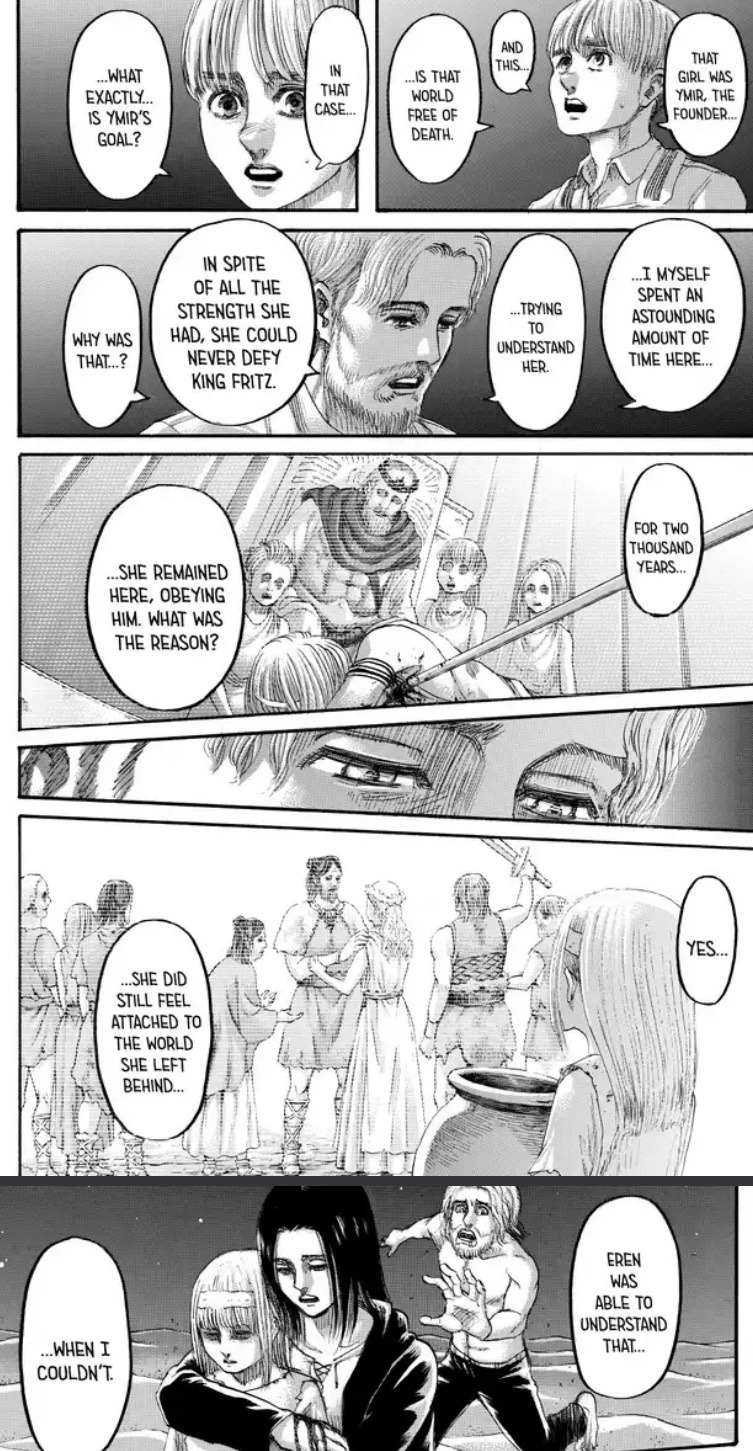
Look at Eren’s words to Ymir in this moment, several chapters earlier:
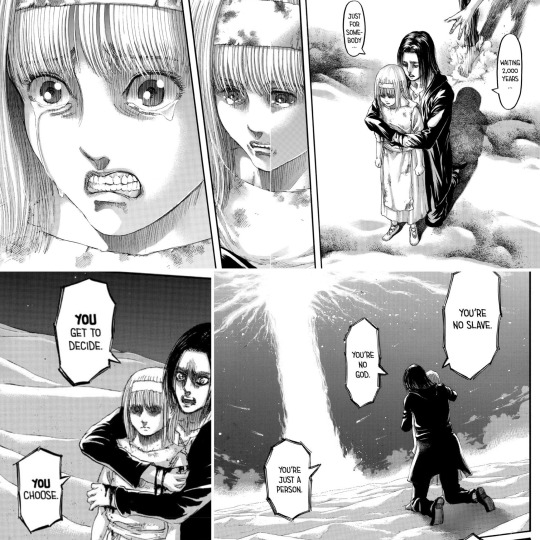
All Ymir has ever wanted is to be held. To be loved like a person. To feel that connection because of who she is, not the role she fulfils.
Eren understands this, in contrast to Zeke, who once again tries to impose her role upon her:
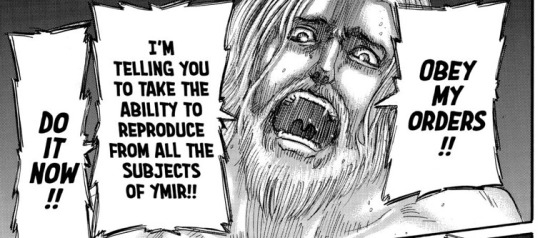
Ymir has been hanging around in paths all this time, unable to fully die and let her consciousness pass on to the next world, because she needs to find this thing that she’s been searching for since the start of the story.
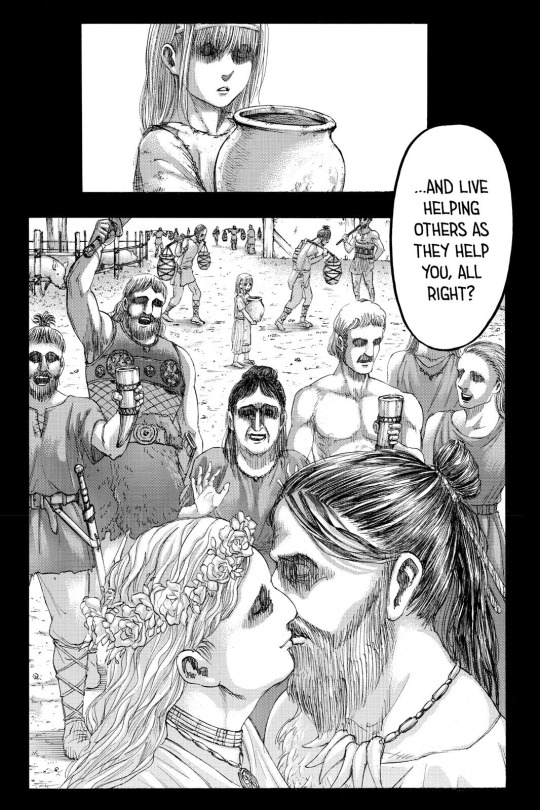
It’s not just about romantic love. It’s about connection. That sense of being understood and belonging with someone else, whether that be romantically, platonically, as family ... we keep seeing the same theme brought up throughout the entire manga.
Who else is a character that constantly searches for the same thing? Mikasa.
She has so many parallels and yet also opposites with Ymir. Ymir is told she is a slave, she obeys the king, that is her role. And she accepts it. Because she believes that it’s the only way to find happiness; to find this belonging she’s been craving. However, unlike Ymir, who does not truly love the king, I believe that Mikasa does truly love Eren - what form that takes doesn’t necessarily matter to me at this point. It’s just about connection.
Whether Eren feels the same, tragically for him, doesn’t matter. Because Eren knows he is destined to be the one to end the cycle of hatred and free Ymir. And that will ultimately cost him his life. That is why, when Zeke asks him what he will do about Mikas’s affections - which have nothing to do with her bloodline and everything to do with him - Eren cannot answer. That choice has sadly been taken from him.
When Eren asks Mikasa what she is to him, I think he genuinely wants to know at that point. I think he cares about her so deeply and wants to know she feels the same way, and it’s not just about him being ‘her saviour’. But as we’ve seen before, Eren cannot afford to stop for too long and dwell in the moment, because he must push on towards freedom - the freedom of Ymir and the Eldian people from the curse of the Titans.
This brings his conversation around the table with Armin, Mikasa and Gabi into a whole new light. Eren insults his friends in an attempt to push them away from him - because he knows he won’t be around to live that ‘long, happy life’ with them. So instead, he wants to push them to confront their feelings in the arms of others. He pushes Armin to really consider what Annie means to him, and for Mikasa, I believe that Eren intends her to perhaps look towards Jean, who is truly willing to give her the love she has always sought from Eren. Because again, so tragically, Eren will not be around to provide that for her - regardless of whether it’s something he wants or not. His own wishes no longer matter on the path he has been set upon.
Back to Ymir. Eren tells her, he will put an end to this world:
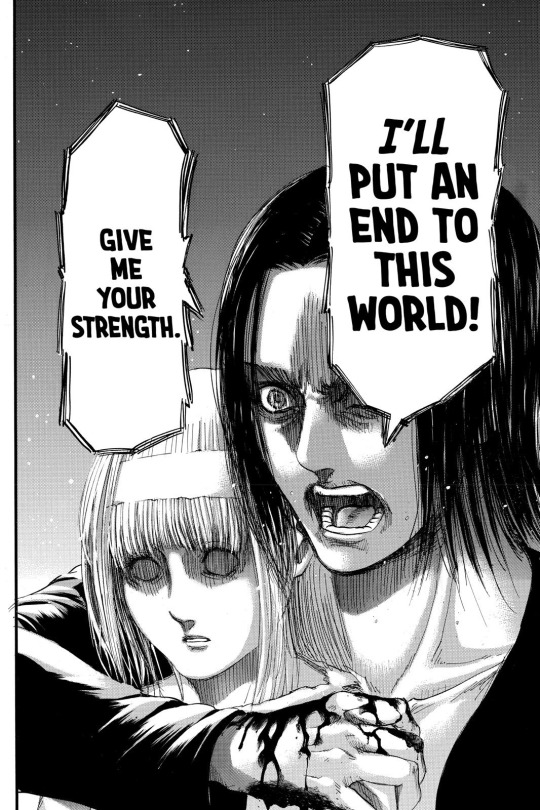
He doesn’t mean the human world; the living world. He means the world of paths, where Ymir is trapped, unable to let go of the souls of dead Eldians, because she’s still searching for that connection she craves so much. Her paths world is an attempt to quell that feeling of loneliness she’s been plagued with, but ironically, she’s more lonely than ever, stuck there, serving the bloodline she’s created from a place of misery and duty, rather than love.
The rumbling and the destruction of Marley is a very tragic consequence of what Eren has to do to put an end to the curse of the Titans. He’s searched for another way to no avail; we’ve seen his remorse when he apologises to Halil or Ramsey in chapter 131:
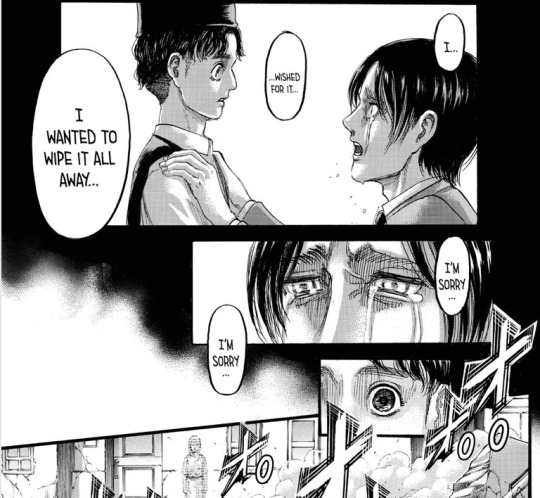
I think the anger and devastation that’s unleashed in the rumbling, is a result of the hurt and mistreatment both Eren and Ymir have felt at points in their lives.
Eren understands that to destroy the paths realm, first this devastation is necessary, because he’s seen it in his future memories, despite the conflicting feelings it’s evoked from him - he doesn’t really want to destroy humanity outside of the walls, but his own future is telling him that he must and he will. But it’s not Eren’s emotions that drive this initial destruction - it is Ymir’s. These emotions are no different in nature than the ones that Eren felt in response to Armin’s childhood bullies - that sense of unfairness and need to lash out at oppressors - but tragically, unlike Eren who in that moment of intense, irrational emotion had only his fists to vent and release, Ymir is in possession of one of the most terrible and destructive weapons there is - hordes of colossal Titans. And in that moment where Eren finally gives her that validation she has been searching for, and allows her that feeling of release from the duty she’s felt she needed to fulfil for thousands of years, Ymir releases that frustration and anger too and sends them walking.
This theme of the oppressor and oppressed switching places in an endless cycle of revenge and stealing from others what has been stolen from you is a theme that we see repeated throughout not only the AOT manga, but also soundtrack and additional content too.
Eren was right that it would be Armin that saves humanity - because Armin is the one that makes the connection in paths - he understands what is being shown to him with the leaf - and tragically, it actually highlights how, even up until the very end, Eren and Armin knew each other very well. Eren trusted Armin to make sense of what he’s had to do - even if it’s only Ymir that he understands, because while Eren is the one to give Ymir her freedom and unleash this terrible devastation, Armin is the one who must stop it.
But how does this idea of family and connection tie in to the rest of the events in the chapter, and wider manga, and what’s up with Historia’s pregnancy? And how is paths going to be destroyed, if the rumbling has been stopped and Ymir is free, but the Titans are still around?
This is where the rest of our cast fit in - namely Zeke, Levi, Historia and Reiner. If my theory is correct.
Eren gave Ymir the validation she needed and that sense of connection, freeing her from her role, and this bought that final bit of time needed for Historia to give birth to her child. Why is Historia’s child important? Because it is the ‘new dawn’ we’ve seen foreshadowed repeatedly throughout the series. The birth of a new history. And this comes in the form of a new bloodline, no longer infected with ‘parasite’ of the founding Titan.
Unlike Ymir’s bloodline, which stemmed from a place of duty and slavery - as she was ordered by the king to take ‘his seed’, and carried the parasite of the creature that bound to her within the depths of the tree, creating the paths realm and an almost purgatory type space free of death or heaven or earth or anything, Historia’s bloodline will be ‘cleaned’ because of the genes of the child’s father. And not only this, it will be born out of a moment of love and connection, rather than duty. This new combination will make it impossible for a child of the royal bloodline to become a Titan. There will be no coordinate - no link for Ymir from her paths realm to the living world, because the last link to her bloodline - a Titan with royal blood - will no longer exist.
This really brings home the gravity of the moment where Levi cuts Zeke down - he’s the last of the royal Titans, but the reader knows Historia’s baby is about to be born - will they inherit the Titan, and the cycle will re-start?
They will not. The cycle will be broken with them, because - and here’s where it gets wild - Historia’s child is not a Fritz, or a Reiss - they are an Ackerman. They physically cannot turn.
Why does all this fit in symbolically? Let me draw your attention to the genre of Seikaikei.
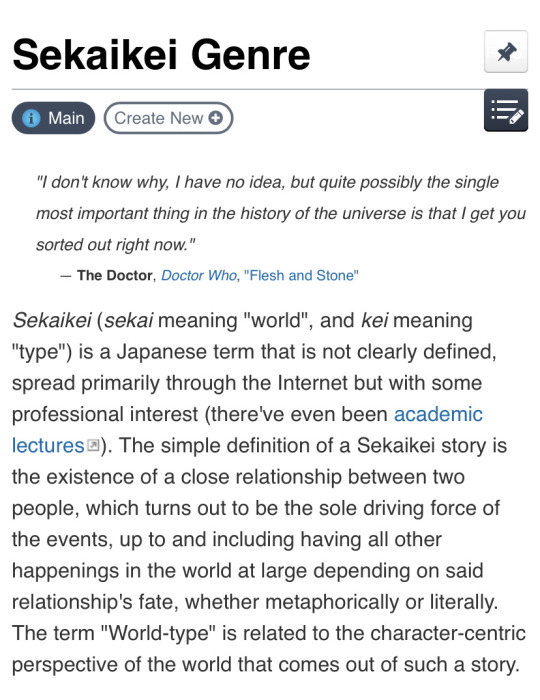
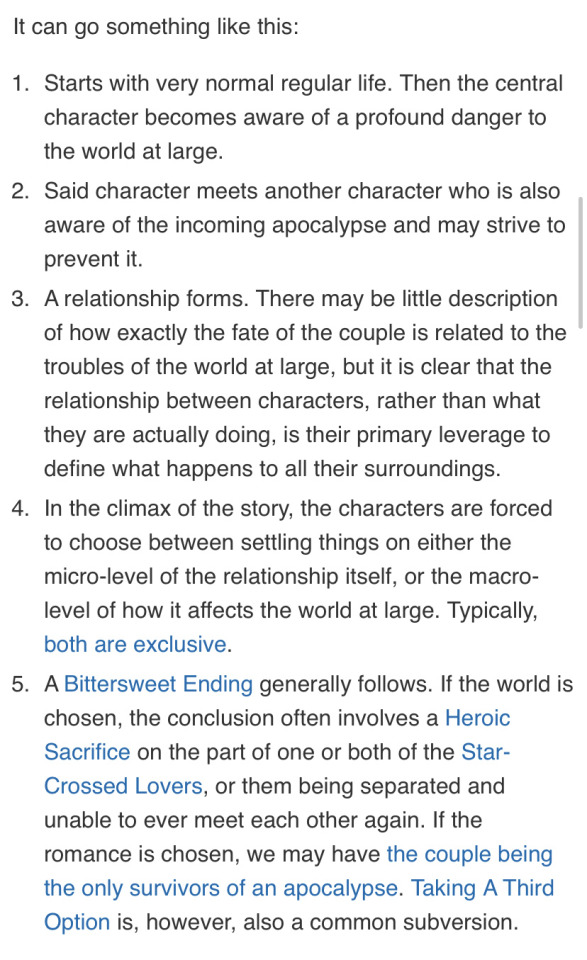
Attack on Titan uses this idea with our two Ackermans.
We have both endings. Eren and Mikasa, our bittersweet ending, where Eren ultimately chooses the fate of humanity over his relationships with Mikasa and Armin, and Levi, who, in a moment of selfishness, allows himself to put aside his role for a night - probably at the railroad banquet, where he was supposed to be making sure the likes of Eren and Yelena were kept apart - and indulges in this connection that he’s formed with Historia. You can read my 10 reasons post if you want to for why the heck I would think these two would form a deep bond - it’s all there in the Uprising Arc. They have been the same as Ymir - yearning for a sense of love and connection, but bound by roles neither of them asked for or particularly wanted - reluctant heroes comes to mind. Remember how freckled Ymir’s parting wish was for Historia to live for herself?
The result is an accidental pregnancy which, ironically enough, is what is going to annihilate the curse of the Titans and save the world. How poetic that the Titans will not be ‘driven out’ by hate, violence, and destruction, but instead by love, connection and new life.
Remember Kenny and Uri’s miracle?
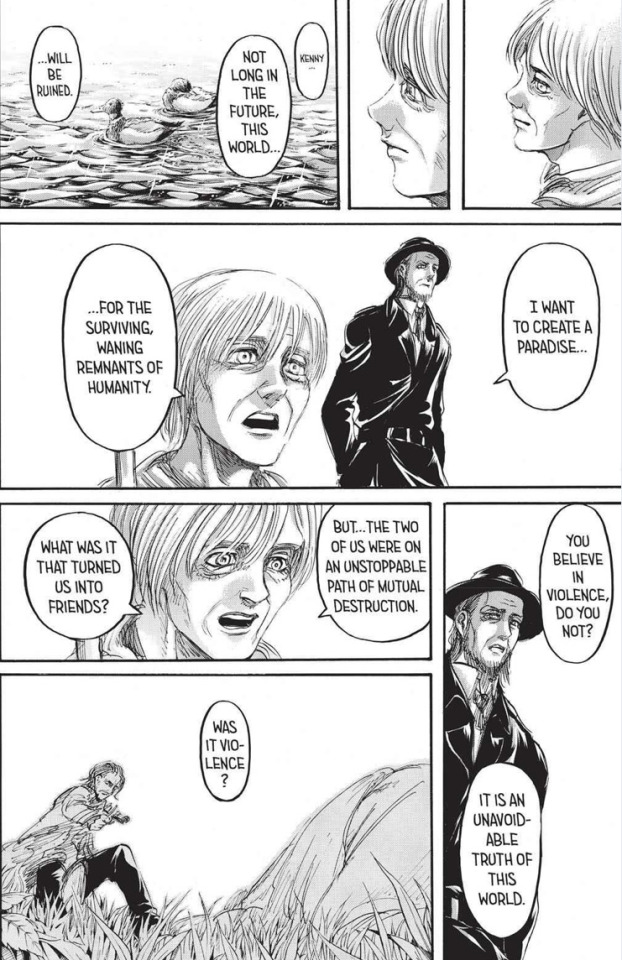
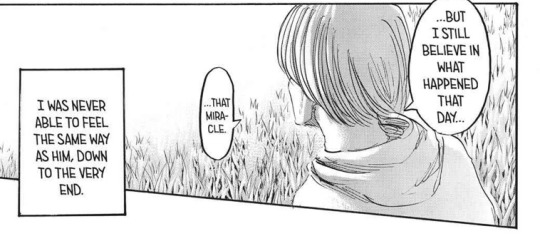
Kenny and Uri’s chapter, ‘Friends’, was exactly halfway back into the manga. History moves in repeating cycles in AOT, and we see things change slightly each time, on this journey to freedom. At this point, the Ackermans and royals were one step away from where they needed to get to in order to build this paradise - and Levi and Historia complete the cycle by becoming ‘lovers,’ tragically, the thing that Eren and Mikasa could not become, because Eren had to undertake the rumbling and be the one to free Ymir from her sorrow and loneliness. She can make the choice now - will she fight to be reborn as Historia’s child - fight for dominance with the Ackerman bloodline - or will she concede, finally laid to rest because the cycle has been broken by two people that love one another, just like the couple Ymir saw long ago and wished for.
Remember how Eren asked Zeke whether the ackermans act the way they do from a place of duty or genuine feelings? He needed to check it was the real deal that would break the curse, and finally lay Ymir to rest peacefully, after 2,000 years of hatred and searching. She will see that her descendant, Historia, finally has what she always dreamed of. That idea of dreams pushing us onwards - Ymir’s dream is realised through Historia and Levi.
As for the parasite itself? I believe Reiner will be the one to lock it in a Crystal prison with himself, deep underground.
A new dawn will come, and a new world will be built from the ashes of the old.
#snk#shingeki no kyojin#attack on titan#eren jaeger#levi ackerman#armin alert#ymir the founder#historia reiss#mikasa ackerman
194 notes
·
View notes
Text
Wizards Hearts Recs: Soulmates
Wizards Hearts was a four-month-long Drarry reading fest. Players were given a playing deck of 52 tropes, and were asked to find 52 different fics to read and comment on to fill their decks. To prevent the same few fics from being read, fics were restricted to only being used for the game three times before being considered ineligible for further points. The tropes and submissions list can be found here.
Check out the masterlist of fics for this trope below the cut!

📜 survival is a talent by ShanaStoryteller
Rated: Teen and Up
Words: 367490
Tags: Soulmate AU, Indian Harry Potter, Black Hermione Granger, canon? i don't know her, Slow Build, Lucius Malfoy is a bad person but a good father, Parselmouth Harry Potter, Smart Draco Malfoy, I'm offended that's a tag OF COURSE he's smart, sometimes bad things happen, but this fic isn't out to hurt you, Secret Relationship, Slytherins and Gryffindors being reluctant friends, Plotty, suprising lack of focus on soulmates for a soulmate au
Summary: In the middle of their second year, Draco and Harry discover they're soulmates and do their best to keep it a secret from everyone.
Their best isn't perfect.
~
“Are you trying to get killed, Potter?” Malfoy drawls, stalking forward. Quick as a serpent himself, he reaches out and grabs the snake just below the head. It thrashes in his grip, but is no longer able to bite anyone. “This is a poisonous snake, and I doubt anyone brought a bezoar with them.”
Harry glares. He opens his mouth, and feels the beginning the snake’s language pass his lips, and this isn’t what he wants, what’s the point of insulting Malfoy if he can’t understand him –
Malfoy’s eyes widen. He slaps his hand over Harry’s mouth, “Potter, what the hell–”
❤️ Read on AO3
📜 Vortex by xanthippe74
Rated: Teen and Up
Words: 20625
Tags: Alternate Universe - Soulmates, Soulmate-Identifying Marks, POV Draco Malfoy, Down and Out Draco Malfoy, Azkaban, Knockturn Alley, Redemption, Poverty, Angst with a Happy Ending, Auror Harry Potter, brief mention of past suicide attempt, brief mention of past self-harm, Past medical abuse (over-prescription of Calming Draught), Non-graphic off-screen injury
Summary: “Don’t worry, my dearest one,” Draco’s mother told him when he confided his worries to her. When he was old enough to feel the pangs of adolescent longing, but still too young to sense the storm gathering around them. “Magic will overcome any distance or obstacles to bring two soulmates together when the time is right. Circumstances will arise that steer them in the right direction; strange coincidences will make their paths cross again and again. Then the most wondrous moment arrives, when you both realize that your soulmate, your perfect match, stands before you, and from that day forward your hearts will be one.”
Ten years after that conversation, the idea of perfectly-matched soulmates feels more like a curse than a blessing to Draco. Who would want a soulmate who was a schoolyard bully, a Death Eater, and a convicted felon? Certainly not Harry Potter. And Draco is determined to take this secret to the grave.
❤️ Read on AO3
📜 Tie My Heart to Yours by Craftybadger1234
Rated: Mature
Words: 36661
Tags: Rape/Non-conHogwarts Eighth Year, Potions, Red String of Fate, Soulmates, Depression, Past Rape/Non-con, Past Child Abuse, Angst, Getting to Know Each Other, Mild Sexual Content, Mildly Dubious Consent, Fluff, Bisexual Draco Malfoy, Happy Ending
Summary: For fun, Slughorn has the eighth year students brew a potion to reveal their Red Strings of Fate. Harry doesn't know what to think about being tied to Draco. Or how to make a relationship work between them.
❤️ Read on AO3
📜 Highly (in)Compatible by daisymondays
Rated: Teen and Up
Words: 36828
Tags: Soulmates, Soulmate-Identifying Marks, Romance, Draco Malfoy in the Muggle World, Post-Hogwarts, Denial of Feelings, anxiety mention, References to Depression, Panic Attacks, Forced Dating, Enthusiastic Consent, POV Draco Malfoy, Humor, Magical Theory, Soulmate Theory, HP: EWE, Getting Together, Getting to Know Each Other, Forced Proximity
Summary: Draco’s been shagging The Prat Who Lived on and off for a few months when his soul mark starts to change. Draco’s had to accept a lot of adjustments to his life, but accepting that Harry Potter could be his soulmate is one step too far. It can’t be true? Can it?
❤️ Read on AO3
📜 A Tale of Woo by Veritas03
Rated: Mature
Words: 25330
Tags: N/A
Summary: Harry’s a bit of a mess, despite a successful Quidditch career. Draco’s not too much of a mess, but believes his life is as good as it’s likely to get. Both want something more. Fate is going to help them out with that.
❤️ Read on AO3
📜 With You, Always by acupforslytherin
Rated: Mature
Words: 14542
Tags: Alternate Universe - Soulmates, Hogwarts Era, Hogwarts Eighth Year, Fluff and Angst, Hurt/Comfort, Non-Explicit Sex, Dreams, Lullabies, Minor Hermione Granger/Ron Weasley, hearing, TasteofSmut 2020
Summary: All his life, Harry repeatedly hears one same calming tune in his dreams. No one seems to recognize the mysterious song, until one day, Harry catches Malfoy humming it when he thinks he's alone.
❤️ Read on AO3
📜 Not By Duty Are We Bound by Dreaming_of_a_Bright_Sky
Rated: Teen and Up
Words: 17176
Tags: Graphic Depictions of ViolenceAU, Soul Bond, Hurt/Comfort
Summary: Draco Malfoy has saved Harry's life so many times that it's joked about (and even bet upon) by the Aurors Harry works with. When Harry finds out how and why, it forces him to see a reality that he'd been blinding himself too.
❤️ Read on AO3
📜 All Our New Years by Frayach
Rated: Mature
Words: 2525
Tags: New Year's Eve, Soulmates, Minor Character Death
Summary: It takes too many New Year's Eves without each other but eventually they get it right.
❤️ Read on AO3
📜 Changing Tides by carpemermaid
Rated: Explicit
Words: 109687
Tags: Bisexual Harry Potter, Alternate Universe - Canon Divergence, Post-Traumatic Stress Disorder - PTSD, Slow Burn, Enemies to Friends to Lovers, Dumbledore's Army, Hogwarts Eighth Year, Auror Harry Potter, Auror Partners, Auror Draco Malfoy, Minor Hermione Granger/Ron Weasley, Patronus, Gardens & Gardening, Cultural References, POV Draco Malfoy, Hogwarts Fifth Year, POV Alternating, POV Harry Potter, Wandless Magic, Coming of Age, Mutual Pining, War AU, Romance, Falling In Love, Humor, Unresolved Sexual Tension, Healing, Post-War, Ministry of Magic, Minor Luna Lovegood/Ginny Weasley, Soulmates, Community: hd_erised, Sexual Fantasy, Wet Dream, Snogging, Frottage, Blow Jobs, Anal Fingering, Masturbation, Mutual Masturbation, Non-Penetrative Sex, Emotional Sex, Hand Jobs, Professor Harry Potter, Person of Color Harry Potter
Summary: Draco has spent half of his life spouting the things his father has taught him without much thought about how he feels about what he says. When he unexpectedly comes face to face with the Dark Lord, he grapples with the harsh realities of the world and struggles with his changing views on life. Instead of doing what’s expected of him fifth year, he joins Dumbledore’s Army and learns how to defend himself, how to make his own choices, and how he can be something greater than his father’s example as he grows into his own man rather than his father’s shadow. The choices he makes change both his and Harry’s fates, intertwining their paths until they converge.
❤️ Read on AO3
📜 Everything a Word Can Mean by OTPshipper98
Rated: Teen and Up
Words: 2355
Tags: Soulmate-Identifying Marks, Soulmates, Alternate Universe - Soulmates, Sectumsempra Scars, Pre-Hogwarts, Hogwarts Era, Post-Hogwarts, Foot Massage, Nicknames, Cuddles, Happy Ending, Drunken Confessions, Getting Together
Summary: In a world where magical people are born with the nickname their soulmate will call them by tattooed on their skin... what does it mean that the word on Harry's chest is the thing he hates to be called the most?
❤️ Read on AO3
📜 Danse Russe by Frayach
Rated: Explicit
Words: 140119
Tags: Novella, Soulmates, Angst, HP: EWE, Explicit Sexual Content, World Travel, not a wip
Summary: True Love. Soul Mates. They're just words until put to the test. Harry and Draco have a bond that was forged in the hell of the post-war years and pulled them both back from an abyss of nihilism and self-destruction. Nothing can break it, or so they believed. But True Love can demand sacrifices too great to bear and deeds too terrible to justify.
❤️ Read on AO3
📜 A breath worth of life by Explicit
Rated: Explicit
Words: 39791
Tags: H/D Hurt!Fest 2020, Soulmates, Terminal Illnesses, Death, Preparing for Death, Minor Character Death, Grief/Mourning, breaking up, Loneliness, Depression, Self-Hatred, Unhealthy Coping Mechanisms, Suicidal Thoughts, Heavy Drinking, Therapy, Grief counselling, Vomit, Hospitals, Cruise, Pirates, Treasure hunts, parenting, blended families - Freeform, It Takes a Village to Raise a Child, Magic Theory, Healer Hermione Granger, Cursebreaker Draco Malfoy, Auror Harry Potter, Accidental Bonding, love is the most powerful magic, Breathplay, Domesticity, Weddings, proposal, vactioning, hermione deserves all the awards, Kópakonan saves the day, Italians do it better, Angst, Angst with a Happy Ending, Draco is father of the year, Ron is father of the year, Harry is not even in the competition, PoC Harry, POC Hermione, Long-Haired Draco Malfoy, long-haired Harry Potter, Short-haired Draco, Short-haired Harry, questionable medical ethics get handwaved here for the sake of fun, close encounters with ponies puffins sheep and other assorted fauna, Trans Luna Lovegood, Casual Sex
Summary: ‘...that moment when everything clicks into place, when the circumstances are right, your magic aligns, and you touch your soulmate. You'll know then, Draco, my darling.’ His mother used to look at his father with such devotion then. ‘It will feel like breathing fresh air for the first time, you'll know you'd been living on borrowed time until then but no more. There is an entire lifetime in that one breath.’
Finding your soulmate is the one way a wix can hope to live past thirty, but if he can’t have that with Astoria, Draco is ready to check out, let his magic eat him up and be done.
Harry, on the other hand, isn’t about to leave any stone unturned or path unbeaten until he finds the one person meant for him before that fated birthday rolls around. After every failed attempt he grows more and more convinced that whatever Voldemort did to him might have made him unlovable, but he will go down fighting if he has to.
Hermione still thinks the whole thing is cancer but what does she know?
❤️ Read on AO3
📜 Today, Forever by PalenDrome (nerdherderette), PotterArt
Rated: Explicit
Words: 60958
Tags: Explicit Sexual Content, Explicit Language, Voyeurism, Frottage, Masturbation, Oral Sex, Rimming, Anal Sex, Auror Harry Potter, Veela Draco Malfoy, Winged Draco Malfoy, Veela Mates, Bonding, Soulmates, Enemies to Lovers, Mutual Pining, Angst with a Happy Ending, Draco Malfoy/OMC (brief), Past Harry Potter/Ginny Weasley, Case Fic, Minor Violence, Minor Character Death, Magical Theory, Magical Biology, Muggle and Wizarding Technology, Digital Art, Embedded Images, Harry/Draco Big Bang 2018, Community: harrydracobang
Summary: As if his recent divorce and sleepless nights weren’t bad enough, a rash of escalating crimes against purebloods forces Harry and his team of Aurors to protect the riskiest target in all of Wizarding Britain.
Of course, Draco Malfoy would still be ridiculously infuriating and impossibly gorgeous.
As well as a Veela.
Who happens to be Harry’s mate.
❤️ Read on AO3
📜 Dragon Heartstrings by JET_Playin
Rated: Explicit
Words: 23825
Tags: Soulmates, Red String of Fate, Explicit Sexual Content, HP: EWE, Hogwarts Eighth Year, Angst, Fluff, Romance, Implied Relationships, Top Harry, Bottom Draco, Falling In Love, Enemies to Friends to Lovers, Tall!Harry, Misunderstandings, Oblivious Harry, Oblivious Draco Malfoy, Hurt/Comfort, Angst with a Happy Ending
Summary: Draco has seen the strings for almost as long as he can remember, but they don't mean anything. Anything at all....
❤️ Read on AO3
📜 Love and Paranoia by sunnyeclipses
Rated: Explicit
Words: 48547
Tags: Post-Hogwarts, Harry Potter Epilogue What Epilogue | EWE, Drug Abuse, Drug Addiction, Addiction recovery, Near Death Experiences, Overdosing, Relapsing, Drinking, Partying, Drunkenness, Unhealthy Coping Mechanisms, wall punching, Concern Over Someone Else's Weight, Soulmates, Angst, Angst with a Happy Ending, Hurt/Comfort, Caretaking, Pining, Falling In Love, Slow Burn, Explicit Sexual Content, Self-Esteem Issues, Auror Harry Potter, Down and Out Draco Malfoy, Domestic, Minor Hermione Granger/Ron Weasley, Minor Ginny Weasley/Blaise Zabini, Minor Theodore Nott/Pansy Parkinson, Minor Neville Longbottom/Luna Lovegood, Hurtful Comments About Drug Use, Brief suicide ideation, Christmas, Pets, Sharing a Bed, Weddings, supportive friends, Forced Proximity, classic literature, H/D Erised 2020
Summary: When Harry finds out his soulmate is none other than Draco Malfoy, he genuinely expects his life to go to shit. It doesn't help that Draco is an addict, coasting on reality-altering highs to feel something happy, something pure just once more before the comedown. What Harry doesn't expect is to care so much that it tears him apart at the seams.
A story about love, drugs, and getting better.
❤️ Read on AO3
📜 Every Me and Every You by bixgirl1
Rated: Explicit
Words: 69300
Tags: Forced Proximity, bed sharing, Legilimency, Veritaserum, Snark, Magical Theory, Tropes (please read author's note!), EWE, Falling In Love, Frotting, Mutual Masturbation, Rimming, magical sex, Really just all the sex, Gift Fic, UST, RST, Soulmates
Summary: Harry liked his life just fine, thankyouverymuch — so it was bad enough when a sly fairy cursed him to leap into alternate realities. But seeing Malfoy in all of them? Definitely way too much. And worse yet: needing the bastard's help to figure out how to get out of of it.
It was a disaster waiting to happen, really.
Well... probably.
❤️ Read on AO3
📜 you've got the antidote for me by Kandakicksass
Rated: Mature
Words: 20730
Tags: Alternate Universe - Soulmates, Soul Bond, Red String of Fate, Heavy Angst, Terminal Illnesses, Major Illness, Angst with a Happy Ending
Summary: When Harry Potter unintentionally severs their soulbond before it can fully form, Draco Malfoy resigns himself to a slow death and decides not to burden Harry with a soulmate he's made it very clear he doesn't want.
He's never been selfless before, but for Harry, he can try.
❤️ Read on AO3
47 notes
·
View notes
Text
The Joker Tropes Part 2
Taken From Here and here
Nether Realm Studios especially seems to love making Joker out to be evil incarnate. In Injustice: Gods Among Us and its sequel, he loses all his cred (and life) once he nukes Metropolis; Harley ditches him entirely, Batman just completely gives up on indulging him any more, even Guest Fighters like Hellboy consider him worthless, and non-Batvillains such as Grodd and Brainiac and even Darkseid loathe him for either Metropolis, or just in general principle. Mortal Kombat 11 shows that even the MK cast see him as a scourge upon the realms, and also express distaste toward him for either his nuking, a previous outing, or because he's seen as a buffoon who cannot be taken seriously (this is usually the case for other villain characters).
About the only person who can tolerate him for long is Lex Luthor, only because they both have the same level of hatred for their respective enemies. Even then, Luthor prefers to keep his distance from the Joker, if only because a bored Joker screws with everything For the Evulz.
In the animated series, he claims to have been beaten as a child when interviewed by Harley Quinn. It is unknown if this is true. According to Batman, he's simply making it up.
In one issue of New 52, he claims to have been driven insane by an abusive grandmother, who also bleached his skin to its present pallor.
In the same continuity, he is one to a baby gorilla he adopts, trains up as a gun-wielding henchman, and ultimately gets killed off for laughs.
In the comic book adaptation of Injustice, it's implied Harley fears Joker would be one, and gives their daughter to her sister, lest he kill the child. It's left ambiguous whether the Joker's even aware of the ruse.
Averted in one story, wherein one of Arkham's doctors realizes Joker's faking insanity just to piss off Batman as revenge for his disfigurement. Another doctor finds the report and excitedly reveals it to the current head doctor, only to learn that the Joker left it for everyone to read, since the paper's written by Harley Quinn, and therefore worthless as evidence.
In Batman: The Man Who Laughs, it's established that the name "The Joker" was given to him by the media, and he liked it so much that he decided to call himself that.
The same happens in Joker (2019), where Murray tells the audience to "look at this joker" when talking about Arthur. Arthur took it to heart.
Batman: Arkham Knight takes this even further by revealing that being forgotten is the only thing the Joker truly fears.
Just to demonstrate how much disregard he has for his henchmen, a reoccurring motivation for offing his own lackeys is failing to laugh at one of his jokes. Or laughing too late. Or laughing for too long. Or laughing at the wrong joke. He's... unpredictable.
The Joker loves it when people laugh with him, whether genuine or not, but if someone laughs at him, they're most likely already dead.
Joker loves attention and being above the normals, so never imply that he's not interesting or unique. Terry exploits this flaw in Batman Beyond: Return of the Joker just to drive him to a Villainous Breakdown.
The Batman Who Laughs. Since the character's first appearance in Dark Nights: Metal, the mere mention of him is enough to put The Joker in an uncharacteristically un-jolly mood and is a good way to get on his bad side. In fact, the dislike of this twisted version of his archnemesis is so great, that when Lex Luthor and The Legion of Doom started cooperating with him against Joker's protests, he quit the legion (after non-lethally jokerizing every other member of it) in disgust.
If you're going to hurt Batman, do it right. One of the supplementary stories for Joker War had him beyond furious with Bane - to the point of promising him he'd kill him in a way he would never see coming - for showing so little imagination in killing Alfred in City of Bane without even letting Batman listen to it to torture him. By his reckoning, if you have a great gag to break the Bat, use it to break the Bat - don't blow it by having Robin be the only one to witness it.
Originally Conrad Veidt from The Man Who Laughs.
Later portrayals base themselves on his actors, with Cesar Romero a popular candidate, and after Jack Nicholson came in, artists such as Alex Ross base him on him, such as the actor's distinct widow's peak and slicked back hair.
During Knightfall he and Scarecrow killed several members of a SWAT team, and one of his last actions in Batman: No Man's Land was to kill Commissioner Gordon's second wife, Lt. Sarah Essen.
One of the alternate realities seen in Zero Hour! was one where he killed Commissioner Gordon instead of crippling Barbara.
Part of the reason Gordon takes over the post of Commissioner in both The Dark Knight Trilogy and Batman: Arkham Series is due to the Joker killing Gillian Loeb. Additionally, the first game in the latter series, Asylum, he sees several of Arkham's guards killed by him and his men.
He's holding a dead cop's corpse in his intro in Injustice: Gods Among Us and using it as a puppet. He also talks to the body of one of the Regime enforcers who captured him once he breaks out and heads to Gotham.
Whether he was driven insane or was already insane and became completely bonkers.
Where he is on the spectrum between "wacky prankster" and "utterly depraved and sadistic sociopath and murderer".
Whether he is a senseless, performative terrorist wreaking havoc for kicks or a deceptively cunning and competent criminal mastermind. Or both. Usually both.
He's no Batman, but sometimes he is a proficient hand-to-hand combatant, Knife Nut or marksman, and other times a flimsy wimp who goes down in one punch. In some of the grittier settings, his raw strength, numbness to pain and viciousness are enough to level the playing field with Batman.
Whether he actually loves Harley Quinn varies. In the animated series, (where Harley first appeared) the writers haveoutright said he's a sociopath incapable of loving anyone, and just sees her as a useful mook. Some other works imply he really does love her on some level (although he's usually still an abusive asshole.)
He can either be Faux Affably Evil, Laughably Evil, just a Monster Clown, or some combination of the three.
At least one such incident implied he would be interested in Batman... but only after he was dead. Again this may only have been a tactic to get under Batman's skin or truthful admission. The readers will never know for certain.
His plot in The Killing Joke is to put Jim Gordon through the wringer hard in the hopes of driving him mad. He'll also try to drive Batman over the edge (particularly, drive him to break his "no killing" rule), sometimes by cutting off all of Batsy's human connections.
The Dark Knight reworks it into Driving Gotham To Senseless Violence with wanton acts of destruction or terrorism, just to prove everyone's as bad as him deep down.
Ironically, a 1952 story has the Joker get himself falsely committed to an insane asylum, to question a patient who knew the location of a cache of money. The end of the story has him Laughing Mad due to a prank Batman used to disguise his identity.
He didn't have his signature laugh. This seems to have been a way to "goofy up" the character to make him less terrifying in the days of the Comics Code Authority. Later on, he'd learn to giggle while remaining terrifying.
He actually committed crimes for moneynote , and wasn't really interested in causing chaos or terror for a joke's sake.
Building off of that, his plans weren't really "insane" until the Silver Age (at which point it's not even fair to say this was exclusive to him), nor was there any question of the character's mental stability.
His obsession with Batman wasn't there, much less the idea that he would pass up chances to kill the Bat or learn his identity. This aspect was probably introduced to explain the Bond Villain Stupidity he (and every Batman villain) had become infamous for in the Silver Age.
His clown-like complexion was actually makeup in his early appearances. He even removed his makeup to disguise himself as a cop, which was referenced in The Dark Knight. It's later revealed that the look is permanent after falling in a vat of chemicals.
The Brave and the Bold #111 and #191 have him team up with Batman to clear his name after being framed for several murders. The first instance turned out to simply be a framing the guilty part occasion but the second instance was actually genuine on Joker's part (except the person Joker seemingly murdered turned out to be faking their death).
He also does this with Batman whenever The Batman Who Laughs is involved (specifically in the Dark Knights: Metal series).
He abruptly ends a partnership with Red Skull when his Nazi affiliation comes out. Red Skull simply wonders why he is so surprised when he thinks that the Joker would make a great Nazi. The Joker is NOT happy about this, proclaiming "I may be a criminal lunatic, but I'm an American criminal lunatic!" It even provides the trope's image. And yes, folks, even an equal-opportunity murderer like the Joker despises the Nazis!note
The exception is mentioned again in the Last Laugh arc where the Joker immediately refused to join the American Neo-Nazi Aryan Alliance group in the Slab after he was offered membership. Joker: I'm evil and all that, but you guys are just plain mean.
Will not harm dumb animals and doesn't condone it. There's no humor to be had in that. Higher primates apparently do not qualify but a lot more effort went into that one.
While in Arkham with villain Warren White, AKA the Great White Shark, Joker calls him the worst person he ever met. He states that while he may kill people, even he doesn't steal their kids' college funds.
Sees nothing funny about someone parking in a handicap spot when they're not handicapped. However, he does think it's hilarious to hurt them in ways that will make certain they'll always be able to park there.
A girl named Janey Bennett, whose class was studying criminal behavior, became pen pals with the Joker while he was in Arkham. When Janey revealed that her father, the mayor of Motor City, was abusing her (exactly how isn't specified, though it was implied to have been really bad) the Joker broke out and, convinced that the authorities would be of no help, tried to force the mayor into admitting to his crimes and giving him Janey (so that he could find a better home for her) by threatening to contaminate the city's blood supply, going through with it (because the ends justify the means) when the mayor refused to give in to his demands. He originally intended to give her to Batman as well so he could protect her but at the end decided to give her to her mom. Joker: I mean, stealing a city blind is something I can admire... but being mean to one's own daughter... that just makes my blood boil.
For a rather literal form of "standard", the Joker's team-up with Carnage in Spider-Man and Batman: Disordered Minds fell apart in part because the Joker, known for his love of theatrics, found Kasady's desire to get straight to killing boring. Conversely, Kasady didn't like the Joker's flair for theatrics.
The Joker absolutely loathes The Batman Who Laughs, to the point where he drops his usual joking demeanor and is deathly serious whenever directly referring to him, even willing to work together with Batman to face him when it comes down to it. When Lex Luthor goes behind his back to make a deal with The Batman Who Laughs (going against the only condition Joker has for joining his plan), Joker responds by Joker-gassing the Legion of Doom, putting Lex into a series of deathtraps, trashing Lex's Power Armor, and quitting the Legion. In the process, he tells Luthor how he had planned on ruining the Legion utterly on the verge of victory, and as nightmarish as his plan sounded, he claims it is nothing compared to what the Batman Who Laughs is going to do.
While he still gloated about it and found Commissioner Gordon kneecapping him funny after remember that he'd crippled Barbara, the actual act of killing Sarah Essen in the penultimate issue of Batman: No Man's Land is one of the few times the Joker wasn't happy with something he himself did, considering he's seen walking away while scowling afterward, leaves the babies he originally planned to murder unharmed and immediately turns himself in to the police.
Emperor Joker sees the Joker disgusted with a corrupted Jimmy O Lsen tormenting the Superfamily and Batman when they're turned int animals.
Later one he is disgusted when his minions vandalize the Moai on Eastern Island.
Again, when he rescues Lex from The Batman Who Laugh's infected minions in Hell Arisen, the mere mention of his alternate universe rival prompts him to have a very uncharacteristic Freak Out. The Joker: I told you. I told you not to deal with him. You should have shot that thing in the head the second you had it in a cage! It is wrong. It is a wrong thing.
Played more straight in his relationship with Punchline. Only time will tell if it lasts.
There’s also a comic storyline when Hush informed that a dirty cop Office Halmet killed his wife Jeannie. The Joker wanted nothing more than to kill said cop in revenge. Then there’s Batman: Three Jokers where, despite it being being heavily implied he was abusive, the “Comedian” Joker is seen setting up fake tea parties with dolls, clearly trying to substitute them for his wife and child showing that he does miss them and desire to be a family with them.
While The Dark Knight is one of the few times the Joker's clown-like appearance is the result of make-up, he does sport a Glasgow Grin.
While Joker still has the permanent clown look, it's combined with the Glasgow Grin.
While Batman: Endgame would see the skin of his face restored with a chemical called Dionesiumnote , at the start of The New 52, the Joker had the Dollmaker skin his face and then, after he recovered it, spent Death of the Family wearing it like a Leatherface-esque mask. And even in Endgame, his restored face ends up badly burned as the result of the finale battle between him and Batman, though it still ends up restored again.
Gotham sees neither Valeska escape this. After his death in season 2, Jerome (the proto-Joker) ends up resurrected in season 3, but because Dwight thinks his attempt to revive him failed, Dwight ends up cutting off Jerome's face ala Death of the Family and Jerome ends up stapling it on when he catches up with Dwight and while he later has it properly reattached, there's still scars from what happened. Jeremiah, Jerome's twin and the show's true Joker, ends up with the "perma-clown" appearance due to Jerome having the Scarecrow brew something up to spray in Jeremiah's face, but season 5 sees his fateful fall at Ace Chemicals badly scar his face and sear off most of his hair with only stringy patches left.
Averted entirely in Joker (2019), where his clown appearance is entirely makeup, and the worst it gets is painting his iconic smile on his face with his own blood from a car crash. Not even a Glasgow Grin or anything, the blood is from his hand and his face only has a few normal cuts on it.
While Batman is a rather serious character who refuses to kill anyone, The Joker is a rather comical character who revels in death.
Joker's gadgets tend to be rather goofier but much more lethal, such as the Joker Venom that he often uses to kill his victims.
While Batman gets along well with his sidekicks Robin and Batgirl, Joker frequently abuses his sidekick Harley Quinn and has tried to kill her before, not to mention all the times he has been a Bad Boss by killing his henchmen for any reason you can think of, sometimes for no reason at all.
While Batman's backstory is well known, even by the citizens of Gotham who know of the tragedy of the rich Waynes' in Crime Alley, no one knows anything about the Joker's backstory, but most versions he tells are consistent in two things: he was a nobody, and possibly someone poor.
In most adaptations, his voice is high-pitched in contrast to Batman's Badass Baritone.
Why he went by the name the Red Hood has changed over the years: The Killing Joke claims he was a failed comedian driven to crime to support his pregnant wife. The trauma of his disfigurement from jumping in the acid and his wife's earlier accidental death drove him insane. However, even this backstory is questionable, as the Joker himself calls it "multiple choice".
In Injustice 2, an intro with Atrocitus has the Red Lantern wondering what drove the Joker to nihilism.
In the animated series, he claims to have been abused as a child when interviewed by Harley, but according to Batman, it's just another ruse to escape Arkham.
The purple suit and matching pants with either an orange and/or green shirt with a bowtie or tie, remains the definitive Joker look one that many artists and costume designers have given spin on. He is sometimes known for wearing a cool hat but other times goes hatless. Heath Ledger's custom-designed purple long-coat, trousers, blue shirt and green Waistcoat of Style with a tie has likewise become iconic and famous for its contemporary and downright stylish update on the classic look.
The original Red Hood outfit which is a black suit, white shirt, bowtie with an opera cap and a bizarre red dome is also quite famous.
The Hawaiian tourist outfit he wore in the notorious scene in The Killing Joke.
The white suit he wears in Miller's The Dark Knight Returns as well as the white nurse maid outfit with red wig in The Dark Knight is also quite notable.
The Future Joker look from Batman Beyond: Return of the Joker which went with a mime look (black body suit, slicked-back hair) is also quite distinct and unique.
The first issue of Batman with Joker's debut has him described as having "burning, hate-filled eyes" and the moniker, "the harliquin of hate".
The Man Who Laughs had Bruce dosed with a light version of the Joker Venom and he felt his perspective shift into a paranoid vengeance were he felt everyone deserved to be punished for his parent's death just for existing.
Death of the Family had Batman describe how Joker's irises are always narrow when looking at anyone but Batman and that it is usually an indication of negative feelings toward something with Bruce mentioning that his eye are the eyes of someone who hates everything he sees.
In the Justice League storyline "Rock of Ages", Martian Manhunter has to put in incredible effort to reorganize Joker's mind long enough for him to give up the cataclysmic Philosopher's Stone. The briefly sane Joker immediately says My God, What Have I Done? verbatim as he hands it back, before quickly losing his mind and going back to the laughing madman.
The famous example from the end of The Killing Joke, where Batman tries to convince him to allow Batman to rehabilitate him before their vendetta kills them. Joker considers it for a long, somber moment before quietly reflecting that they're both too far gone.
Batman: Cacophony ends with Joker being pumped full of an inhuman amount of antipsychotic drugs to keep him under control while in recovery from a near-fatal stabbing. Batman takes the opportunity to have a relatively-sane conversation with him, though it's somewhat subverted by Joker still being a homicidal sociopath even while heavily sedated.
He even gives multiple reasons on how he came Back from the Dead in Injustice 2 and will go along with whatever his opponent thinks is true, despite being Dead All Along in story mode and only appearing as a hallucination to his ex-moll.
Batman: The Dark Knight Returns sees him kill David Endochrine and Ruth Weisenheimer, who were clearly based on David Letterman and Dr. Ruth Westheimer.
During Knightfall, once he realizes that Azrael isn't Batman, his plan's gone to hell, and one too many criticisms from Gene Siskel and Roger Ebert stand-ins, he kills the stand-ins.
In one of the issues for the The Batman tie-in comic, The Batman Strikes, he terrorizes a stand-in for Conan O'Brien. This becomes darkly Hilarious in Hindsight as the real O'Brien voiced Endochrine in the animated version of Batman: The Dark Knight Returns. In the series proper, Harley's debut had the two of them terrorize a stand-in for Dr. Phil for the climax.
If you want to know how truly terrifying The Batman Who Laughs is, look no further than the way Joker acts whenever discussing him. He doesn't laugh, he doesn't smile. He becomes calm and serious and simply tells whomever he's talking to that the TBWL is "a wrong thing that shouldn't exist". Someone HAS to be scary if the very thought of him makes Joker act like a calm rational sane person.
In Batman Beyond: Return of the Joker, the clown has a massive Villainous Breakdown when Terry mocks him for his failed attempts to break Batman.
On the rare occasion Joker gets bored and leaves Gotham, expect everyone to think of him as just a silly clown, until the bodies start piling up.
One issue of the Robin Series had him talking about having Abusive Parents, only for a psychiatrist to tell him it's the seventh story he's told now.
Batman lampshades on this to Harley in the animated series, thinking it's another lie to gain sympathy.
The Killing Joke claims he was a failed comedian driven to crime to support his pregnant wife. The trauma of his disfigurement and his wife's earlier accidental death drove him mad. However, even this could be a lie, as he himself calls it "multiple choice".
It's even discussed in Injustice 2, as Atrocitus wonders what drove the Joker to nihilism. Despite only appearing as a hallucination to Harley in story mode, he spews out multiple theories for his Unexplained Recovery and will say Sure, Let's Go with That in non-canon fights. Was he resurrected by someone, or is he from another universe? Did he escape from either the Source Wall or the Phantom Zone, or is he just an apparition?
Shadow of the Bat #38, Tears of a Clown: He celebrates his anniversary of the day he was a still sane, but hapless comedian, and was thrown out of an exclusive Stand-Up Comedy club for an unfunny act the patrons mercilessly heckled. It was the last straw as he agreed to provide to his family by pulling a job for the Red Hood gang. So he kidnaps all the patrons and reenacts his act with control collars that will kill them when they laugh. Oddly enough, the patrons are hardcore Stand-Up Comedy fans, so they can't remember the number of times they've booed someone. However, even this origin story could be a lie.
It's come to be his primary disfigurement over the original skin bleaching.
In Batman Beyond: Return of the Joker, Terry McGinnis exploits this by delivering an epic Boring Insult so the clown will have a Villainous Breakdown.
King Barlowe proved to be a big one in his Thanatos Gambit in the episode "Joker's Millions" of The New Batman Adventures. In a spiteful Video Will, he gives the clown his millions, revealing in his tape that most of it was fake. Expecting the clown to splurge on it, he won't have enough to pay off the IRS, allowing Barlowe to get the "last laugh" after his death, without the Joker coming after him.
Alan Moore's "I go Loony" from The Killing Joke, an in-panel song-and-dance tune that was eventually made into an actual song belted out in Batman: The Killing Joke.
Batman: The Brave and the Bold has "Where's the Fun in That?" from the episode "Emperor Joker".
Batman: Arkham City ended with him covering The Platters' "Only You (and You Alone)", Batman: Arkham Origins had him cover Hank Williams' "Cold, Cold, Heart" and Batman: Arkham Knight had him provide an original composition, "Can't Stop Laughing".
Action Fashionista: This incarnation of the Joker has a wide variety of garish outfits for every occassion — most of them straight from the comics.
Adaptational Attractiveness: Metal teeth, lack of eyebrows, and tattoos aside, he's still being played by the youthful-looking real life Pretty Boy Jared Leto; especially since the last two cinematic Jokers were a creepy middle-aged gangster with a botched face-lift and a filthy, scarred vagrant (even the mentally unwell clown-for-hire doesn't scream Mr. Fanservice one bit). This version looks more like Marilyn Manson.
Adaptational Nice Guy: A very downplayed example. While he's otherwise the same Clown Prince of Crime we all know and love to hate, he appears to genuinely care for Harley, and even throws her out of a falling helicopter to save her life. Almost any other iteration of the Joker would do that to save his own skin or rid himself of her.
Adaptational Skimpiness: This version of the Joker tends to be shirtless a lot more than he has in any other medium. It mostly seems like an opportunity to show off his tattoos.
Adaptation Distillation: Leto's Joker seems to be less of the "evil philosopher" that Heath Ledger portrayed him as in The Dark Knight, and instead seems to be a cross between the garish, larger-than-life Mark Hamill version from the animated series and the Arkham games, and the creepy, deeply twisted Brian Azzarello version. David Ayer had also stated that he looked specifically to the Golden Age Joker for reference, providing reason for many to believe that Leto's Joker is a modern re-imagining of that incarnation.
Advertised Extra: Heavily featured in Suicide Squad promotional materials, barely appears in the film for more than seven minutes. According to Jared Leto, several of the scenes he shot were not included in the theatrical cut.
Ambiguous Disorder: In Suicide Squad, most of the time the Joker seems... not all there compared to Harley. In addition of psychopathic tendencies, the Joker has random bouts of maniacal laughter, confusion, and slurred speech-like patterns. All attributes that stem from punch-drunk syndrome. Considering he has faced Batman one too many times, it makes sense that the Joker's mental stability is finally catching up to him.
However, come Birds of Prey, they broke up, mirroring the comics where they do have an Relationship Revolving Door. It appears to stick, as Harley publicly calls it quits between the two of them.
His tattoos are very reminiscent of the Joker in All Star Batman and Robin.
Ax-Crazy: Like all the incarnations before him, calling him a violent psychopath is one of the biggest understatements you can make.
Bedlam House: Spent some time at Arkham Asylum, where he met Harley. Then he broke free from it with the help of both Harley and his gang.
Chewing the Scenery: An important part of the character is his theatricality.
Cool Car: A bright purple sports car with underglow lights and a "HAHAHA" license plate.
Dented Iron: It's subtle, but the numerous scars on his body and metal replacement teeth in his mouth are clear signs that his frequent run-ins with Batman are taking their toll.
Disney Death: He seemingly dies in the crash of his helicopter... only to come back to free Harley from her high security prison at the end of Suicide Squad.
The Dreaded: In true Joker fashion, everyone is terrified of him.
Establishing Character Moment: One that takes place before he even makes his official debut in the setting - he killed Robin (a minor) and vandalized his outfit to mock Batman over his inability to save him.
Even Evil Has Loved Ones: Insofar as much as the Joker can love anyone, anyway, but he does seem to genuinely care about Harley. Eventually, subverted.
Evil Has a Bad Sense of Humor: He considers the brutal murder of a minor as a joke he played on Batman. When he's torturing Harleen Quinzel, he promises not to shatter her well-kept teeth while flashing his own hideous metal dentures. When Harleen later has him at gunpoint, Joker just says "please don't kill me, I'll be ya friend" in a snarky tone.
Evil Is Hammy: It's not The Joker if he's not Chewing the Scenery. And, sure enough, he does.
Evil Is Petty: The graffiti on Robin's costume seems to imply that Joker murdered him just to prod at Batman. It is confirmed in Suicide Squad that Joker and Harley killed him.
Evil Laugh: It's kind of his thing. One notable example is when he chuckles while surrounded by an arsenal of weapons.
Fake Shemp: Indie rocker Johnny Goth stood in for Jared Leto in Birds of Prey, in the flashback where he and Harley torture and tattoo the big mafia thug Harley later bumps back into.
Foil: To Batman as usual, but with some new additions. After 20 years, Batman became more jaded and cruel, while the Joker somewhat mellowed out and his criminal activity became more professional. Batman didn't settle down until the death of Superman while the Joker grew attached to Harley Quinn.
In Suicide Squad Griggs' smug indifference about his gambling debt immediately becomes pure terror when he realizes the Joker has gotten involved.
He is so feared that even the likes of Black Mask would rather steer clear of him. Harley's enemies only start gunning for her in Birds of Prey when it's become clear that she's no longer with him.
G-Y
The Ghost:
There is an allusion to him in Batman v Superman: Dawn of Justice ("HA HA HA Joke's On You, Batman" painted across the chest of the dead Robin's empty suit in the Batcave), but he doesn't actually appear.
He gets mentioned a lot in Birds of Prey, but he's only seen very briefly in some flashbacks, always from the back (including footage from Suicide Squad). There is a whole Deleted Scene where he and Harley have a domestic dispute. Harley leaves the house through the window and the Joker throws her stuffed beaver out through the window. In the film proper, she's just kicked out of the house, with no shot of Mr. J.
Greater-Scope Villain: His role in Batman v Superman. Despite not actually appearing his murder of Robin by this point has driven Batman down a darker, more vengeful path that goes against Batman's traditional moral code; the one that the Joker is always trying to prove is wrong. Batman's rage towards Superman blinds him to the possibility of Lex Luthor being the real threat long enough for Superman to die fighting Doomsday. In a way the Joker's actions contributed to Batman's failure.
Guttural Growler: This Joker is noticeably more snarly than previous incarnations.
Handshake Refusal: He doesn't like to shake hands, as Monster T finds out.
Hell-Bent for Leather: Wears a purple crocodile skin duster at some point in the film.
Jerk with a Heart of Jerk: Despite being a homicidal sociopath, he seems to truly love his girlfriend Harley Quinn. Then in Birds Of Prey, he coldly and violently breaks up with her.
Joker Immunity: He appears to die when his helicopter is shot down about halfway through Suicide Squad. To absolutely no one's surprise, he shows up alive and well in the final scene. It helps that he's the Trope Namer.
Knife Nut: And by God, does he have enough blades.◊
Lean and Mean: This Joker, while muscular, is quite lean, especially compared to the heavily muscled Batman.
Love Epiphany: Well, "love" is pushing it, but Joker realizes his affections for Harley when she dives in the chemical bath that ultimately turned Joker into what he is. Symbolic in the sense she was agreeing to join him in madness. Further adding to the complexity of the scene; Joker was tying up a loose end, having used Harley to escape from Arkham. He lead her to her demise and intended to leave her for death but at the same moment realized she had entered his world and his madness. Joker never anticipated the amount of utter devotion Harley would have for him, something inside him just couldn't walk away from her, so he jumped in to save her.
Manipulative Bastard: He manipulated Harley into helping him escape Arkham because she fell in love with him. When she served her purpose, he would have had her kill herself jumping into a bath of chemicals to prove her feelings. He instead saves her from this demise because he has a Love Epiphany in the moment.
Monster Clown: Like the previous film versions, Joker is an Ax-Crazy criminal with clownish makeup. Green hair notwithsanding, his white makeup, red lipstick and absence of facial scars make him look closer to a mime than his predecessors.
Noble Demon: In Suicide Squad, his whole motivation is to rescue Harley Quinn. His commitment is so strong he doesn't even waste time with pranks or petty acts of cruelty. Everything he does is for someone else.
Only Known By His Nickname: He's only known as The Joker, or "J" / "Mr. J".
Outlaw Couple: He and Harley Quinn are lovers and partners in crime.
Sadist: Even though there was only a few select scenes of him, one of them is him torturing Harley. It's disturbingly obvious that he is positively gleeful over it. And he doesn't seem to have lost any sleep over murdering Robin, either.
Pet the Dog: David Ayer confirms that while he did push Harley out of the falling helicopter, his intent was in fact to save her life.
Satellite Love Interest: To Harley Quinn in Suicide Squad. His characterization revolves entirely around Harley, not even getting involved with the main plot.
Scary Teeth: Several of his teeth are made of metal. According to David Ayer, Batman punched his teeth out after he killed Robin, leading him to replace them with metal teeth.
Screw This, I'm Outta Here!: Although he has a presence at the start of the film, The Joker appears to have left Gotham City to be controlled by Black Mask in Birds of Prey, with Roman saying that Joker has already skipped town.
The Sociopath: He's chaotic and remorseless, much like his previous versions. Special mention goes to his murder of Robin, which he topped off by spray-painting a cruel taunt for Batman onto the boy's costume.
Tattooed Crook: His torso is covered in jester-themed tattoos. He also has a few on his arms and face.
Villain of Another Story: He mainly appeared in Suicide Squad, but his biggest act of villainy to date — killing Robin — happened some years before Batman v Superman: Dawn of Justice, in which he doesn't appear. The spray-painted message on Robin's empty suit ("Ah ah ah joke's on you Batman!") in the latter film can't be anything else than his doing.
Where Does He Get All Those Wonderful Toys?: Is seen with a rather impressive arsenal of guns and knives. And even says to warden Griggs, at some point, "I can't wait to show you my toys." note Notably, he manages to hijack the gunship which was sent to extract Waller and the squad so he can rescue Harley.
Would Hit a Girl: In the past, the Joker electroshocks and manipulates Dr. Harleen Quinzel into allowing her to fall into a vat of chemicals, in order to become Harley Quinn.
Would Hurt a Child: He killed Batman's sidekick, Robin, while the boy was an underage minor.
You Gotta Have Blue Hair: His hair is bright green.
"Knightmare" Joker
"You won't kill me. I'm your best friend..." Appearances:
Zack Snyder's Justice League
"You need me. You... need me... to help you undo this world you created, by letting her die."
The Joker meets up once more with Batman in the nightmarish alternate future where Darkseid has conquered the Earth and Superman turned evil. But things aren't the same anymore between the two legendary foes.
See also the Knightmare page for more on that setting's characters.
Break Them by Talking: He deliberately tries to agitate Batman by reminding him of how many people have died on his watch.
Cop Killer: He wears a bulletproof vest with at least two dozens police badges on it. Whether these were good cops killed prior to the apocalypse or servants of the oppressive regime of Superman after the apocalypse is not detailed.
Costume Evolution: He has ditched his garish gangster suits for what looks like either a medical gown or a butcher gown, complete with orange gloves and a bulletproof vest with a dozen police badges pinned on it. He got rid of his "Damaged" forehead tattoo, let his hair grow and put red makeup around his mouth, looking closer to more common depictions of the character.
Enemy Mine: He and Batman had the worst kind of enmity imaginable, but the Earth being conquered by Darkseid is enough of a Conflict Killer for them to call a truce and work together to try undoing this mess.
Evil Has a Bad Sense of Humor: He utters the line "We live in a society" while gazing upon the devastated landscape in the trailer. This is clearly a Meme Acknowledgement, and it's quite awkwardly used given the context (is there really any society left in this post-apocalyptic world?). It doesn't appear in the actual film, however. The line was improvised by Leto.
Evil Laugh: Even with the world being in such a sorry state and him still being sane enough to acknowledge how bad the situation is, he'll still let some laughs out, even though they sound more subdued than ever.
Evil Versus Oblivion: Even he sees the necessity of teaming up with Batman to try undoing what Darkseid did to Earth.
Future Badass: He survived the apocalypse brought upon Earth by Darkseid and looks like he's geared for guerilla actions.
My Card: He gives a Joker card to Batman as a symbol of their truce. Shall the Dark Knight want to break that truce, he'd just have to tear that card up. The card could be seen strapped on Batman's assault rifle in Batman v Superman: Dawn of Justice.
Nice Job Breaking It, Hero!: Joker gets a high reminding Batman how costly his mistakes in the past have been.
The Nicknamer: He nicknames Mera "my little fish stick" and Robin "Boy Wonder".
Progressively Prettier: Despite being worse for wear, this Joker is arguably even better looking than his previous appearance, with his over-the-top tattooed gangster image toned down and his androgyny played up. Ironically, this version also more closely resembles the Heath Ledger incarnation.
Thousand-Yard Stare: He has such a stare when looking at the devastated horizon as he starts talking to Batman.
Villain Has a Point: While he’s the one who killed Robin, he gives Batman a minor What the Hell, Hero? for sending “a Boy Wonder to do a man’s job.”
Vocal Evolution: His voice is much softer and higher pitched than it was in Suicide Squad.
8 notes
·
View notes
Text
I said that I wanted to make a post as a companion to this one about Azula focusing on Zuko, because both the Fire Nation siblings crave authenticity and I was thinking about this in terms of this conversation:
Zuko: Why didn't you tell those guys who we were?
Azula: I guess I was intrigued. I'm so used to people worshiping us.
Ty Lee: They should.
Azula: Yes, I know, and I love it. But, for once, I just wanted to see how people would treat us if they didn't know who we were.
This is during “The Beach” when Ty Lee and Mai are invited to a party by some FN teens and Azula invites herself and Zuko. The teens hilariously tell them that there will be “important people” at the party, not knowing that Azula and Zuko are the prince and princess of the Fire Nation. Zuko asks Azula why she didn’t tell them the truth and she says she wanted to be treated like a normal teenager, for once. In this episode we see Azula trying, and failing, to be the teenage girl she never got to be.
Although Zuko and Azula both want to be seen and understood for who they really are, to embrace an identity that is authentic and real, and be seen and known by others on a level that is authentic and real, Zuko goes about it in a different way than Azula. Zuko’s search for his authentic self has led him to pursue the identity he’s been trying to get back to for three years, his identity as Prince of the Fire Nation. That’s why Zuko wonders why Azula didn’t just tell the boys who they were. If she did, surely they would want them at the party? They are, after all, the Prince and Princess.
Zuko also has a different relationship to his status as royalty not only because he’s been away from home for three years, but because he’s always been told that he wasn’t good enough, that he had to better, that he had to prove he was worthy of the title he was born with. Of course, it’s all built on a lie, the lie of noble birth, but it’s been so ingrained in Zuko (and Azula, but we’re talking about Zuko now) that at the beginning of the series, he was bitter and angry over what he felt he was entitled to that had been taken from him.
Zuko asking Azula why she didn’t just tell the boys who they really were echoes his revelation of his true name to the Earth Kingdom village in “Zuko Alone.”
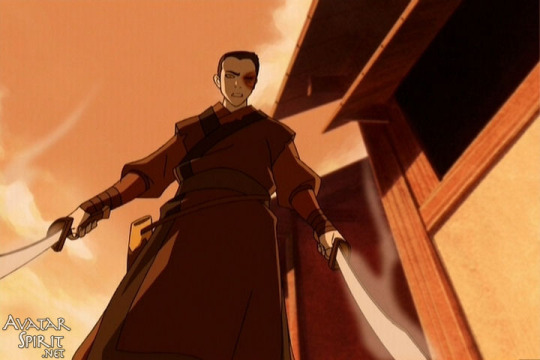
Zuko: My name is Zuko. Son of Ursa and Fire Lord Ozai. Prince of the Fire Nation, and heir to the throne.
Old man: Liar! I heard of you! You're not a prince, you're an outcast! His own father burned and disowned him!
Here, Zuko’s announcement of who he is has the opposite effect than what he thought, as he failed to realize that the Earth Kingdom citizens he sought to protect would not look kindly on Fire Nation royalty. This shows Zuko’s desire to get back what he’s lost without a real understanding of his privilege and the crimes his nation has committed against the rest of the world. And the old man’s reaction also has the added bonus of reminding him that even whatever hollow meaning he could have taken from his title is ultimately meaningless, because his father banished him.
And thus, just like Azula, Zuko’s identity is fractured into multiples. The first one is Prince Zuko, heir to the throne. The second one is Zuko the disgraced, scarred, banished, exiled.
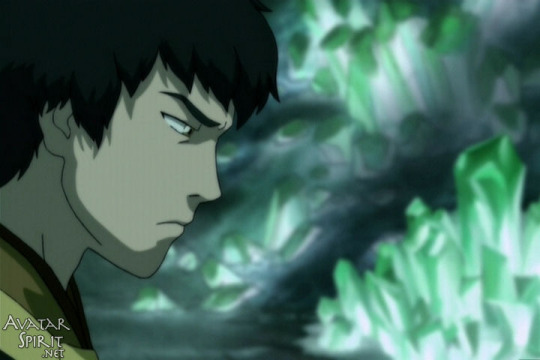

There’s also a third which is further broken up into multiples: Blue Spirit, refugee, tea server, that exists in between the two.
Zuko’s narrative is about trying to reconcile these identities into an authentic self, and for much of the series, he is single-mindedly pursuing what he thinks represents his authentic self. That’s why when he finally goes back to the Fire Nation, he tries to be happy with his identity as prince, and embrace it as much as possible. He thinks that telling the guys at the party who he is will impress them (even though it didn’t work the first time), but once he gets there, he feels more out of place than ever.

What’s this? A shot of Zuko’s scar and a mirror, and a guy who represents the kind of guy Zuko could have been if he weren’t who he is? Zuko’s got everything he wanted here. He’s the prince of the Fire Nation, he’s got a girlfriend, his honor restored, and he’s back home, but instead of enjoying himself, he decides to be jealous of this guy. His existential confusion comes out as insecurity over his relationship with Mai, because he can never be sure if he can be himself with Mai, or if Mai even likes his true self. I mean, if he hadn’t agreed to go back to the Fire Nation, if he hadn’t become Prince Zuko again, he would not even have a relationship with her, as he would have been making the journey back as a prisoner.
Zuko’s inability to return to his former identity as prince of the Fire Nation is symbolically represented in his scar. He is permanently marked by the suffering he has undergone, and permanently changed as a result of his experiences. In “The Crossroads of Destiny,” Zuko almost was able to reconcile these two aspects of himself, and to choose for himself which one to embrace. When he meets Katara in the catacombs, he is confronted with what his identity as Prince of the Fire Nation, and the legacy of destruction that goes with it, means to her:
Katara: You're a terrible person! You know that? Always following us! Hunting the Avatar! Trying to capture the world's last hope for peace! But what do you care? You're the Fire Lord's son. Spreading war and violence and hatred is in your blood!
Zuko: You don't know what you're talking about!
Katara: I don't? How dare you! You have no idea what this war has put me through!
Zuko, of course, objects to being characterized this way, and of course his relationship with his identity as the FIre Lord’s son is much more complicated than Katara knows, but she also is right that he has no idea of the suffering that his people have wrought upon the rest of the world. It’s when Katara brings up her personal loss of her mother, though, that he is able to empathize with her.
Katara: The Fire Nation took my mother away from me.
Zuko: I'm sorry. That's something we have in common.
Speaking of mirrored images, Zuko throughout his journey has had his own self-image held up to him and examined through the mirror of other people, one of them being Song, the Earth Kingdom girl who empathized with him over his burn scar. Katara is another, someone who, like him, lost her mother as a child. There are two things here that are an essential part of Zuko’s journey, 1) experiencing the suffering of others which pulls him out of his own self-centered perception, and 2) having his own suffering validated by seeing and meeting other people who have suffered in the same way. Contrast this to the way Azula treats other people’s suffering as not entirely real, calling her brother and her friend’s revelations about themselves in “The Beach” performances while also denying that she cares about her own damaged relationship with her mother. Zuko’s realization that other people’s suffering is real and something he should care about goes hand in hand with realizing that he did not deserve to suffer in the ways that his family has made him suffer. It is Katara’s pain over her mother’s loss that reaffirms that Zuko’s loss of his mother was also real and causes Zuko to realize that he is free to choose his own identity.
Zuko: I used to think this scar marked me. The mark of the banished prince, cursed to chase the Avatar forever. But lately, I've realized I'm free to determine my own destiny, even if I'll never be free of my mark.
Katara offering to heal the scar, although well-meaning, ironically sets Zuko back, because it reinforces the idea that the scar is a shameful part of his identity, something that marks him as Zuko the banished prince and separates him from becoming who he truly is. Katara connects with Zuko in a way that is authentic and real, but because Zuko cannot yet reconcile the dichotomy within himself, he ends up making the wrong decision underneath Ba Sing Se, and when Katara says during the fight that she thought he had changed, he tells her that he has, having made a decision about which identity to choose, although he still must take the final steps towards becoming whole by reconciling the two parts of himself personified by the “crossroads” in this episode.
But also essential to Zuko reconciling these two parts of himself is the development in season two of an identity that bridges gap between Prince Zuko and Zuko the banished. This is the Zuko that we see serving tea, working the kind of job that we might expect a normal teenager to work, and beginning to form a picture of himself that is surprisingly domestic. And even though he makes it clear to Iroh that this isn’t what he wants, it’s clear that some part of him craves this. Just as with Azula we see her wishful attempt to inhabit the role of normal teenage girl through going to a party and flirting with a boy, we see Zuko at possibly his most vulnerable and most “normal teenagery” when he is on his date with Jin. And even though it’s Iroh who pushes him to accept the date, we see Zuko reluctantly open up and genuinely enjoy himself.
However, Zuko still cannot experience true authenticity with Jin, as he must hide his Fire Nation identity. He does, however, covertly reveal his firebending to Jin, whose silent acceptance moves him ever so slightly towards an acceptance of his true self. This is ultimately too much for him, however, as once he accepts Jin’s acceptance and reciprocates her feelings he is overwhelmed and retreats, in part because he cannot reveal his true self to her for practical reasons and in part because he isn’t ready to do so on an emotional level.
It is also around this time in the narrative that Zuko sees another reflection of himself. His freeing of Appa is a huge blow to his self-perception, and this causes him to go into a fever during which he has several dreams that reveal parts of his identity or how he sees himself. The first is the image of himself on the Fire Lord throne, devoid of the scar but being controlled by two dragons with the voice of Azula and Iroh. And it’s after this dream that he looks in the mirror and sees himself as...
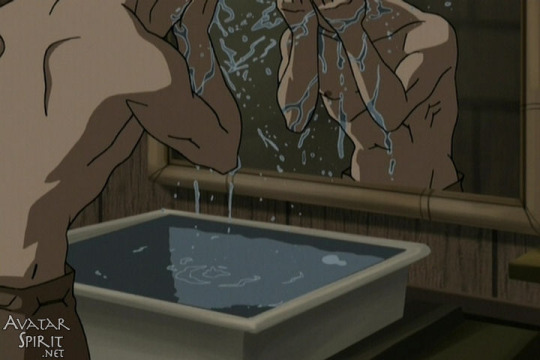
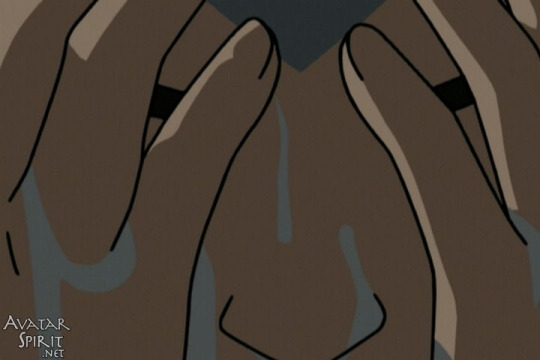
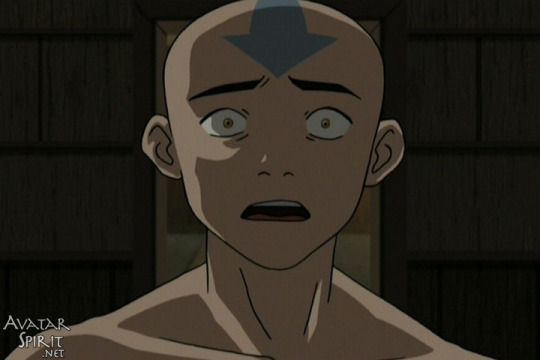
I’ve mostly seen this scene talked about in terms of Zuko and Aang’s narrative parallels and spiritual link, and it is significant for that reason, but it’s also a reflection of the choice Zuko must make about who he will be. If he is not defined by his identity as either Prince of the Fire Nation or his banishment, or his search for the Avatar, then who is he?
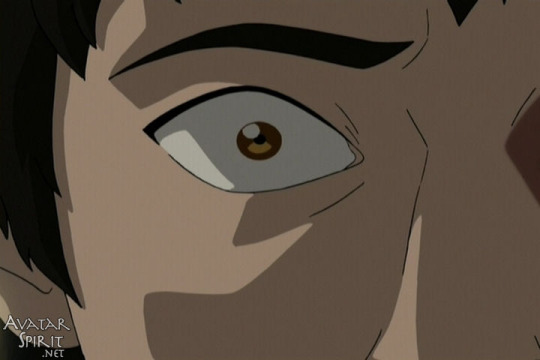

Zuko touching the scar upon waking to reaffirm that he is still himself shows us how much the scar has become a part of his identity. At the end of book two, he flirts with the idea of acceptance, and then with the offer of having it removed, and then when he goes back to the Fire Nation in early book three, he attempts to return to a point before the scar existed, before the fracturing of his identity, but finds that he cannot.
Zuko: During the meeting, I was the perfect prince. The son my father wanted. But I wasn't me.
By going to the war meeting, Zuko returns to the place of his original trauma and discovers that he cannot return to who he was before the fracturing of his identity, and that he, in fact, was never the “perfect prince” to begin with, that that person never existed.
What Zuko eventually comes to realize, through all of these experiences, and through returning to the home of his existence before the scar and finding it no longer a home, is that all of these identities are a part of him.
When he confronts his father on the Day of Black Sun, and then when he presents himself to the gaang, this is the first time that Zuko is being true to his authentic self, both by creating a more whole and positive identity and by accepting the trauma and guilt of his past and trying to atone. Therefore he’s able to create a more true identity and accept his place as Fire Lord without the cognitive dissonance that that identity brought him before.
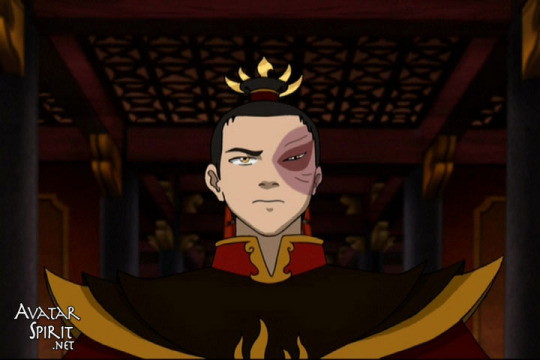
30 notes
·
View notes
Text
Bloom - HAN JISUNG
did i purposely edit this fic so it had exactly 11111 words? you bet
if you read moonstruck remember what i said about a series of nature spirit stories? well HERE’S PART TWO
(i will add links later because my posts don’t show up in the tags if there are links so anyway screw tumblr ig)
Pairing: Han Jisung x fem!reader
Genre: fluff, angst, nature spirit!au
Triggers: mild violence
Word Count: 11k
The trickster fae are known for destruction, not growth, but one repenting fae helps a mortal bloom.
Spinoffs: Perfect | Tiny Steps (I’ll Hold Your Hand)
SKZ Masterlist | Whispers of Nature

They say danger lies within the forest that marks the southern border of the village. But at this moment, you can’t really bring yourself to care.
If there is danger, let it come. You’re far too tired to think of the consequences of your actions and even if they result in death, you would rather die at the hands of Mother Nature than those of your fellow villagers.
But you forgot about the infamous screech owl. Just the thing that killed several foolish children who ventured into the forest several years ago.
It swoops down without a sound.
You wonder how an animal so large can move so quietly.
Then you see its eyes screaming rage and murder and your body finally moves.
Curses stream from your lips as you throw yourself to the side, landing hard on the pretty green grass. There’ll be a stain on your tunic after this that’ll be a pain to wash off.
If you get out of here alive.
It swoops down again and you veer left, pushing yourself to your feet. Wind whistles and the owl screeches and you scream.
This is how it ends, I guess.
Then something shimmers into being and the owl stops sharply, an expression mimicking your fear rising into its eyes. You remain rooted in place, eyes fixed upon the being in front of you.
The boy looks around your age. He glows in the fading daylight, his bare feet floating above the forest floor. Blonde hair falls down to his neck, and when he turns around, you can see it brushes across the top of his forehead, nearly hanging into his eyes. Green tunic. Brown pants. His clothes are so simple and plain, but he wears them like a prince.
He smiles at you, a heart-shaped smile that leaves you wondering what kind of being he is.
He turns back around and you don’t know what he does, but with a last screech, the owl flies away. You rack your brain for any clues on what this beautiful boy could be, but he faces you again and your mind goes blank.
He’s really rather beautiful.
“Hello.” Even that one word sounds so warm and inviting. Sparkling eyes glimmer with mischief. “What does a beautiful lady like you in this dangerous forest?”
It takes a moment to get your voice back. “Nothing much,” you finally reply.
“Pretty humans don’t belong in forests like this, where danger may lurk in any corner.” He floats a little closer, his glow beginning to warm your skin. He drifts down until he’s standing (is he really standing? He looks a bit translucent) in front of you. If you leaned forward just a few inches, your lips would touch his. “Especially not those with eyes as beautiful as yours.”
Your breath hitches. He’s staring at you with an uncomfortable (yet somehow alluring) intensity that wipes half the thought from your mind. No one has ever stared you in the eye with anything more than malice, fear, or disgust.
And certainly no one has ever said your eyes are beautiful.
“I wanted to be alone,” you get out. “Solitude.”
His eyes sparkle. “Very dangerous,” he says, nodding gravely, but you can see understanding in the curl of his lips. “I don’t know if you’re brave or foolhardy to seek solitude in the forest, especially so close to dark.”
“Foolhardy, probably.” You shiver slightly as the cooling wind sweeps across your skin. “Thank you for your help with the…”
Oh.
Realization fills your mind. Only a few beings could frighten an owl with their mere presence, and only one happens to glow.
He is one of the fae.
“Are you from the faerie ring?”
He has to pick up on your sudden shift in mood. All mortals know that fae can be dangerous, even lethal, in their intentions and tricks. The first thing village children learn is if they ever happen to stray into the forest, they must avoid the faerie ring. The fae have kidnapped many children, and never do they bring them back.
You know the guarded look that must be upon your face – you wear it every time you walk into the village square. But despite your realization, nothing changes on the fae’s shimmering, translucent face – he keeps grinning that same heart-shaped grin. He dips into a deep bow. “At your service, my lady.”
“Oh,” you murmur, stepping back. It’s less of a murmur than an exhale of surprise, really. No one has ever shown you such respect before – even if it is teasing, as this bow seems to be. But when the fae rises, you sense no malice. Only gentle mischief.
Silence stretches between you two until you clear your throat. “Well, Lord fae, thank you for your help with the owl.”
“It was my pleasure.” If possible, his smile grows wider.
“If there was possibly something I could do in return…” you trail off, lost in thought.
“Actually, there is.” His face holds an expression of pure innocence, but glinting eyes tell you too late that you may have made a grave mistake. The fae holds out one hand. “May I have your name?”
You almost say it. After all, when someone asks for your name, it is only polite to give it.
But typically, those who ask for names are not fae, trickster beings of high power. For them, giving a name means giving control. And when names fall upon the wrong tongue…
You don’t want to know what will happen next.
Mouth clamped shut, you think quickly, staring at the outstretched hand. Finally, you speak, words slow and careful.
“Lord fae, I’m afraid I cannot give you my name for it belongs to me and only me,” you reply politely. “But if it so pleases you, you may call me Nae Ireum.”
It’s the oldest trick in the book, telling a fae to call them by “my own self.” You know he would never fall for it and the laughter bursting from his lips tells you that you were right. As he laughs, you school your expression into one of slight amusement, but you know you cannot quite hide your fear.
What if he does not take your refusal lightly?
“Very good,” the fae chokes out, laughter gone. “You are a smart one, my lady.” He drops his hand to his side and smiles widely. “You have been taught well.”
“I taught myself,” you reply in a moment of brazen confidence.
“Then you must be a wonderful scholar.” He winks. “If you will not give me my first request, then at least allow me to escort you to the village.”
What?
You blink. “Why?”
“It would only be proper for a lord to escort his lady safely home,” he teases.
Maybe you smile shyly, but no one but this fae is here to confirm it, so you ignore the heat rising in your cheeks. “I’m not your lady,” you mutter.
“Of course, my lady.” His tone turns cheeky and you realize winning against this fae will not be possible. So instead of releasing the retort upon your lips, you only sigh. He grins in victory. “Let’s go!”
He stays with you for the entire hour-long walk back to the village, keeping you occupied with flirty words and teasing grins that make you feel as though you are simply speaking to a handsome boy, rather than a millennia-old fae of the forest. For the first time in years, you feel light of heart. His gaze rarely strays from yours but he does not make you feel uncomfortable, not even with your strange green eyes. No, he speaks to you like a human being, like someone who has a life and a story and a soul.
The sky is nearly dark by the time you reach the edge of the forest. “Thank you, Lord fae,” you whisper, feeling suddenly shy. His glow and his gaze make you feel warmer in the sunset.
His heart-shaped grin grows gentler. “It was my pleasure. If I could, I would kiss your hand.” He winks. “Alas, this form will not allow me to do so. Be safe, my lady. And keep the tears out of your eyes – it will only make them more beautiful.”
With those last parting words, he disappears into a soft flash of light, and you are left to wonder if the last few hours were only a figment of your imagination.
. . . . .
Jisung dozes slightly one day in the warm light of the fae realm. The queen seems to be in a good mood, for the weather is pretty and picturesque, and even the pixies have ventured out of hiding to dance among the waving blades of grass.
In the past, Jisung may have toyed with them, played little pranks and sent them fleeing back into their gardens. He would have laughed at their hatred towards his kind and taken pleasure in heightening that hate. But today, he only keeps his eyes closed and lets the pixies flit around him. So long as they cause no harm, he won’t either.
Then a small disturbance triggers in the back of his mind and he sits up, a half-frown, half-smile upon his face. Someone is near his faerie ring.
Maybe it’s the person he hopes it will be.
Green eyes flash through his mind. Not the forest green of the dryads (who didn’t wake up the entire time you and Jisung were causing a ruckus, which is really a testament to how soundly they sleep), but paler, realer, more intense. Still, though, Jisung finds one thing in common between your eyes and theirs: your quiet strength. The strength of the earth.
Jisung wouldn’t mind seeing you again.
He summons himself to the ring, where a pleasant surprise greets him. At the sight of your shocked face, he grins. “Back so soon, my lady?”
Your bright green eyes look slightly dazed, which is to be expected – the ring has power, and it likes to pull unsuspecting mortals towards it. Thankfully, you have enough presence of mind to resist, though Jisung feels a little put out by your backing away.
“Yes,” you answer shortly. You shake your head slightly as though shaking off the pull of the ring, and when you look up again, your eyes are clearer.
“For solitude again, or for something else?” His smile grows wider as he comes to a realization. “Perhaps you just couldn’t wait to see me again? After all, you took the trouble to find my ring.”
He prays he doesn’t sound too hopeful.
You snort. “As if,” you sniff, though your eyes betray your amusement. “I came out of curiosity. To see if I could find the forbidden faerie ring.” Your legs wobble slightly, as though you’re tired. You very well might be – Jisung knows you must be a long way from your village. He lies down flat on his back, hoping you get the message. When you sit cross-legged next to the ring, he knows you have.
“You dare sit in the presence of your Lord fae?” Though his voice sounds affronted, your nonplussed look tells him you see the lightness in his eyes.
“I believe you are trapped within your ring, Lord fae,” you deadpan. “If the legends are true, it weakens your magic.”
“Perhaps.” The wind blows, and Jisung relishes the feeling of fresh air against his brow. “But I could still curse you and your family from within this ring.”
“If you wanted to curse me, you would have just let the owl have its way,” you point out.
Jisung laughs, truly laughs. It’s been a long time since he’s spoken to someone new, and he is very glad that you are the someone new. “Astute observation, my lady.” With a sigh, he pulls himself up and winks at you. “A lady with a mind as sharp as her eyes are beautiful.”
The same sparkle rises in your shy eyes and Jisung delights in the sight. Truthfully, you are not the most beautiful woman he has seen. Over his millennia in the fae realm and the mortal plane, he has seen many fae and humans who are more conventionally gorgeous than you. But your eyes are alluring, your smile is sweet, and even with your quick tongue, you exude a sort of elegance and tired kindness that Jisung hopes will never fade.
“You’re not translucent anymore,” you note. Jisung knows you’re trying to change the subject and kind of wants to keep teasing you, but he’s in a good mood today so he lets you keep going. “Does that mean you’re fully bound to the ring?”
You really do know your legends. Jisung is impressed. “You are correct, my lady.” His smile only wavers very slightly. “When I accompanied you back last time, I sent a fragment of my soul. It was not my physical being.”
He then waits for the inevitable next question – “Why are you bound to the ring?”
It was the first thing Changbin asked when the faerie ring appeared. It was what all the dryads asked when they sensed the presence of their new neighbor. In fact, the only ones who hadn’t asked Jisung what happened were Hyunjin the water nymph and Chan the guardian, and that was because they were the reason why Jisung had ended up bound to the ring in the first place.
But the question that comes from your mouth is not the one he expects. “How does that happen? How do you separate your soul into different parts?” Your eyes are wide with curiosity, but not for him. For fae in general. Somehow, that comforts Jisung much more than attention on him would.
So he struggles to explain the process, fumbling over his words in a way that no Lord fae should, but you only nod and listen and smile and frown with singular concentration. You listen to his words closely, asking more and more questions until Jisung can’t answer them anymore and is forced to admit his lack of knowledge on the topic.
“So the Lord fae is not all-knowing, I see,” you tease. The sun has just begun to set and you are standing up, brushing bits of grass and leaves from your clothing. The blue tunic may look faded, but against the backdrop of the forest, you look like you could be a gentle nymph. One who helps, not harms.
“Did I ever claim that I was?” Jisung shoots back. He won’t lie – he can’t lie, in fact – his pride is a little bruised. However, his pride is not worth as much to him as it used to be. He can’t help the laugh that escapes from his lips again – he likes you too much. “Will you need an escort home?”
“You would escort me anyway even if I said no.” But despite your resigned tone, you look at him with a smile on your face.
“You are not wrong in that statement.” He grins. “Shall we go, my lady?”
(The next time you see him, you ask for his name. “If it so pleases you,” he grins, repeating your words, “you may call me Han.”)
. . . . .
Several months pass and you are very proud to say you haven’t shown Han your crying face once since the first meeting. But comfort and solitude were what drove you to the fae in the first place, and it is hard to pull up such deep roots.
You arrive at the ring with your tears mostly gone, but eyes still puffy and rimmed with red. You don’t call for him this time – in fact, you’re half-hoping he doesn’t come, so you don’t have to reveal this weak side that disgusts and saddens you.
You wish you were born stronger. Strong enough to fight the villagers’ sharp words and disgusted looks, strong enough to at least run away. But you can barely feed and clothe and shelter yourself as it is, so there is little to no chance of either event happening.
“There’s my lady.” Han’s teasing voice sounds beside you and on reflex, you look around slightly. Quickly, though, you drop your head, staring straight at the grass in front of you.
“What’s this?” You hear the rustle of grass, indicating that he, too has sat down. “My lady won’t respond to me?” The mischief in his voice turns to concern. “What’s wrong, my lady? Why are there tears in your pretty eyes?”
Because my eyes are a blight upon my being.
Because they bring the hatred of the village upon me.
Because no matter what you say, I can’t think of them as truly beautiful.
Because you may be lying to me.
“Han.” Your voice is small but steady and you take comfort in that. Still, you do not look at him. “Do you truly believe my eyes are beautiful? Or are you only playing another fae trick upon a poor mortal like me?”
Silence.
“My lady.” His voice is serious, yet you can sense the small smile in his tone. “With all your knowledge of the legends of my kind, will you tell me that you don’t know that we cannot lie?”
Embarrassment crawls up your skin. You do know the legend, but truth is multifaceted. There are many loopholes that the fae dearly love to exploit. “I do know, Lord fae,” you say, “but when you say my eyes are beautiful, it does not mean that you find them beautiful. It only means that at least one being between our planes finds them beautiful. It does not mean that person is you.” You snort. “And it certainly is not a member of my village.”
A sigh escapes from the lips of the fae next to you. “You never cease to amaze me,” he mumbles, more to himself than to you. “Your words are true. Yet I will promise you that I have only thought of myself when I tell you that your green eyes are some of the most beautiful I have ever seen.”
The tears start welling up again and you can’t bring yourself to look at the fae. Your mind knows his words must be true, for fae cannot break promises and they cannot tell lies, but your heart cannot believe it.
“Do you know what your eyes remind me of?” he asks.
You still don’t look up.
His tone turns a little pleading. “My lady, please look at me.”
You finally do, red-rimmed eyes and tear-stained cheeks and all.
“They remind me of freedom.” A small, different smile plays upon his lips. It isn’t sad, exactly – more nostalgic. Wistful.
“Freedom,” you echo.
“I was not always bound to this faerie ring, you know?” His tone is a little teasing, a little self-deprecating, a little angry, but also a little repentant. “When I was free, I used to travel the earth. It was green, green as far as the eye could see. It was beautiful.” He smiles at you. “Your eyes are the same green as my Mother Earth.”
You’ve never seen him this way – pensive, wistful, a far cry from the teasing sarcasm and snark you are used to. Your fingers itch to touch him, to comfort him, but sense still overrules your heart. To place a limb inside the ring could possibly be suicide. You will not risk that.
(Yet.)
The rest of your time together passes in silence. He doesn’t ask for an explanation of your state and you don’t offer him one, only taking comfort in the whispering quiet of the forest around you and Han’s warm presence beside you. As the sun begins to set, he asks if you would like an escort home. The smile on your face is more genuine as you stand up and nod.
The walk is also silent, though not uncomfortable or strange. But as you reach the edge of the forest, as he’s just about to disappear, you whisper, “Thank you.”
Han flashes you his heart-shaped grin – a little gentler, a little less teasing than usual. “Of course, my lady.”
. . . . .
One month. A full month passes before Jisung senses your presence near the faerie ring again. He reappears with a half-upset, half-overjoyed smile on his face, ready to teasingly berate you for not coming sooner and interrogate you on the reasons why. But the teasing words die upon his lips when he sees your state.
Because for all the sadness and strange words of your last meeting, he never expected that this was the reason behind your silence.
He’s never seen these bruises and cuts upon your skin before. A couple of faded scrapes are normal for anyone, and a few small bruises from when you fell, trying to get away from the owl. But this time, blotches of purple and green litter your arms while a small but fresh, healing cut slices your shoulder. A black bruise mars your right eye.
Jisung’s fingers itch to take your hand, to pull you close, to examine each and every cut and bruise upon your skin and exact revenge from those who caused them. For once, he wants to leave the ring for a reason other than to satisfy his selfish desire for freedom.
But he cannot. The invisible walls of the perfectly-shaped ring prevent him from touching you the way he wants.
“Who did this to you?” he murmurs instead, trying to hold back growing anger. “And why?”
You smile a little as you sit, though it’s cynical and sad and nothing like the genuine happiness you have shown him before. “Someone heard me speaking to you the last time you walked me back.”
“And?” Jisung pulls bits of grass from the ground out of frustration. “What of it?”
“They think I’m a witch.” Your clear, green eyes stare into Jisung’s, and suddenly, everything makes sense.
Why you wanted solitude.
Why you cried last time.
Why you asked him those strange questions about what he thought about your eyes.
He sits in silence as you explain. They think the devil took your soul when you were young, you tell him, and he cursed you with those horrible green eyes. The eyes are too different, too strange for the villagers to accept in their rural beliefs. They think of you as an abomination. The only reason they have not killed you yet is because they are afraid that watering the earth with devil blood will only make the Mother angry.
“Your parents?” he asks when you fall silent.
You laugh, but the sound holds no mirth. “They wish I were dead.”
Jisung stays quiet as he tries to wrap his mind around that. The closest thing to a mother he’s ever had is the Faerie Queen, and though she deals harsh punishments at times (he is exhibit number one), she has never wished death upon her subjects. She is mischievous, capricious, and a lying trickster, but to her subjects she is just and fair. She would give up her life for them.
Your voice breaks into his thoughts. “The other villagers pity them,” you continue, “so they get attention and pity and sorrow. I get nothing.” You pause. “Except you.”
He doesn’t know why that hits him so hard. You only spoke two short words. But those words give him such an indescribable warmth in his chest that he can barely control his intense desire to hold your face between his hands with the gentlest touch of the wind.
“So I couldn’t visit for a month,” you continue, oblivious to Jisung’s predicament. “They suspected I was going out to do witchy things, so I had to stay in the village so suspicions would fade away. I go out on my own a lot, anyway. They usually leave me alone unless something bad happens.”
“Why?” Jisung asks, recovering himself.
The cynical smirk on your face makes Jisung feel like his heart is breaking in half. “Because they blame it on me.”
To be fairly honest, Jisung doesn’t exactly know what to say to that. Sure, he’s been blamed for some small things he didn’t commit, but the faerie queen has her Sight and he’s always been acquitted. All his punishments have been justified, something he’s reflected on over the thousands of years he’s remained bound to this ring.
He can’t understand the injustice of your situation. Humans think fae are the tricksters and the manipulators, but how much better are they, with their aversion to strangeness and any sort of difference?
“Humans,” he huffs quietly, angrily pulling out another blade of grass. He does it with such force that he can hear the grass scream in pain. His eyes widen as he sees all the little piles of grass he’s pulled up around him and immediately he soothes a hand over them, attaching them back to their severed roots.
“I’m a human,” you point out with little venom. In fact, you’re staring at his hands with a hint of wonder and awe upon your face, nothing even close to annoyance or outrage. “But you’re not wrong.”
Jisung doesn’t know what to say in response.
“I don’t know, though.” You look up at him again and your eyes are impossibly clear. Minutes ago they were cloudy and upset and confused, but now they hold only clarity of thought. “What if I didn’t have green eyes?”
There’s another unspoken question that Jisung can hear as clear as day.
Would I have grown up exactly like them?
Jisung can’t deny that you probably would have. That had it not been for all of the misfortune caused by your strange green eyes, you would have been a happy, but clueless and far less accepting villager than you are today.
In all likelihood, you probably never would have met him.
“Your eyes have more benefits than simply making you beautiful,” is all he replies. He thinks for a moment. “I haven’t experienced all your sorrow so perhaps you will think the opposite, but I think your green eyes have given you more fortune than misfortune in creating your character.”
You don’t smile. You only nod. But the deep gray clouds that envelop your head clear, bit by bit, until the last tear has dried on your face and your lips rest in a neutral line, instead of turned down at the tips.
If Jisung weren’t bound to the ring, he would hold your scarred hand tight, as tight as he could without hurting you, to give you some sort of comfort to anchor you to your Mother Earth. But since he can’t, he contents himself with the fact that he can see the shining glimmer he yearns to see returning to your beautiful eyes.
. . . . .
Some villages call it May Day. Others call it Earrach. A traveler once told you, far away in Gaul, they call it le Jour de Printemps.
Your village just calls it the spring festival. Simple, formal, traditional, just like your village’s relationship with your Mother Nature. She gives you the fertile earth with which to grow the crops you celebrate in fall, during harvest season.
Well, not you. Them. You haven’t gone to a spring or harvest festival in years.
The air around your little shack is even more silent than usual, with all the villagers gone to the square to celebrate the new planting season. Girls in their white and pink dresses, boys in their buttoned shirts and nicest pants. Every family, no matter how poor, owns a set of clothing to wear for the spring and harvest festivals. If they are too poor to make one themselves, a neighbor will pass over a hand-me-down, or even sew a new one.
You weren’t an exception, at first. If you looked carefully, you could probably find an old white rag or two that used to be a spring festival dress. But as you grew older, fewer villagers wanted to take notice of you, so you have no traditional spring gown to wear for today.
There is one set of nice clothes you sewed for yourself a few years back, however. It isn’t pure white for spring, nor pastel pink for fall. It’s pale blue. But the village weaver charged a price sky-high for the nice cloth he makes specially for the festivals (even though he sold it to the next mother for half the price he gave you), so you ended up with this instead.
Not that you can really complain. The fabric is soft and clean, if a bit dusty – a result of not having worn it in over a year – but you’ve taken care of it. For what reason, you never really knew.
Maybe Mother Nature was quietly preparing you for today. Nudging you to make a dress and preserve it so that you could look presentable on the first spring festival day in years that you are no longer alone.
Still, though, you’re not quite sure why you slip on the flowy blue dress that feels so comfortable against your skin. You don’t understand why you don’t put on another one of your rougher tunics, slip on the trousers that have grown a little loose against your thinning waist. You’re not sure why you find yourself running the wooden comb through your hair not just until it’s untangled but until it’s smooth, and you’re not sure why you braid some of it back from your face in a style you have seen some of the merchant girls wear.
Black slippers, still worn but not as tattered as your everyday boots, go on your feet to finish the look. The dress doesn’t fit very well – you’ve only gotten skinnier since you made it – and the shoes are a little too tight, but no matter. You have no mirror so you couldn’t try to primp even if you wanted to, so you take a deep breath and head into the woods, ignoring the faint music and cries of laughter in the distance. And when you walk into the clearing where the faerie ring lies, you don’t have to wait a second before he appears.
He calls you “my lady,” again, with that same flirty grin he wore the first day you met. You don’t know why those two words mean so much to you. At first, they meant nothing, really – they only served to make you smile a little bit because, well, that was Han. Han the fae. That was what he was – flirty, grinning, a distraction. A glowing light in the middle of a village of gray.
For the last few times you visited, he didn’t call you by your nickname. Maybe it was just the look on your face because you know you didn’t feel the best on those last few trips. In fact, most of them were spent in comfortable silence or murmured conversations. You haven’t heard your nickname in a while.
Now, those words feel like they mean so much more than they used to. His tone is still flirty, his lips still smiling his heart-shaped smile, but he looks warmer. Feels warmer.
And though you should never feel this way around a fae and their ring, you feel safe.
“Why the fancy dress, my lady?” Han asks, jolting you out of your thoughts. His grin has only grown wider – is it trembling? No, it can’t be, there’s no reason for him to do so – and he’s looking at you with eyes that have never sparkled this brightly before.
You open your mouth to respond before realizing you don’t have an answer. Why did you dress up, really? What was the point?
You opt for a simple response that doesn’t really answer the question. “It’s the spring festival.” You sit down on the grass, careful not to wrinkle your dress. “I wanted to dress up a little for once.”
Even as you say it, though, you know that’s not the full reason.
“You don’t usually dress up, then?” he asks, sitting down as well.
How do you answer that question without giving the truth away through your expression?
The answer: you don’t. In fact, you haven’t even spoken a word before Jisung’s grin turns into one of mischief. “So you dressed up for me!” he sings.
“What – no –” you splutter, desperately trying to keep up a façade of calm as your cheeks heat up. You deny it, even as his eyes crinkle into slits of joy and mischief, as he laughs and teases your attempts at hiding your embarrassment. But in the end, you have to give up. He will drag this on forever if you don’t.
And the more you think about it, he was part of the reason you wanted to look nice. For once in your life, you wanted to look beautiful for someone whom you cared about. For someone who might care about you.
For someone whom you want to care for you.
“In all seriousness, my lady,” Han says when the two of you have calmed, “you look enchanting. Even more so than usual.”
The gentle, heart-shaped smile he imparts to you makes your heart jump, and you feel warmer inside than you have in years.
. . . . .
A lull in the conversation occurs just after noon, when the village is so loud and joyful that you and Jisung can hear music and laughter from all the way up on your forested hill. Jisung takes the silence as an opportunity to gauge your true feelings today.
He knows you must feel at least some happiness. Your laugh and smile and snark and sarcasm have all been quite natural. However, as your eyes wander over to where the music is coming from, he notices a soft, sad, wistfulness that overtakes your expression, leaving a shadow of your previous joy in its wake.
Jisung knows enough about human customs that on festivals like this, they dance. Girls dress up in flowy frocks while boys put on their starched shirts and they whirl about, smiles and laughter abounding.
Your dress is a dance frock. Your slippers are dancing shoes. With a pang, he realizes you shouldn’t be here. You should be with friends, kicking up grass as a handsome boy or two or three spin you around in celebration.
“You know, if you want to dance, you could dance with me,” he says softly. Truly, today, he means no deceit. He hasn’t in a long while, in centuries, really, but today he wants you to know it and be sure of it. He wants you to know that he means no harm to you.
That he will never mean any harm to you.
Your eyes snap to him, gaze guarded and unreadable. He swallows but continues. “Come into the ring,” he proposes. “I promise I won’t hurt you.”
“You know as well as I do that a fae does not make a promise without expecting something in return.”
Jisung can tell you don’t mean to hurt him with this statement. After all, his brethren are not known to be the kindest of Mother Earth’s creatures. He himself used to be less than friendly. So he doesn’t take offense at your words and only notes the longing gaze you give the ring that speaks far more than your cool words.
Your words are true. A promise for a promise – that has always been the way of the fae. But Jisung doesn’t know what he could ask from you in return.
But he does. It’s always been at the back of his mind, he thinks, but he hasn’t allowed himself to dwell on that until now. There is something he wants – one thing, something beyond even his own freedom. Because he feels like if he has this thing you could give him, he would feel free even in the confines of his ring.
Promise me your love.
But he doesn’t say it. Many of his fellow fae delight in ruining love, in causing mischief and strife between couples, in raining heartbreak upon those foolish enough to fall. But his punishment has taught him the consequences of meddling with affairs of the heart. Centuries of being bound to the faerie ring have given him enough time to think and ponder and discuss such subjects with Chan, the wise forest guardian, Changbin, the quiet moon child, and even Hyunjin, the water nymph who used to loathe him.
Jisung will not interfere with love. If his experience with Hyunjin has taught him anything, it is that true love is just that – true. It cannot be coerced or threatened in or out of existence.
He is sure he feels true love for you. But a heart must be given, not taken, so he does not ask for yours.
“Then promise me your happiness,” he finally bargains. “Promise me that for the rest of today, you will laugh, that you will smile, and that it will all be real.”
“You request something easier said than done,” is your quiet reply. “Why not ask for something tangible? Something stronger, more powerful?”
“Are you saying there is something more powerful to me than a simple smile upon your face, my lady?” His lips curl slightly. “If you are asking me to be more selfish, believe me, this is my most selfish desire – to always see happiness upon your face. For your happiness brings me mine.”
Sunlight dazzles on your blue-clad figure, sparkling on your shining hair and face. As Jisung waits for your response, he can’t help but think that the broad daylight only heightens your earthly beauty.
You are no willowy, graceful moon child, it’s true. But you are a true child of the earth. Rooted, solid, steady, nurturing, loving.
And Jisung could think of nothing more perfect.
It’s a very slow smile that spreads across your lips, but as it does, Jisung thinks that perhaps it is the most beautiful smile of all.
“Then, Lord fae,” you begin quietly, “make your promise, and I will make mine.”
“I promise that I will allow no harm to come to you here from the moment you enter this ring,” he whispers, his breath nearly catching in his throat.
“And I promise to smile with only true happiness for the rest of this spring day.” Your green eyes shine.
Jisung holds out a hand, feeling his fingertips touch the invisible barrier that keeps him trapped within the faerie ring. Then he feels a different sensation, one he hasn’t felt in centuries – warm skin against his own.
The same slow smile remains upon your lips as you look up at him, fingers loosely grasping his own. And with the simple grace of a fluttering leaf, you step into the ring.
. . . . .
The year’s summer is not a kind one. Warm, humid heat rests heavy upon the village, and bugs fly everywhere. You live rather out of the way, so when you’re at home, you don’t get the full force of the bugs and illness, but when you go to the marketplace, you see the effects on the rest of the village.
Red bites littering tanned skin. Clammy sweat dripping into dazed eyes. The absence of a single cool breeze makes the heat almost unbearable as you quietly make your rounds.
Many shopkeepers are absent that day.
You expect what’s coming next. They will bar you from the marketplace in the hopes that keeping away the witch will keep away the sweltering symptoms of a sweaty summer and the dreaded summer sickness.
So the day comes when you are forced to turn away from the market – not that the handful of coins in your pocket would have bought much anyway – and head back home. Only this time, you don’t have to go as hungry as previous years. In the shady forest, you tell Jisung of your predicament, and though he looks a bit like he wants to make the villagers suffer, he only shows you a few places where you can gather wild, edible plants, so long as you thank the Mother Earth for them and leave enough to grow.
“They really think you are a witch?” Jisung asks quietly one hot afternoon, when even the shade of the forest isn’t enough to keep away the overwhelming heat of the day. You’re back at the faerie ring, a basket of fruit next to your figure lying prone on the ground. Sweat drips down your face and onto the grass, but when you look over, Jisung doesn’t even look warm. He looks the same as usual.
Once upon a time you might have been unnerved by how otherworldly he is. Upon first glance, he is perfect, almost unimaginably so. You remember the first day you saw him in the forest. If you’d been in your right mind, you might have bowed to him as a god.
Yet after so many conversations and walks and lazy afternoons, to you, he is human. He stutters. His mouth can’t keep up with his mind sometimes. He has flaws. And he looks like a human boy, a boy with whom you could easily fall in love. Deep brown eyes that always hold a twinkle of mischief. Heart-shaped lips that look so kissable. Round cheeks that you could squish all day.
There is no use in fighting it, really. You are in love with your Lord fae, and you can do nothing about it. Every day you see him feels like another step into his dizzying embrace, another step into his full heart.
You think you’ve been falling for him this whole time, really. Perhaps on that first day, when he showed up and saved you from the screech owl and labelled your eyes as “beautiful,” it was not yet love. Maybe a simple crush. But on the afternoon you came to the ring with puffy eyes and tearstained cheeks and he only teased and comforted you, you think your crush started turning into love.
He makes you feel safe. If he didn’t, why else would you keep coming to the ring? Why else would you have stepped into the ring, and danced with him with no music until sunset?
But he’s still a fae. Despite your love for him and everything he’s done for you, everything he’s promised you, you can’t help but still second-guess his true intentions. Fae are not known for their kindness – only their ability to exploit lies and their inability to break promises.
He’s never made a promise to you that he hasn’t kept, one half of your brain reminds you.
He’s only made a few promises to you, though, the other side reasons.
You nod to Han’s question, too hot and tired to do anything more.
“Do you want to know what a real witch is like?”
When you look up, his eyes are smiling with his lips, telling you that the grin is genuine. The knowledge of this only makes your lips curl until you’re smiling too, and the heat of the day falls away as you sit up to listen carefully.
Han tells you the lore behind witches, a race that rarely comes into the open. They do not fly on brooms or stir bubbling iron cauldrons filled with poisoned liquids, he says, but they do make potions and they do perform spells (in cauldrons of other metals, for iron burns magic). Just like humans, there are good witches and evil witches. The good ones often remain in hiding, posing as doctors and apothecarists, while the evil ones wreak their havoc. That, he tells you, is why humans have such twisted feelings about them.
“You are not a witch, my lady,” he concludes, looking over at you. The setting sun has tinted the sky pink and the light makes a pretty flush against Han’s skin. Your heart speeds up when you see the softness in his face. “Witches are born of at least one witch parent, and your parents are villagers. I sense no magic from you. So if they call you a witch again, know that they are the ignorant ones, not you.”
“You always know what to say to me, Han,” you murmur, ignoring the thumping in your chest. “Thank you.” The words rise to your lips before you can stop them. “I always feel safe with you.”
His hand lifts slightly as though to touch your face, but you are not inside the ring today – you haven’t entered since the day you danced with him. So his fingers lower, and even though you think it best for the two of you, you still ache for the feeling of his warm skin on yours. “Do you remember the promise I made you last spring festival?” he asks.
“You promised you wouldn’t hurt me when I entered your ring,” you reply, curious as to why he’s bringing that up now.
“Perhaps, but you do not remember my wording.” He smiles. “I promised you that I would allow no harm to come to you here from the moment you stepped into the ring.”
It takes your mind a few seconds to work through that. Then everything clicks. “You –”
“You will always be safe in the ring,” Han interrupts, his eyes shining with softness. “Always.”
You feel a tear bubble in your eye but you blink it away, hoping he doesn’t notice. “Thank you,” you whisper.
He smiles again. “Of course, my lady.”
. . . . .
As the days pass, as the heat gets worse, you finally tell him of the summer sickness. The sweats, the chills, the fevers that overtake the villagers in this hot, humid weather.
You don’t have the fever. Many times you have reassured Jisung that the sickness never touches you – you live too far away from the village to catch it from someone else. Anyway, they always kick you out of the marketplace at the beginning of summer, so you don’t have any chance to get it. Bugs don’t really touch your little hill either.
But the sickness still takes a toll on you. Perhaps you don’t grow ill, but Jisung can see the sick fear growing in your eyes, in your shortened visits to the forest. A new splotchy bruise appears on your leg and you tell him you tripped over a rock.
That’s a lie.
After he doesn’t see you for fourteen days straight, he sits you down when you finally return, voice trembling, and demands an explanation. He cares about you so much, he realizes, his heart can barely stand it. When you didn’t come day after day after day –
“My lady, I thought you were gone forever,” he chokes out, trying to keep the wobble out of his voice.
Your eyes immediately fill with guilt and sorrow and you bite your lip harshly, eyes downcast. “I’m sorry,” you whisper, words wavering.
“Just…” Jisung swallows. “Just tell me why. Did I do something? Or was it the village again?”
So you tell him. The summer sickness is worse this year, worse than any other year you’ve been alive. Four children have already died, as have two adults and one of the village elders. And the villagers need someone to blame it on.
Jisung wants to personally set fire to the entire village when he hears that. He can’t imagine how anyone could have the heart to look you in your strange, sharp, green eyes and say that you are the cause for an entire village’s troubles. That your lovely green eyes are the mark of a devil.
How narrow-minded could a person be to not see the beauty that lies in your character?
But he used to be the same way, he realizes with a jolt. Humans, to him, used to be mere playthings with no emotions, no lives, no meaning. They existed for his entertainment and that was all. Perhaps he did not see them as the cause for every single one of his troubles, but isn’t the thought the same? He didn’t see humans as real, living beings, just as the villagers don’t see you as one either.
He is glad he has changed. He hates the Jisung he used to be, but at least he has grown from that terrible prankster fae. He truly is glad he has changed.
He is glad he met you after he changed.
“So I couldn’t come over for a while,” you say, breaking into his thoughts. “I… I didn’t want them to have more reasons for thinking I’m a witch. It’s bad enough that I’ve never come down with the sickness. If I had, maybe they wouldn’t think I was the reason.”
Jisung wants to take your hand. He misses the feeling of your fingers intertwining with his. It made him feel safe. Cared for. Loved.
He settles for letting his fingertips touch the edge of the ring, pressing against the invisible barrier that keeps him from leaving. And after a few seconds, you place your hand down to touch your fingertips against his.
It is enough for now.
“Remember, my lady,” he whispers, refusing to look away from your eyes that always drag him in. “You’ll always be safe in the ring. No matter what.”
Even though you duck your head to nod and Jisung can’t see your green eyes, he knows that there are tears in them. He can see it in your slightly-trembling shoulders, in your fingers that shake against the steady earth.
And his heart aches for your troubles, hoping they will end soon.
. . . . .
The worst is always yet to come and you realize this as you’re sprinting, barefoot, over the forest floor. Your time in the village was never going to last. Sometime or another, a fuse was going to light the bomb created by your existence.
The fuse comes in the form of the fifth child’s death from summer sickness.
They came to your shack with old pitchforks and kitchen knives and rusted swords. You heard the shouts, saw the torches, and there were only two words echoing through your mind.
Run away.
You might’ve gotten away without them seeing if you hadn’t made so much noise wrestling through the bushes. On a normal day, the noise doesn’t matter because no one comes around here and you can trample over whatever you want. But it is night, the villagers are screaming bloody murder, and you don’t have time to worry about stealth.
When they reach the edge of the forest, their torches simply burn the bushes to the ground. Your head start is dwindling fast and you waste more of it as you stand at the edge of the forest, all of the warnings you’ve been given about the forest racing through your head. It may be safer during the day, you think, but what horrors lie in the dark of night?
Then Han’s words, soft and clear and kind, push them all away.
“You will always be safe in the ring.”
His smile.
“Always.”
You steel yourself and dart into the trees.
Pure instinct fuels your body. You can’t see anything except for the faint glow of fire behind you and the farther away that is, the better. Trees materialize out of nowhere and their branches catch in your flying hair. Rough stones slice your feet. A small animal races past your feet and you have to stifle a scream. More than once a sinister presence lingers in the shadows as you fly past, but you cannot take the time to give into your terror.
Torchlight burns. Voices shout. The forest fills with fear – the villagers’ fear of you, your fear of them, nature’s fear of you all. You stumble over hidden rocks and bumps and bushes and all the time you’re wondering where is the ring? Why am I not there yet? Is this the right way?
But then you see the sparkle of the pond nearby, a pond you have seen so many times on walks with your fae (in his transparent form, of course). He’s told you many stories of the water nymph there. But today you don’t care about Hwang Hyunjin. His pond only serves as a marker. As something to show you your path.
The race uphill is nearly torture. Without your shoes – even the tattered ones – the hill feels so much rougher and stonier than it normally does. Even the bed of grass can’t fully disguise the sharp bumps that dig into your feet.
He isn’t in the ring. You didn’t expect him to be, not now, but for a moment, your mind flails wildly.
What if your fae doesn’t come?
A glance behind tells you the villagers are still chasing. A few are climbing up the hill. You have no choice.
“HAN!”
You jump into the ring.
For a moment, the ring is empty save for only you. The first villagers trample nearer but their steps grow slower and their howls of rage and fear turn to frightened shouts and whispers as they realize where they are. You lie in a heap on the ground, all heaving gasps and shaking limbs and trembling lips.
Then warm arms embrace you, pulling you close to a chest with a steady heartbeat that calms your erratic mind and breath. Han’s thumbs stroke smoothly, sweetly, on your skin, and the pent-up tears begin to escape your cursed eyes.
“You are safe,” he whispers in your ear. “In my ring, you will always be safe.”
Some foolish shout rings through the night and a pitchfork sails through the air. You instinctively start to cry out no, Han, watch out! –
With a single flick of a finger, the pitchfork falls to the ground outside the faerie ring, harmless. Silence again takes over the clearing.
“What is the meaning of this?” he hisses.
His words are ice cold. You have never heard this tone before.
“L-Lord fae, she has infected our village with the summer sickness,” a trembling voice says. “Surely you see –”
“Your children are infected with the festering hatred you have for all things strange,” he spits. “Her eyes have no weight on her character. She is no witch. She bears no blame for your village’s summer sickness.”
Silence, except for your ragged breaths.
“Do not touch her.” His hand strokes your hair gently, coaxing out the last silent tears, a contrast to the blades of his tone. “A lord will always protect his lady, no?”
. . . . .
You make no effort to leave the ring that night but even if you did, Jisung wouldn’t have let you go. Not after the fear he saw in the villagers’ eyes.
Fear is often more dangerous than anger, after all.
He does not sleep the entire night, only holds you close, even when your shaking sobs stop and you slump, asleep, against his chest, tears still rolling down your face. His heart breaks a little more every time he looks down at you.
If this is how I feel, Jisung wonders, how did Hyunjin survive? When his love was snatched away from him, never to walk the earth again?
A new wave of shame and respect for the water nymph washes over him every time such a thought comes to mind. For if Jisung feels so strongly about you being merely hurt, he cannot imagine what pain Hyunjin endured when he lost his lover.
No wonder Hyunjin loathed him so much for so long.
You wake with the dawn. Had it not been for the slight fluttering of your eyelashes, he wouldn’t have realized at all. For a brief, terrified moment, Jisung wonders if you will break away from him.
But you don’t. You don’t move closer, but you don’t move away. You don’t protest his hands stroking your hair rhythmically, only close your eyes and sigh a little.
“Thank you for yesterday,” you finally murmur. “I’m sorry I cause you so much trouble.”
Your green eyes open and they look tired. So, so tired.
Jisung wants to bring the life back to them.
“It was no trouble,” he replies. “It is never trouble to care for those you love.”
When your eyes startle, Jisung realizes what he’s said. He’s just confessed his love for you. Though he’s known it for weeks, the words leaving his lips still make him feel a strange vulnerability in your presence. But he doesn’t regret it.
“Those you love,” you echo quietly. Though there is a tiny smile on your face, your voice is sad. “How could a fae as powerful as you love a –”
“Stop.” Jisung can’t listen anymore. “Stop it.”
“But –”
“If there is anyone unworthy of your love,” Jisung interrupts, “it is me. Not the other way around.”
You remain quiet this time.
Jisung sighs. “I think it’s time I told you how I was bound to this ring.”
He tells his tale with hot shame and sorrow creeping up his cheeks and choking his throat. He tries his hardest to keep his voice steady but fails as he speaks of Hyunjin’s first love with the cloud nymph, the wisp of a girl who made him smile in ways Jisung had never seen before. Now that he knows the love that Hyunjin felt, it is so much more difficult to speak of it. To know that he ruined it.
He tells of the pesky sprites who goaded him into meddling with that love. With a heavy heart and hanging head, he reveals the prideful, selfish, despicable faerie he once was, one who could not back away from a dare and treated all of those around him as toys.
“We all knew Hyunjin and his nymph were fated to fall in love,” Jisung says. “It was just something we could see, plain as day. So the sprites dared me to play with fate. To end their love.”
Jisung doesn’t want to look at you. He can’t stomach the fact that you might be looking at him with disgust and shame, all of your previous lightheartedness with him gone. If you did, he wouldn’t be surprised – he deserves it.
But your grip on him doesn’t loosen. If anything, it tightens. Jisung finds the strength to go on.
He never meant it to go so far, he explains, as though that makes it better. He only wanted to break their love apart. He found a jealous, spurned suitor of the nymph and talked him into goading her to leave Hyunjin.
Instead, the suitor killed her. And the waters that raged through the forest for weeks after her death would have killed all the life there had Chan, the guardian, not called on Mother Earth to placate the water nymph’s anger and sent for the faerie queen to punish Jisung.
“That’s why I am bound to this ring,” Jisung says. “I am bound here until two things happen.”
“What are they?” you ask.
A small, genuine smile spreads across Jisung’s lips. “I first had to help Hyunjin find love again.”
A willow seed from Jisung’s esteemed collection. One of the seeds of the first willow that ever grew from Mother Earth’s mantle. It did not matter that the nymph who grew from the weeping willow that now drapes across Hyunjin’s pond was mute, that she could not speak. Her strength won Hyunjin’s heart. And after seven centuries, Hyunjin has forgiven Jisung.
“The second condition?” you prompt when Jisung falls silent.
Ah. He doesn’t want to tell you this one. He doesn’t want you to think that all of his love for you has been faked, has been solely for the purpose of attaining his freedom. But he will not lie to you.
“I had to find someone who, in the words of my faerie queen, would be foolish enough to love me,” he says.
With this admission, Jisung can practically hear the thoughts rolling around in your mind, bouncing off the walls of your skull and manifesting in doubt, uncertainty, and fear. “I know what you must be thinking,” he says hurriedly. “Did I only keep you around to break my curse? Truth be told, I didn’t think of that until several months ago, the day of the spring festival.” He laughs a little.
“At the start, never in my wildest dreams did I think I would fall for a human. But you were interesting. Clever. Intelligent. Your beautiful eyes may have caught my attention, but it was your soul and your mind that caught my heart. I wanted to keep talking to you.” He smiles. “On the day of the spring festival, I realized I loved you, my lady.”
Your fingers tighten around his.
“But it was I who loved you, and truly, I couldn’t think of a reason why you would love me.” His smile turns sad. “I found myself thinking of the curse and wondering, what would I do if you loved me back?” He swallows. “Do you remember our promise that day?”
By now, you’re looking into his eyes. Your gaze is a little unnerving, but Jisung forces himself to stare at you. “Yes,” you answer.
“I almost asked you to promise me your love,” he says, somber. “But by then, I knew that love must be a gift. I could not take it from you. So I asked for the next best thing – my lady’s happiness for just that day.”
Silence.
“After you left that night, I thought about my feelings. It took quite some time to sort through them all.” He smiles tentatively and his heart lightens when you smile back. “I realized that I didn’t care about my freedom. I wanted you to love me just because I loved you, even though I didn’t deserve you. I didn’t care about breaking the curse. I only wanted you to love me back.”
He’s done. He’s told you everything. His heart pounds as he waits for your response.
Will you leave him?
“Do you still want that?” your quiet voice says. “Do you still want me to love you?”
His heart is threatening to burst. He nods jerkily. “A thousand times, yes,” he whispers.
“I think I’ve loved you since the day I came to you, crying, and you asked no questions, only comforted me.” Your voice is low, quiet, small, but soothing. “I realized it the day of the festival, the same day as you. But I could never quite trust you, it felt like. You are a fae. I am a human. In my mind, I thought this could never happen.”
Jisung wants to protest but holds his tongue. This is your time to speak. He will not interrupt.
“But I trust you now.” Your shining, teary eyes look up at him with an emotion he’s never seen directed at him. He’s seen it on Hyunjin, looking at his willow nymph. He’s seen it on Changbin, gazing at his moon girl.
It hits him that you love him too.
“You’ve told me much, and there would be many who say you still do not deserve love, Han.” Your voice pulls him out of his thoughts. “But I think you have repented. I think you have learned. The fae I know is a far cry from the prideful one of centuries past. He has given me safety, comfort, hope, love.” A smile graces your lips. “I think I love him.” You shake your head. “No, I know I love him.”
You sit up with a wobbly smile on your lips and Jisung stares straight into your bright, lovely, green eyes, glowing with the rosy light of dawn. “May I?” he asks, his voice barely a whisper.
In return, you nod, and his lips fall onto yours.
Jisung has had many kisses over his millennia-long life, to the point where he once thought he couldn’t feel anything new anymore. But your lips are nothing like the ones he’s kissed before.
Chapped, dry, they shouldn’t give Jisung the bliss he feels. He’s kissed lips far smoother than yours. But it is not the lips he kisses, Jisung realizes, but the person to whom those lips belong.
A little sigh leaves your parted mouth and Jisung pulls you closer, holding you with the gentility of the morning breeze on his skin, pressing his lips to yours. An hour could have passed or even a day, and he would never know. He only knows the bliss he feels that moment.
Too soon, you both must break away for air. And even though tears still stain your cheeks and Jisung’s hair has been mussed by your hands, he has never felt so content in his life.
“Give me your name,” he whispers, pressing his forehead to yours. “Give me your name, my lady, and I promise I will do all there is in my power to keep you safe from harm. Give me your name, and I promise I will travel to the ends of the realms to keep you happy.”
Your thumbs stroke his cheeks and he leans into your touch, eyes fluttering in bliss. “Give me yours and I’ll give you mine.” A hint of that long-lost mischief dances in your eyes even as tears threaten again to fall down your face and Jisung wants to cry. He’s waited to see that expression on your face for too long. “I want to know you, Han. All of you.”
Hyunjin once told him that when he loved someone, he would feel no fear giving them his name. When he loved someone, he would trust that they would use his name only out of care. They would not toy with it. It would sound different in their mouth. It would sound safe.
At the time, he just cackled and made some dumb joke about how he definitely wasn’t Hyunjin’s love, then. The two had proceeded to drown the forest with their bickering until Chan came over to separate them.
But now, as he hears you repeat his name once, quietly, whispering it on your tongue, he knows what Hyunjin meant. His name is safe between your lips and yours is safe between his.
Jisung’s heart bursts.
He stands, pulling you up on shaky legs. For the first time in over a millennium, he steps out of the faerie ring, ready to leave the perfect circle of flowers and grass forever.
“Where does my lady wish to go?” he asks. His grin couldn’t get any wider.
Your smile is more enchanting today than it ever was, and your green eyes sparkle in the rising light of the sun.
“Anywhere, as long as it’s with you.”
#inkidz#stray kids#skz#stray kids scenarios#skz scenarios#han jisung scenarios#3racha#han#fluff#angst#triggers#violence#nature spirit!au#stray kids han scenarios#whispers of nature#bloom#scriptura-delirus
354 notes
·
View notes
Text
To Save a Loved One Ch7
Warnings: Major Character Death, Blood, Violence, and just a whole load of trauma tbh
AO3
Ch1 Ch2 Ch3 Ch4 Ch5 Ch6 Ch7 Ch8
Excruciating pain bled up Adrien’s broken arm, but it was nothing compared to the cold congealed in his stomach.
Dad? Adrien tried to say, not fully comprehending what his father’s words meant.
His father broke his gaze with the terror-stricken Marinette, and slowly turned his steel-grey eyes to him. A terrifying finality glinted deep within them. A dangerous determination was etched into the very fabric of his being.
The colour drained from Adrien’s face as realisation sank in.
His lips parted with horror; denial turned his muscles weak; his legs gave way beneath him before he was caught by the Gorilla.
‘No,’ he whispered, the word barely able to make its way out.
Gabriel looked away and turned back to his wife.
‘NO!’ Adrien screamed. He strained to break free, but fire seared down his arm and his cry cracked into pain and he bit down on his tongue. He tasted metal.
‘Take him away.’ Gabriel handed the Gorilla a remote. His voice softened as he gazed at his son. ‘Keep him safe.’
‘No!’ Adrien shook his head as the Gorilla forced him round. ‘No, NO!’ He kicked; he struggled; he strained against his captor, the shooting pains in his wrist only adding to his cries.
‘FATHER!’ The cry ripped itself from him. ‘FATHER!’ His lungs raw and burning. ‘NO!’
But the Gorilla pulled him away, down, down the walkway. Adrien’s cries and shrieks echoed uselessly around the chamber.
A terrified ‘ADRIEN!’ rang out from a Marinette who had somehow freed her mouth.
‘MARINETTE!’ Adrien screamed back as the Gorilla pulled him through the archway. ‘MARIN-’ The metal doorway slammed shut. Darkness fell upon them. ‘NO! NO!’ Desperation flooded Adrien and hysteria slammed into his gut as the Gorilla dragged him up the staircase. ‘NO, MARINETTE!’ Adrien pulled his arms free and clawed at the walls, wailing at the excruciating pain in his wrist. The stone soaked up his yells; his blood from ripped nails marked the brick; hot tears sank into the ground to be swallowed by the earth. And Adrien fought with all his might to save his Lady from death.
~~~
Adrien’s screams echoed in Marinette’s mind as she stared at the door waiting for him to burst through again. Because he had to. He had to. Her vision blurred from the intensity of her stare. She started slipping from her mind. Waves of disassociation washed over her.
Movement in her peripheral vision snapped her out of it.
She narrowed her eyes as Gabriel drew himself upright and stared at the jewels in his hands with a feverish shine in his eyes. The ring had turned into a simple silver band and the earrings into circular cufflinks to match.
‘PLEASE!’ Marinette begged as she strained against Mayura, her mind refusing to accept the implications of what Gabriel intended. ‘THINK ABOUT ADRIEN!’
Gabriel didn’t move. ‘You should really think about yourself, Miss Dupain-Cheng,’ he said and Marinette shivered. ‘But then, you are Ladybug.’ Marinette’s gut twisted and froze solid.
‘Please.’ The strength fled her voice and came out as a hoarse whisper.
Gabriel turned his head towards her but instead looked at Mayura.
‘I told you to keep her quiet.’
Mayura made no move to silence Marinette. ‘Are you sure you want to do this?’ she asked, her voice soft and careful and quiet with pleading.
Gabriel’s eyes flashed in anger. He slid the ring on in reply.
Marinette gasped when Plagg materialised. He hung heavy in the air, exhaustion wearing him down. His eyes, mere slits of electricity that cut through the darkness.
‘What are you doing?’ The kwami’s voice had lost all its usual humour and was dangerously quiet.
Gabriel ignored him and put the cufflinks on, his old ones fell to the floor with a soft thud to be lost amongst the greenery.
‘You can’t do this!’ Tikki yelled as soon as she appeared. But, like Plagg, her energy was depleted.
Gabriel ignored her outburst. He took his time straightening the cuffs of his sleeves before raising his eyes to finally acknowledge the two gods.
‘What are your names?’
The kwami stared back, defiant; their mouths firmly closed. But Marinette bit her lip with fear at the fatigue and panic in their eyes.
‘Your names,’ Gabriel repeated with an intensity that the kwami were bound to. Marinette watched them struggle against his demand, but ultimately, they bowed their heads and let their names slide off their tongues.
Gabriel smiled. ‘There, that wasn’t too hard, was it?’
‘M-Master, p-please—’ a small voice began.
‘Silence, Nooroo!’ Gabriel cut over him. ‘I won’t have you blubbering in my ear.’
A soft pat-pat disrupted the silence as Nooroo’s tears dripped onto the floor. Gabriel turned away from his kwami with disgusted annoyance and moved towards his wife.
‘Nothing comes without a price,’ Plagg said, his electric eyes deadly serious.
Gabriel paused in his movement. He held Plagg’s gaze. ‘I know the price,’ he said quietly.
Tension stretched between them.
‘Do you?’ Tikki asked, her soft voice piercing the silence.
The hair’s stood up on the back of Marinette’s neck as Gabriel’s soft voice rolled around the room. ‘She wouldn’t be here if I didn’t.’
Tikki shivered with fury. Plagg glared at him with such a vicious hatred Marinette could feel it emanating from him.
‘You fucking bastard,’ he said, his quiet voice worse than any yell.
Gabriel smiled.
Marinette choked; realisation finally broke through her denial.
‘No,’ she begged, straining against Mayura, ‘No!’ she cried as desperation clawed through her.
Gabriel raised his hands, his eyes glittering. ‘Tikki, Plagg—’
‘ NO! ’
—‘Combine and transform me.’
Marinette screamed, the air tearing from her lungs as red and green magic swirled and merged around Gabriel, turning him into something horrific and powerful.
She ripped herself from Mayura’s grasp and tried to dash forward, but Mayura pulled her back and threw her to the floor, slamming her heel into her chest and knocking the air from her lungs, pinning her down to the ground.
‘Don’t!’ Mayura hissed.
Despite gasping for breath and being crippled with pain, Marinette grit her teeth and clawed at Mayura’s leg, but cried out when Mayura pushed down harder and cracked something in her chest.
‘I said don’t,’ Mayura whispered, her voice oddly desperate and pleading. Marinette sobbed, her eyes watered with fear and pain. But then a low laugh distracted them both. They looked at Gabriel.
Except, with a new purple suit crackling with electricity and blinding white eyes giving off a terrifying energy, this man was no longer Gabriel. Nor Hawkmoth.
He was much worse.
He flexed his hands and grinned at the strength flowing through his veins before stepping towards his wife.
Marinette struggled. Mayura jerked her head back to her and gave a sharp shake of her head. Marinette stilled.
‘Please,’ Mayura whispered, so quiet Marinette could barely hear it, her voice filled with pleading and pain. ‘Don’t.’ And this time Marinette understood the depth to the word.
‘Creation and Destruction,’ the-man-who-was-no-longer-Gabriel began, his voice both god-like and demonic. ‘A life given, a life taken.’ Mayura lifted her foot from Marinette’s chest. Marinette stared at her wide-eyed with fear, her breaths shallow from pain and apprehension. ‘I wish to bring back that which should not have gone.’
Marinette forced herself upright as Mayura stepped towards the man. A desperate ‘No, don’t!’ near burst out from her, but her words never lived. Mayura looked back over her shoulder and killed the words on her lips with a small nod and a look that said, ‘I know what I’m doing.’
Mayura gave a sad smile. Tears streamed down her cheeks.
And then, the world burst into light.
~~~
‘MARINETTE!’ Adrien raged on the other side of the portrait, slamming his shoulders into the picture blocking the doorway. Over and over. Again and again.
‘MARINETTE!’ He picked up a shard of glass and slashed at the picture and tried to pry it open. The glass cut into his palm. Blood trickled down his wrist.
‘MARINETTE!’ he screamed and slammed into it again. The Gorilla pulled him away. ‘NO, NO! LET GO OF ME!’ Adrien wrenched himself out of his grasp and fell onto all fours, hissing as pain shot up his arm, before running back to the portrait and tearing at it once more, filling with desperation and nauseating fear. But it wasn’t budging.
He rounded on the Gorilla. ‘OPEN THE DOOR!’ he screamed, voice cracking with emotion. ‘OPEN IT!’ But the large man made no move to help him.
Adrien looked around and spied the hole in the ground caused by their previous battle. He ran at it, but before he could jump through the Gorilla caught him and threw him back.
Adrien screamed with frustration and tried again. But this time the man held him tight.
‘Let me go!’ Adrien pummelled the chest of the man. ‘Let me go to her!’ His voice broke. ‘Please!’ It weakened. ‘I have to save her or m-my f-father will—!’ he slammed his hands to his mouth smearing blood on his cheeks. His breathing quickened. His chest closed up. ‘No, no, no,’ he muttered, grasping his hair and shaking his head. He wanted to throw up. ‘He can’t. He can’t!’
Adrien had known his father had sunk into grief, but never had he imagined he’d fall this far.
‘Please,’ Adrien begged, his voice dropping to a terrible whisper, ‘tell me he won’t do it.’
The giant man held him gently and remained silent.
Adrien burst into tears. He fell limp in the Gorilla’s arms and succumbed to his grief. And they stayed like that a moment as Adrien’s wails rang out, trembling in the Gorilla’s arms, overcome with panic.
The man gingerly lifted him up and carried him from the room, carefully stepping around the debris, into the lobby, and out the front door. He placed Adrien in the backseat of the car and did up his seatbelt. Adrien was too distraught to question him or fight back.
The Gorilla pulled the car out and drove through the streets of Paris. And ever so slowly, Adrien’s sobs slowed and apathy took over.
Time lost all meaning as Adrien stared out the window, the world passing him by with unknowing indifference; the streetlights blurred in his vision; numbness pricked at his skin; his emotions faded to a dull pounding headache.
They paused at a red light and Adrien watched three drunken tourists laugh and sing into the night. Their happiness felt alien and foreign, wrong and twisted. Like it had no right to exist.
They kept driving.
Eventually, Adrien wet his tongue and opened his mouth to speak.
‘Where…?’ he started, his hoarse voice scraping his throat.
The Gorilla looked at him through the rearview mirror and Adrien shivered at his dark piercing eyes; he realised where he was being taken. Adrien swallowed and clenched his fist, and he braced himself.
As soon as the Gorilla brought the car to a stop, Adrien got out with his heart in his mouth. He ran up the stairs and burst through the doors and strode over to the startled receptionist who barely had time to take in his haggard appearance before he slammed his left hand onto the counter right next to a pile of forms with the word POLICE emblazoned at the top.
‘I need to speak to Sergeant Raincomprix,’ he said, his voice unexpectedly steady. ‘Tell him it’s Adrien Agreste and—’ A lump in his throat made him falter. He clenched his jaw tight. He hardened his heart. He swallowed the lump down and thought only of Marinette.
‘And tell him, my father is Hawkmoth.’
~~~
Gabriel fell to his knees, retching and coughing, sucking in air which ripped through his lungs and tore at his throat; magic pouring from his body as his transformation dropped. Limbs shaking, muscles straining, he gave one more deep-chested hack before digging his fingers into the dirt and scrambling over to Emilie, murmuring her name over and over as he fumbled at the buttons of her case until the glass slid open and he hauled himself up. ‘Emilie,’ he breathed. He pulled at her shoulders but she was limp in his arms. ‘Emilie, Emilie!’ He forced her upright again, distress building within him.
She slid through his fingers and fell back with a sickening thump.
Gabriel flushed cold with horror. His mind in denial.
‘Emilie,’ he whispered once more, his hand shaking as he brushed her unmoving cheek with his fingertips. His vision blurred; chest tightened; heart clenched painfully tight. Something had gone wrong. The wish hadn’t worked.
‘Gabriel?’ a voice called from behind him, but he ignored it. It wasn’t the voice he longed to hear.
A flash of blue. A gasping of air. A staggering of footsteps that shattered the still air.
‘Gabriel!’ The voice called again, desperate and broken. And something in the tone made him turn around.
Nathalie. Their gazes locked. She stood de-transformed and pale with a look in her eyes that made his insides turn cold.
Then movement behind her caught his eye. The girl. Ladybug. Marinette Dupain-Cheng. She had a hand clutched to her chest and was staring distraught at Nathalie. Gabriel narrowed his eyes. She was very much alive.
‘Gabriel,’ Nathalie called again, and Gabriel turned his gaze back to her before leaping up to catch her, falling painfully to his knees as she collapsed in his arms.
She clung tight and stared up at him, her chest spasming, breaths shallow, with eyes filled with fear.
Gabriel slowly raised his eyes to meet Marinette’s.
‘What did you do?’ he asked, his voice cold and sharp as ice.
Fresh terror filled the girl’s eyes as he started to rise. But a grip on Gabriel’s hand pulled him back down. He looked at Nathalie, and horror mounted within him as she slowly shook her head, realisation washing over him like he’d been tied to a stone and thrown into deep water, drowning him in deep murky darkness.
‘No, no, no,’ he breathed, denial stabbing him in the chest, ‘it wasn’t supposed to be you.’
A tear ran down the side of Nathalie’s cheek. She took his hand in hers and he gripped her back tight.
‘Take care of Adrien,’ she said, her voice terrifyingly weak, ‘he deserves to be happy.’ Gabriel nodded, unwanted tears building within him. ‘I hope…’ She smiled sadly, her breathing quickened. ‘I hope I made you happy.’
Gabriel gritted his teeth as emotion slammed into him. Nathalie shook and sobbed in his arms, and he pressed his forehead to hers, holding her close and breathing her in.
‘Don’t forget me,’ she cried softly, her voice barely above a whisper.
A sob escaped Gabriel. ‘Never,’ he said just as quietly, his voice cracking ever so slightly.
He pulled back and wiped her tears with his thumb, gazing into those clear blue eyes shining with terror, before leaning back down and planting a soft kiss on her forehead.
And pain shot through his heart and ripped open his chest as her hand went limp and the life fled from her body.
She was gone.
This woman who’d served him, who’d loved him, who’d been his ally all these years. Who’d made the ultimate sacrifice just for him, of all people.
‘Why?’ The question fell from his lips before he could stop it as pain twisted itself through his heart and stomach.
‘WHY?’ Gabriel roared and slammed his fist into the ground. But Nathalie remained lifeless and gave him no answer.
He stared at her, limp and warm in his lap, and shock worked its way through every nerve and fibre in his body.
The world froze in time and the air grew bitingly cold and a hollow emptiness started spreading from his heart through his veins.
He lay Nathalie on the ground, nestled amongst the greenery, before gently brushing the hair from her face and staring, vision blurring, at her still and lifeless body.
Her still and lifeless body.
Her lifeless body.
Gabriel sat up.
A life given. A life taken. Surely that meant—
Gabriel spun around and then choked on the sudden rush of hope. Disbelief flushed the despair from his mind and light burst through his veins and threatened to rip them wide. And love slammed into him so hard that tears rose in his eyes.
Because there she was.
Golden and glowing; standing next to the case, fingers brushing the flowers and eyes glistening with life.
‘Emilie,’ he whispered. He scrambled to his feet and rushed towards her, wanting desperately to sweep her up and hold her tight and never let her go.
But she stopped him with a single hand to his chest.
Gabriel’s breath caught in his throat. He could feel her soft touch through the fabric of his shirt and the gentle pressure of each finger sent sparks of life shooting through him. And he gazed into her eyes, having for so long missed that deep green ringed with gold.
But then the look she was giving him pierced his euphoria. Her lips were parted with slight hesitation and her eyes were narrowed with just a hint of wariness.
Emilie turned her eyes from him, and he followed her gaze to Nathalie.
‘What did you do?’ Emilie then asked him quietly.
Gabriel’s smile faltered. He pulled himself upright. Regret threatened to overwhelm him, but he shoved it deep down as Emilie met his gaze once more and he looked deep into the eyes of the women he loved.
‘What I had to,’ he replied, his voice quiet with emotion.
Emilie didn’t move. Her eyes flicked between his. Then slowly she leant in and kissed him full on the lips.
Gabriel melted into her embrace. Her scent of sunshine and life penetrated his senses. He wrapped his arms around her and held her tight. Never to let go. Tighter. Tighter. And even tighter still.
Then he lifted and spun her around. Her laughter echoed off the cavern walls and glistened in the dark air, and it was the most beautiful sound in the world.
He lowered her back to her feet, still entwined in her arms, head nestled in her shoulder, breathing in the scent of her life and wonder. He ran his fingers through her hair, and when she raised her head, he traced her face, still not believing she was here with her beautiful eyes smiling up at him. Her smile widened. His heart pounded. The moment hung between them. Then she kissed him again. A kiss filled with desperation and disbelief, and a love made whole again.
And Gabriel knew, had their roles been reversed, she’d have done the same for him.
He didn’t even realise he was crying until she placed a hand on his cheek and wiped away his tears. ‘Shhh,’ she murmured, her voice so soft and soothing. ‘I’m here now.’ Gabriel laughed with happiness. This was his reward. Everything he’d done, the time he’d spent fighting, it had finally paid off. She was here with him once more. Everything was right in the world.
Eventually, Emilie pulled back slightly and glanced around the room. ‘Where’s Adrien?’ she asked. Panic then flashed behind her eyes but she instantly smothered it. ‘How much time has passed?’
‘He’s somewhere safe,’ Gabriel said, rubbing her hand reassuringly, ‘and it’s been just over a year.’
Tears welled in her eyes. ‘He’s now fifteen?’ she whispered. ‘Oh, my darling boy, I—’
A scuff from behind made her break off.
They both turned to see Marinette, who was kneeling suspiciously close to Nathalie. She looked up. Squeaked. And scrabbled back until she hit the railing.
‘Who is this?’ Emilie asked, her voice taking on a dangerous tone.
‘Ladybug,’ Gabriel replied. ‘The wielder of the Ladybug miraculous.’
‘Ah.’ Emilie’s features softened. ‘She’s so young.’
Ladybug glared at the pair of them. ‘My name,’ she hissed, pulling herself to her feet, ‘is Marinette Dupain-Cheng!’
Gabriel and Emilie both stared back, unmoving.
‘We’ll have to do something about her,’ Emilie said, turning away from the girl and ignoring her completely. ‘Where’s the wielder of the Black Cat?’
Gabriel grimaced. ‘Somewhere safe.’
Emilie’s eyebrows drew together with confusion, then realisation dawned on her face. She raised her shaking hands to her mouth. ‘No, you can’t mean…’
Gabriel reluctantly nodded.
‘My poor boy!’ she cried. ‘How? Who in their right mind would give a miraculous to a child?’
‘Adrien’s more worthy of a miraculous than either of you!’
Gabriel and his wife both looked at Marinette. She glared at them with loathing, determination clearly simmering within her. Gabriel had to give the girl that, she was a tenacious one.
Emilie’s smile slipped. Her gaze turned to daggers.
But Marinette refused to back down. Instead she held her hand out.
‘Give me back my miraculous,’ she said, her voice low and demanding. ‘Adrien’s too.’ Her boldness contrasted the glistening tears on her cheeks.
Emilie caught Gabriel’s eye. There was a fire within that deep forest green, but he found himself turning and looking at Nathalie.
‘Give them back!’ Marinette cried, a sob catching her last word.
But Gabriel just stared at Nathalie turning cold on the ground as Marinette’s hitched breathing grated on his mind. And then exhaustion slammed into him so hard that it near swept his legs from beneath him. Relief and grief caused him to stumble and tremble – relief from his achieved goal, and grief from what it had cost him – pain and guilt ate up his will, twisting inside him. And that was on top of the energy the miraculous had drained from him.
With shaking fingers, Gabriel removed the cufflinks from his sleeves and held them up in the palm of his hand. They transformed back into spotted earrings.
Then, before Emilie could stop him, he threw them at Marinette’s feet.
Emilie grabbed his wrist. ‘What are you doing, Gabriel?’ she asked softly; dangerously.
In his peripheral vision he saw Marinette scrabble for the miraculous, but Gabriel had only eyes for his wife’s piercing gaze. He still couldn’t believe how green her eyes were.
Emilie tightened her grip until her nails dug into his skin. But he was stronger than her and it wasn’t hard, despite her grip, to slide the ring off his finger.
‘Letting her go,’ he finally said, and tossed the ring at the girl.
Marinette dove for the miraculous. Betrayal flashed in his wife’s eyes, but in true Agreste fashion, she smothered it.
‘Why?’
Fatigue pressed its heavy weight on Gabriel. He stared down at Nathalie – looking so peaceful she could be sleeping – and all he felt was emptiness. He didn’t reply.
Emilie swallowed. ‘If you let her go, you’ll—’
‘I know,’ he said quietly.
A range of emotions flared in Emilie’s eyes, but she didn’t have time to respond before Marinette cut in.
‘Give me Nooroo too,’ she said, her voice quiet yet filled with undeniable grit.
Gabriel raised his gaze to meet hers. ‘The moth miraculous is mine,’ he said, his tone weary but careful.
‘You lost any right you had over that miraculous when you forced him to do evil!’
Gabriel scowled, but before he could reply, footsteps thundered overhead making them all jump. Bright beams from flashlights entered from the hole far above and commands and yells drifted through.
Gabriel paled. He thought he’d have more time.
He’d thoroughly underestimated Adrien.
‘DOWN HERE!’ Marinette screamed, ‘WE’RE DOWN HE—’
In a flash, Emilie grabbed Marinette to quell her cries, but in an unnerving display of skill and speed, Marinette wrenched Emilie around, locked her arm behind her back, and shoved her to the ground.
Gabriel made to rush forward.
‘Don’t!’ Marinette yelled and twisted Emilie’s arm tighter making her grimace with pain. ‘Don’t come any closer!’
‘Don’t hurt her!’
‘THEN GIVE NOOROO TO ME!’ Marinette screamed, tears pouring down her cheeks. ‘YOU HAVE NO USE FOR HIM ANYMORE!’ Marinette gritted her teeth and twisted Emilie’s arm tighter. ‘PLEASE!’ And Gabriel relaxed. He knew her threat was empty. She was weak. She was a hero. She was a child who was too good for this.
And yet…
Gabriel took a shaky breath and pulled the brooch from his shirt and held it in the palm of his hand.
‘Gabriel, don’t!’ Emilie said before hissing with pain as Marinette pushed her down harder.
Nooroo quivered over Gabriel’s shoulder, his silent tears dripped onto the floor beneath him.
The door at the other end of the walkway slammed open.
Gabriel threw the brooch into the grass and Marinette hesitated a split before pushing Emilie forward and falling to the floor to grab the miraculous.
Gabriel caught his wife and they held each other tight as Marinette ran back to her railing and footsteps thundered down the walkway.
Emilie looked up at Gabriel with her stunning green eyes.
‘Why?’ she whispered as the officers strode ever closer.
He held her face in his hands and gave her a deep lasting kiss.
‘I’ve accepted it,’ he said softly as he pulled back. He’d always known, deep down, that there’d be consequences for his actions.
‘Accepted what?’ she asked. But he didn’t reply. He simply gazed into his wife’s eyes, memorising their colour, as the stream of officers surrounded them.
‘Put your hands where we can see them!’ One of them cried.
The colour drained from Emilie’s face. ‘No, no, no,’ she said quickly, eyes widening with panic and realisation. She clasped him tight. ‘No, I won’t allow it! We’re supposed to be a family! That’s the whole point!’ she cried, verging on hysterical. ‘We’re supposed to be together again!’
‘I love you,’ Gabriel said softly. He kissed her on her forehead. ‘And I’ve accepted it.’ He stepped back and raised his hands in surrender.
‘But I haven’t!’ Emilie cried. ‘What about me?’ She threw off the policeman who tried to grab her. ‘Gabriel!’ she screamed, her cry desperate and piercing. ‘GABRIEL! WHAT ABOUT ME? GABRIEL!’
With her cries ringing out and tears spilling down her cheeks, it hurt Gabriel to watch as his wife was taken away. Yet he couldn’t help but smile as cold metal was clasped around his wrists. For it meant he had succeeded. Emilie was alive. Her light was back in the world.
And the world was better off because of it.
Next Chapter
#miraculous ladybug#ml#mlb#marinette dupain cheng#adrien agreste#gabriel agreste#nathalie sancoeur#emilie agreste#gabriel agreste's a+ parenting#ml angst#tw death#tw blood#tw violence#who can believe i actually managed to get this chapter done#not me that's for sure#if there's any mistakes i'm sorry#it's gone 2am and i'm shattered#my writing#to save a loved one
34 notes
·
View notes
Text
God’s Blood for All Saints
A homily on Revelation 7:9-17,
preached at Trinity Cathedral, Pittsburgh,
on the Feast of All Saints 2020
I would speak to you in the name of God, the Father, the Son, and the Holy Spirit, Amen.
It’s impossible to open a news site or paper or magazine without seeing words like “division,” “polarization,” and “disagreement.” (Indeed, it’s nearly become a cliché to mention these things.) A columnist for Time magazine named David French recently wrote this:
We [Americans] increasingly loathe our political opponents. The United States is in the grip of a phenomenon called “negative polarization.” In plain English this means that a person belongs to their political party not so much because they like their own party but because they hate and fear the other side. Republicans don’t embrace Republican policies so much as they despise Democrats and Democratic policies. Democrats don’t embrace Democratic policies as much as they vote to defend themselves from Republicans. At this point, huge majorities actively dislike their political opponents and significant minorities see them as possessing subhuman characteristics.
I think David French is right about our political divisions, but there are so many more instances of division and hostility we could mention. Our country is rife, it seems, with enmity and hatred. Families are fracturing. Churches are splitting. Black lives are being snuffed out with impunity. It’s no wonder that we are hearing worried chatter about the possibility of “civil war.”
The Bible is not naïve about these realities we are currently enduring. It is clear-eyed about hostility and violence between individuals and within societal groups. Barely four chapters in, the Bible tells the story of a brother who murders his brother. And only a few chapters after that, it tells the story of humanity’s arrogant attempt to build a stairway to heaven and God’s resulting judgment: “And the Lord said, ‘Look, they are one people, and they have all one language; and this is only the beginning of what they will do; nothing that they propose to do will now be impossible for them. Come, let us go down, and confuse their language there, so that they will not understand one another’s speech.’ So the Lord scattered them abroad from there over the face of all the earth.” Division is God’s judgment. Enmity between people groups is a tragedy and a curse, as the Bible sees it.
The main division, though, that we see in the Bible is the division between God’s chosen people Israel and the rest of the nations. In the New Testament, St. Paul describes this division like this: there is “the dividing wall, that is, the hostility between us.” Jews often despised Gentiles as “sinners,” as “dogs,” as the antithesis of everything they were called to be and to do as God’s special people. And Gentiles returned the favor, disdaining Jews and persecuting them, driving them from their homeland, subjecting them to idolatrous demands. There is no human way of breaching such a division between peoples, no way of overcoming the hostility.
That is the reason why our reading this morning from the book of Revelation is so breathtaking. Listen to a portion of it again. John, the seer, who writes down his visions, says this about God’s heavenly throne room: “I looked, and there was a great multitude that no one could count, from every nation, from all tribes and peoples and languages, standing before the throne and before the Lamb, robed in white, with palm branches in their hands. They cried out in a loud voice, saying, ‘Salvation belongs to our God who is seated on the throne, and to the Lamb!’”
If you know the Bible’s history, its stories of division and hostility and enmity, this is an astonishing passage. Here tribes and people groups that were at war with each other are now joining their voices together to praise God the Father and the Lamb of God, Jesus Christ our Lord. Here are Jews and Gentiles together in the same choir. Here are Persians and Babylonians, Judeans and Samaritans, Romans and barbarians — and, we might add, Hutus and Tutsis, North Koreans and South Koreans, Israelis and Palestinians. They are all equally robed in fine linen, with no one in a better or worse off position than anyone else. And they are giving thanks to God for rescuing them — that’s what “salvation” means. They are united, they are equally sharers in the same salvation, and they are singing the same song.
This is a vision of all the saints of God, the holy ones whom God has redeemed, whom we commemorate on this feast of All Saints. It is a picture of our ultimate destiny. We trust that in the end, by God’s mercy and faithfulness, we will be there among the saints before God and his Christ, and we will spend all eternity adoring God and basking in the light of His life and love.
But we need to ask a difficult question here. How is all this talk of togetherness not cheap? How is it not just singing Kumbaya and pronouncing “peace, peace” when there is no peace? How is it not whistling a tune while the world burns? In his latest encyclical, Pope Francis poses the question: “Nowadays, what do certain words like democracy, freedom, justice or unity really mean? They have been bent and shaped to serve as tools for domination, as meaningless tags that can be used to justify any action.” How, then, can we “unbend” a word like unity? How can we make sure it isn’t simply a covert tool to preserve the status quo?
One of the striking things about our reading this morning is that it refers to Jesus Christ without using His name. It refers to Him four times as “the Lamb.” And one of those four times is in the longer phrase “the blood of the Lamb.” The saints from every tribe and language who gathered around the throne of God are described as the ones “who have come out of the great ordeal; they have washed their robes and made them white in the blood of the Lamb.”
Let’s linger over this image for a moment. It’s a picture drawn from the Old Testament and the story of Israel. On the eve of God’s liberation of his people from their slavery in Egypt, God commands the Israelites to kill a lamb and smear its blood on their doorposts and lintels so that they might be spared the judgment of God in the form of the angel of death. The lamb’s shedding its blood, its yielding up of its life, is what protects Israel and delivers them from destruction.
What the seer John’s vision says to us is that our Lord Jesus Christ is the ultimate and final Passover lamb. Jesus, the Lamb of God, bore the full weight of all the guilt and injustice and sorrow and hatred and immorality that we perpetuate. Jesus is the Lamb of God who shed His blood to bring it all to an end, so that we might be forgiven and set free from sin and death and changed into agents of justice and mercy and healing and virtue.
God does not wink at our grievances against one another. God does not tell us all simply to “get along,” sweeping our divisions under the cosmic rug. God does not offer us a cheap “reconciliation” that is built on ignoring the real issues at hand. What God does instead, we might say, is ratchet up the stakes. God tells us through His holy law that the main division, the primary hostility in the world, is not between Jew and Gentile or Black and white or rich and poor or Republican and Democrat. No, the chief division, the tallest and thickest wall of hostility, is between a sinful, angry, rebellious humanity and a righteous, holy, and loving God. St. Paul goes so far as to call us — all of us, every single human being — “God-haters.” We have all turned aside from God’s ways; we have all strayed like lost sheep. And the wonder of God’s good news is this: rather than disown us as hopeless sinners, God agrees to pay Himself the price of our enmity. God endures our hatred and murderous divisions at the cost of His own blood. God overcomes the great division in the universe — the division between God and humanity — at the price of His own death.
The great Karl Barth describes this “wondrous exchange” in such powerful terms I feel I must quote him:
If we would know what it was that God chose for Himself when He chose fellowship with humanity, then we can answer only that God chose our rejection. He made it His own. He bore it and suffered it with all its most bitter consequences… God chose our suffering (what we as sinners must suffer towards Him and before Him and from Him). God chose it as His own suffering… [God chose] to empty and abase Himself for the sake of [His] chosen ones. Judas who betrays Him He chooses as an apostle. The sentence of Pilate God chooses as a revelation of His judgment on the world. God chooses the cross of Golgotha as His kingly throne. God chooses the tomb in the garden as the scene of His being the living God. That is how God loved the world. That is how from all eternity God’s love was so selfless and genuine… [F]rom all eternity God has determined upon [our] acquittal at His own cost… God has ordained that in [our] place… God Himself should be perishing and abandoned and rejected — the Lamb slain from the foundation of the world. (translation slightly altered)
God Himself has paid the price in His Son Jesus Christ to reconcile us to Himself. If this greatest and deepest hostility between God and humanity has been overcome, then the lesser divisions between ourselves have also been overcome. We now, whether Jew or Gentile, Black or white, rich or poor, old or young, are called and empowered to live out the unity we have been given in Jesus Christ. The Christian writer Francis Spufford is right when he says, “This is not very comfortable. Here Christianity overspills the separate categories by which we conventionally understand the world now, insisting to an awkward degree on common ground.” Precisely. This is awkward and challenging and costly in all sorts of ways, and it must involve the telling of hard truths about ongoing injustice and the need for repentance, but just this is what we are called to in Christ. We have common ground with each other: we have all sinned and fallen short of the glory of God. We are all broken and in need. And, at the same time, we have been forgiven and declared righteous in God’s sight through the death and resurrection of Christ.
In a few moments, all of us here, who have been washed in the blood of the Lamb, will come forward to eat and drink the Lamb’s body and blood. “Love is that liquor sweet and most divine, / Which my God feels as blood; but I, as wine” (Herbert). The blood of the Lamb that was shed on the cross has become our salvation and sustenance.
Hymn #174 in our hymnal is a hymn whose origin dates back to the sixth century. It says much better than I could ever say everything that we are celebrating on this great feast day. As I read its words to you, may they be a preparation and invitation for the feast we are about to share together:
At the Lamb’s high feast we sing
praise to our victorious King,
who has washed us in the tide
flowing from his pierced side;
praise we him whose love divine
gives his sacred blood for wine,
gives his body for the feast,
Christ the victim, Christ the priest.
Where the paschal blood is poured,
death’s dark angel sheathes his sword;
Israel’s hosts triumphant go
through the wave that drowns the foe.
Praise we Christ, whose blood was shed,
paschal victim, paschal bread;
with sincerity and love
eat we manna from above.
Mighty victim from the sky,
Pow’rs of hell beneath thee lie;
death is conquered in the fight,
thou hast brought us life and light:
hymns of glory and of praise,
risen Lord, to thee we raise;
holy Father, praise to thee,
with the Spirit, ever be.
Amen.
15 notes
·
View notes
Text
I Like to Watch | Promising Young Woman (2020)
by Don Hall
In the pantheon of films made, only a handful stand out as truly understanding and communicating its time. Not documentaries or those based on true events but fictional stories that likewise mirror the specific zeitgeist (yeah, I used that term with a straight face) of a given time period or social movement.
Fifty years from now, when discussing the Black Lives Matter movement in the country, Get Out will be among the films watched for context on the American experience. It grasps the indelible feelings of the movement without mentioning it and is a stand-alone epic horror film at the same time.
The French Connection (1971) is not only brilliant but perfectly tells a tale of the beginnings of the War on Drugs instituted by Richard Nixon.
Casablanca (1942), unlike the propaganda films of most pre- and post-WWII movies, demonstrates an incredibly timely portrayal of the horrors of fascism, the values that heroes like Victor Laszlo hold, and illustrates an America that is a place for refugees to find freedom.
The Graduate (1967) is both a wonderful film and also expertly captures the transitioning from the idealism of post-Kennedy assassination to the craven capitalist emerging from the ashes.
High Noon (1952) is a grand cinematic device using clocks and real time as well as a window into the hysteria and paranoia of the McCarthy Era.
The Deer Hunter (1978), Fast Times of Ridgemont High (1981), Norma Rae (1979), The Great Dictator(1940), Wall Street (1987), and American Psycho (2000). The list is almost exhausting but spectacular at the same time. No question that you will, upon reading this, think of ten movies that fit this particular bill that I haven't mentioned.
While I gravitate to the optimism of Rocky (1976), the film of that year that depicts the isolation and torment of a young man disillusioned by the trifecta of the Kennedy assassination, Vietnam, and Watergate is Taxi Driver.
Set in a decaying and corrupt post-Vietnam New York City, Travis—played by a stunningly grim Robert De Niro—dreams of ridding the city of the filth and perversion he witnesses during his overnight shifts as a cabbie. The more Travis drives, the more he questions his purpose in life and grows deranged, ultimately leading down a path of violence, hatred, and even redemption.
SOURCE
If there is a modern parallel, while Joker is a DC comics version of Bickle's journey into madness (although it more accurately makes a case for the existing madness of Incels), the more appropriate equivalent is without question Emerald Fennell's Promising Young Woman.
I'll confess that I didn't really want to see it. These days so much of film has become a series of lectures on social justice that, after the insufferable reboot of Charlie's Angels and the ugly one-sided and exploitative Them I just couldn't bother with more of the same.
It didn't help that they wanted twenty bucks to watch it. Then, when Dana and I were flying back to Vegas from a visit with my father-in-law in Pennsylvania, she watched it for free on the inflight. She loved it and, being that Dana is a notoriously finicky critic of film, the recommendation did not fall on deaf ears.
The premise is not what I gleaned from the trailers (Carey Mulligan does not play a serial murderer so much as serial justice seeker) and, like all superior satires, everyone (including the protagonist) gets a bit of shade.
In the opening minutes of Promising Young Woman, Cassie (a deeply sardonic and wearily angry Mulligan) walks down a street with blood dripping down her leg eating a hot dog. She’s just left the home of Adam Brody, a beta-male who couldn't resist the temptation. She must have murdered him. Nope. It's ketchup from her phallic snack. In a single moment, you realize that Fennell has decided to subvert the male revenge fantasy for something wholly different.
Cassie, a medical school dropout, lives with her parents and works as a barista. She lives with the trauma of her best friend Nina Fisher's rape by a classmate. As a response, Cassie spends a night a week pretending to be the drunk single hot chick in bars. She's looking for the 'nice guys' who invariably offer to take her home and instead take her to their home with the intent to rape the helpless inebriate. She lets them go far before snapping the rubber band and revealing she's completely in control.
Cassie has a book of names. In it she keeps track of every 'nice guy' she confronts as well as another list directly related to Nina's rape. The college dean (Connie Britton) who did nothing when Nina reported her rape; the med school friend (Alison Brie) who dismissed the accusation as crying wolf; the lawyer (Alfred Molina) who bullied Nina into dropping the court case. She plays twisted pranks on them if they haven't yet seen the Nina she knew. She wants them to understand the gravity of their collective action.
After a chance meeting with an actual nice guy (a disarmingly adorable Bo Burnham), Cassie sees a way out of her dark quest. From this point, Fennell does something unexpected and remarkably effective: the film bounces back and forth from dark revenge fantasy to heartwarming romantic comedy in a whiplash manner. It's hard to keep up and serves to keep us guessing throughout.
Fennell (who also wrote the thing) has described Cassie's rage as "like an ingrown toenail" and Mulligan portrays Cassie with the numb pain of that feeling. Fennell isn’t content to simply paint the men as the problem; everyone involved, men and women, are culpable agents. Certainly the men who rape are the actors of personal destruction but the men and women who do not rape yet cover-up or minimize the damage are equally as guilty and ripe for Cassie’s meted out justice.
Travis Bickle was a young man traumatized by war and the abandonment he felt as society realized he was fucked up by a system designed to fuck him up. Cassie Thomas is a young woman traumatized by a system in place designed to fuck her and discard her like a piece of trash.
In fifty years, when college students are watching popular culture for insight into the #MeToo movement, Promising Young Woman will be on the watchlist.
3 notes
·
View notes
Text
Eren the Free, Part 2: Response to linkspooky’s ‘Eren the Slave’
Continuing from where we left off:

Blind Hatred of the Enemy
This point I have already covered both in my attached meta and in my argument against ‘lip service’. Eren proves in his conversation with Reiner that there is no longer anything blind about his hatred - he only uses it when it is useful to him, as when he manipulated Grisha and as when he distanced himself from Mikasa and Armin.
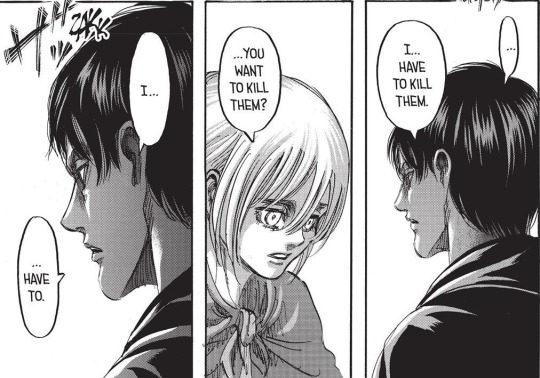
Self-Loathing
linkspooky claims that Eren is acting out of self-loathing for his own weakness and means to throw his life away for the sake of proving himself. This self-loathing is also something he began to overcome in the Uprising Arc.
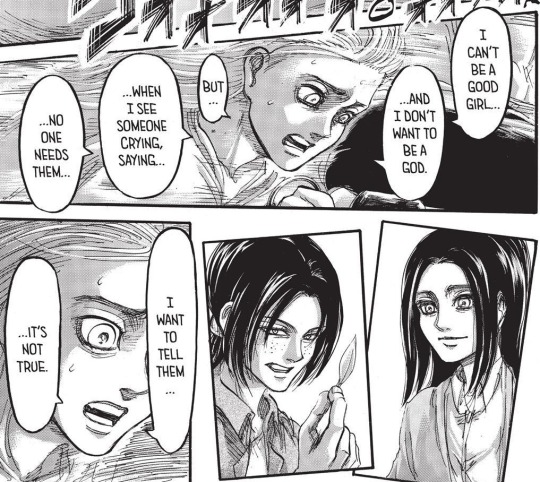
Isayama said in an interview that Historia inspired Eren to escape from that depressive state, and we can see the first signs of it in the same chapter.
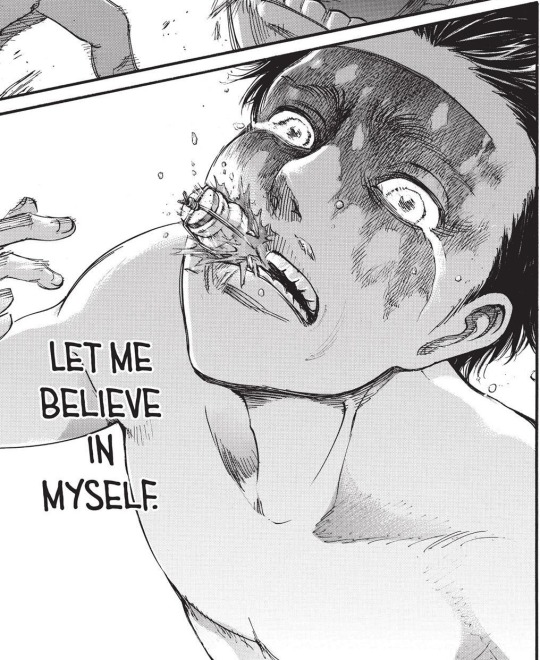
In the Final Arc, Eren has so much self-confidence and love for himself that he is willing to fight against the entire World for the sake of his own desires, brushing aside their hatred and choosing to live for himself.
This is why he is diametrically opposed to Zeke, who does hate himself and wishes he was never born, and out of that self-hatred wants to ensure that none of his kind are ever born again. Eren, on the other hand, proudly states “Because I was born into this world” as an affirmation of his right to exist and to fight for his freedom.
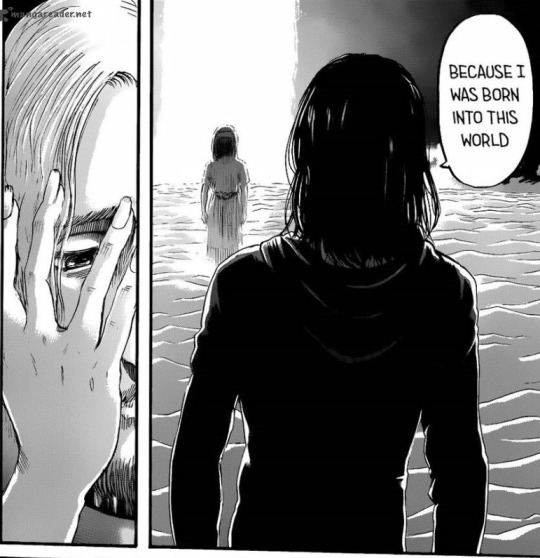
Eren is willing to endanger himself not because he doesn’t care whether he lives or dies, but because he knows for certain that he will soon die as a result of Ymir’s Curse. That is what separates the value of the lives of his friends from the value of his own life; even in Armin’s case he still has much longer left than Eren. As I explain in my attached meta, I find that Eren is using his final years in such a dramatic way precisely because he does believe in the value of his existence.
Fighting with No Release
linkspooky claims that Eren does not want freedom, but perpetual fighting. I think my attached meta should clarify why I believe perpetual fighting to be the very nature of freedom, but even then, if Eren’s aim is truly the destruction of the outside world, wouldn’t that put the conflict between humans and Eldians to a permanent end?
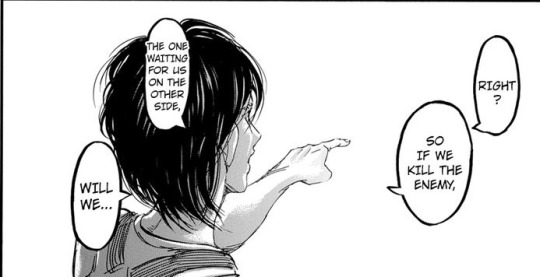
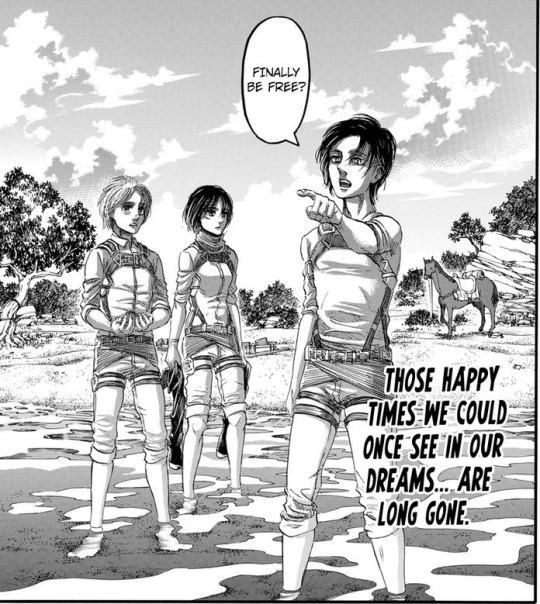
They also make the claim that in killing the Reiss family, Grisha does not manage to save Carla or even Eren, as he manipulates him into a cursed future. However, Grisha does not kill the Reiss family for those reasons. He is unable to do it.
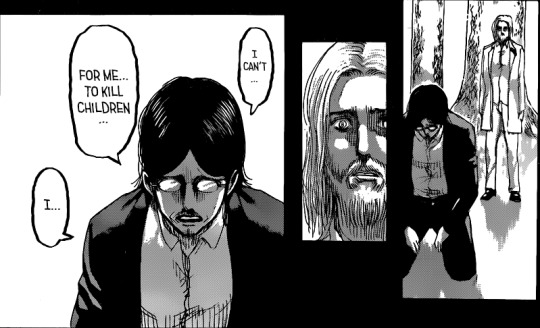
The reason he ultimately makes the choice is not for anyone else but because it is the course of his own Will. It is the story he started.
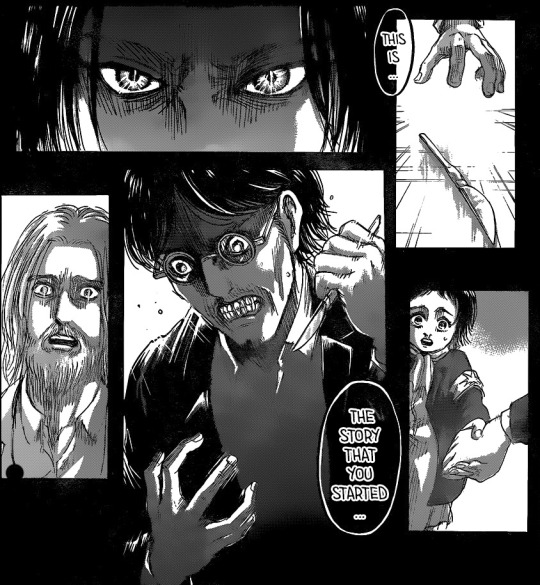
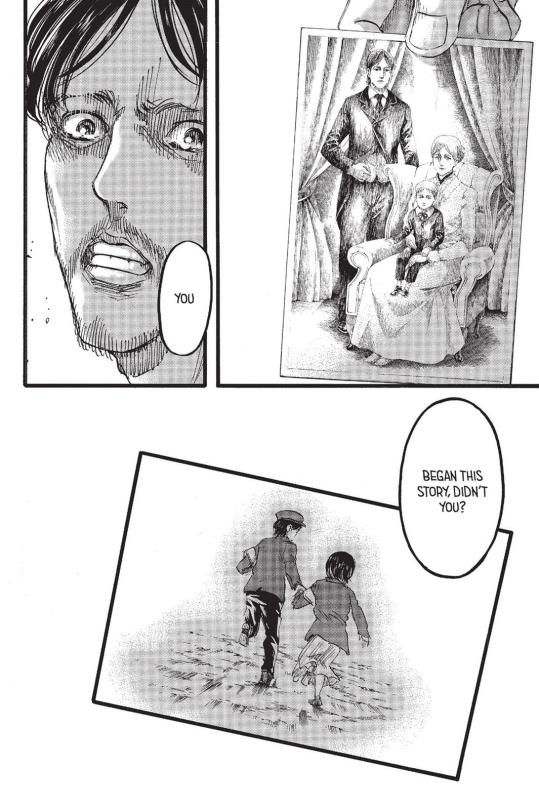
Another of his motivations, secondary but still relevant, is fighting to make the deaths of the past mean something by fulfilling the future Eren showed him.

linkspooky argues that death is just an experience of meaningless losses, which must be accepted as meaningless. However, I find that this conflicts with one of the most inspiring and heartfelt moments of the manga: Erwin’s final speech before his death.
The framing of this speech in such a moving and powerful manner is, to me, a clear indicator of authorial Narrative. Yes, people’s deaths are in themselves meaningless, which is why it is the task of the living to give them meaning – why we have to, as both Hange and Eren have said, keep moving forward, not to forget them and leave them be.
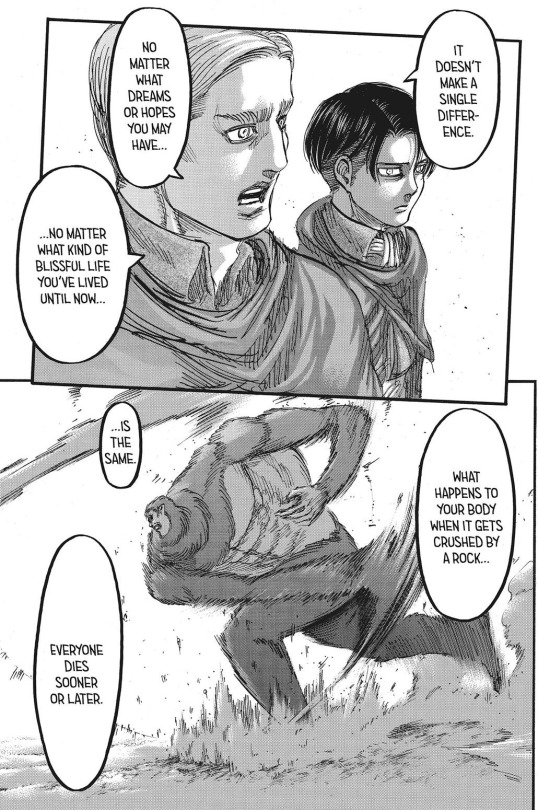
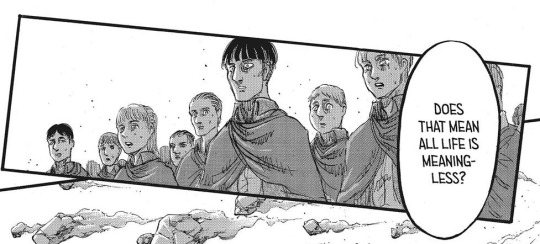
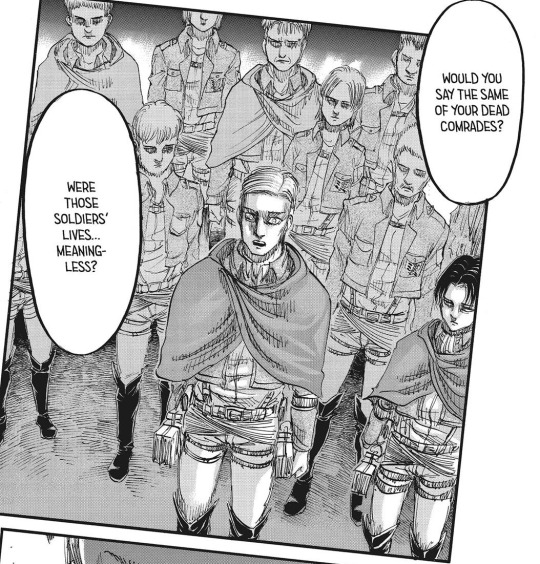
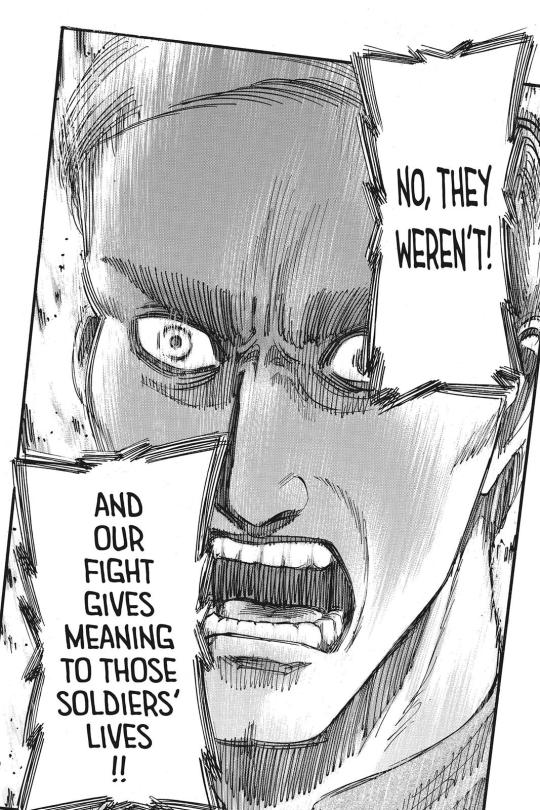
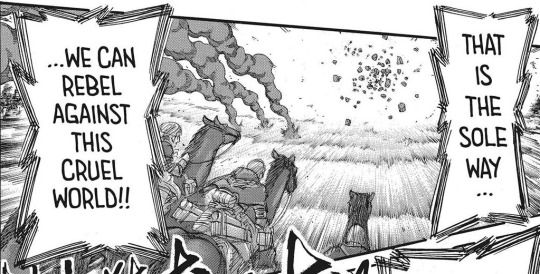
The claim that it was Grisha who manipulated his son is also problematised by this latest chapter. From his interactions with the Future Eren and the visions he showed to him, Grisha clearly knew that being titanised was Eren’s own desire.
linkspooky also brings up Eren’s killing of civilians to show he is not really fighting the World, but fighting for the sake of fighting. This ignores the fact that he also killed the ambassadors of almost every nation on the planet, who are surely representative of the World more than any other. This even extends to the leader of his own nation, though inadvertently, when Zackly is killed by the Jaegerists.
Furthermore, civilians, though innocent, are still part of the World and are not exempt from that fight. Despite what the meta suggests about Eren’s Personal Narrative, those who propose World-destroying never try to pass it off as a noble thing.
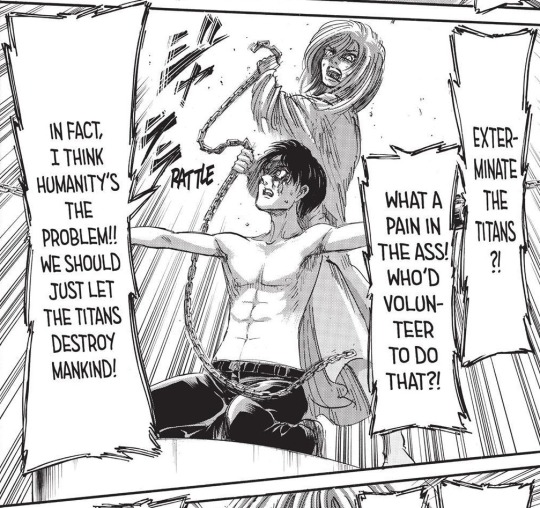
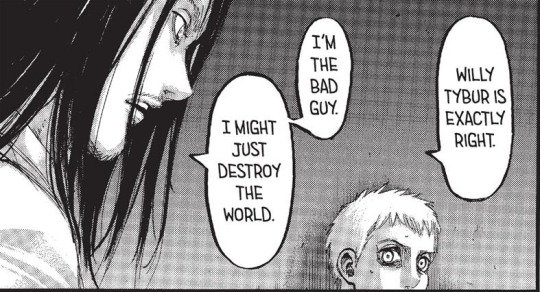
Forgetting Lessons
linkspooky claims that Eren remains stagnant because he forgets the lessons he learns. They use as their evidence Eren brushing off Mikasa after she tells him she’s grateful to him for wrapping his scarf around her. They claim that he does this because he does not accept the worth of his kindness and insists on fighting instead.
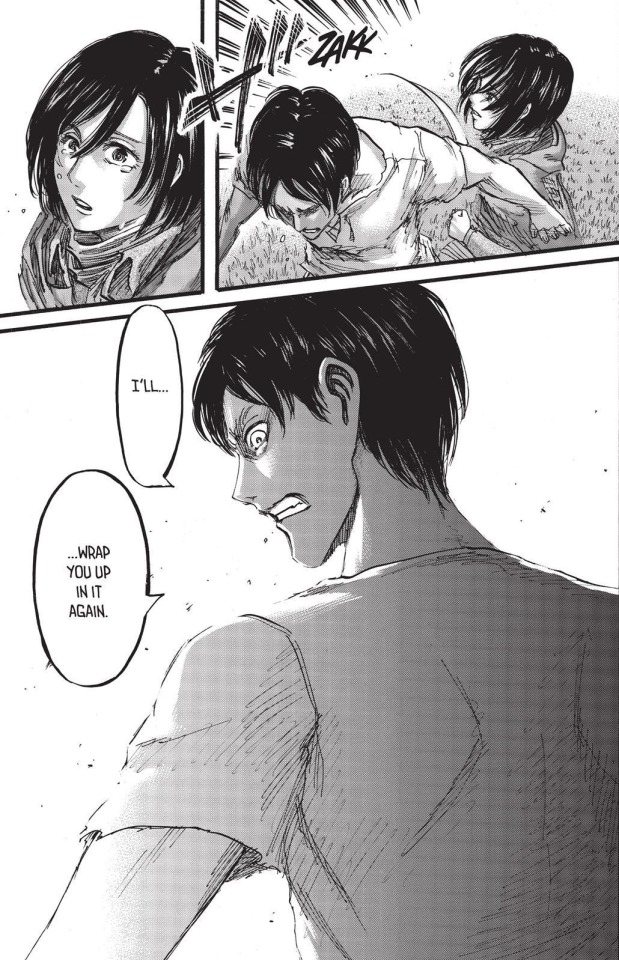
Tone is a tricky thing, but I do think the tone of this scene is widely agreed upon to be a heartwarming one. I don’t think anyone was angry at Eren during this scene or thought he didn’t value Mikasa’s words. The strength of the tone suggests authorial Narrative to me, which makes it very hard to see this moment as something negative.
The claim that Eren doesn’t listen to her because he brushes her aside is directly contradicted by the next panel, where Eren repeats her words and shows how they have resonated with him. I find the forcefulness of Eren’s shaking off to just be the forcefulness of his feelings.
Moreover, can anyone argue that Eren did the wrong thing here? Had he decided to renounce violence instead of punching Dina, he, Mikasa, and the entirety of the Survey Corps would have been devoured on the spot. linkspooky appears to argue that violence is incompatible with kindness, but Eren is now protecting Mikasa with violence precisely because of his kindness.
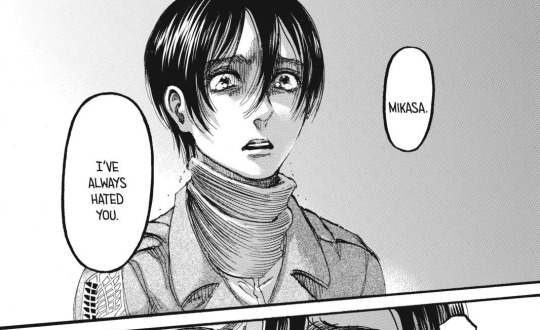
The meta claims that Eren telling Mikasa he’s always hated her proves that he forgot the lesson he learned here, but both I and linkspooky agree that Eren is lying in that scene to put her at a safe distance. If they mean to argue that Eren is neglecting his kindness for the sake of fighting, I restate my argument that he is fighting out of that kindness.
linkspooky also makes the claim that Eren forgot the lesson he learned from Armin’s death, which was that Armin was worth more than him because he pursued freedom instead of just clinging onto his hatred. I think I have already sufficiently argued that Eren has developed past blind hatred and now fights for genuine freedom.
Armin’s Reason for Self-Sacrifice
The meta claims that Armin sacrificed himself out of a sense of inadequacy and a need to prove himself. This, I find, is an insecurity Armin overcame in Chapter 11, where Eren and Mikasa tell him his worth up front.
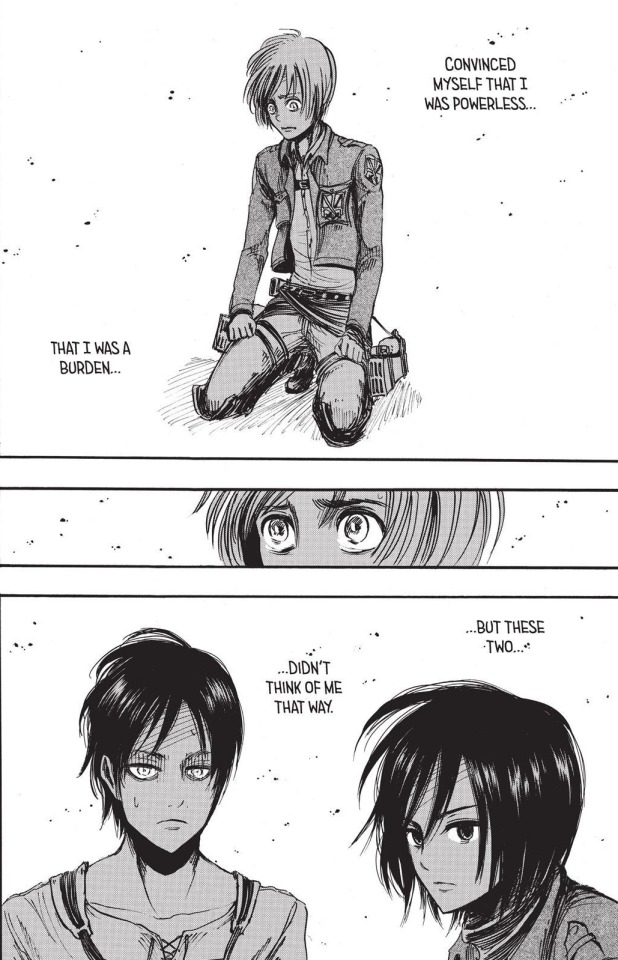
My understanding of Armin’s sacrifice is that he was acting in accordance with his doctrine that those who cannot sacrifice anything can never hope to gain anything.
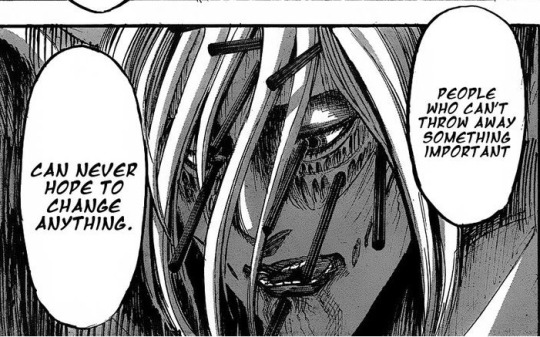
Historia Representing What Eren Thinks He Wants and Mikasa Representing What He Really Wants
It is unfortunate that the phrasing makes this sound like a rather immature ship war comment, but I’ll assume that ‘Historia’ here means ‘Eren’s vision of the future as represented by Historia’s hand’.
Even then, to argue that a deliberate contrast is drawn between these images is, I think, lacking in evidence. Had Isayama wanted to do that, he surely would have juxtaposed these images against each other. But instead there is an ample amount of space between them.
As for the nature of the scarf scene, for that I have already given my interpretation in the previous part.
Eren and Zeke’s Bonds
linkspooky argues that the difference between Zeke and Eren is that while Zeke values the connections he doesn’t have, Eren doesn’t value the connections he does have. I think the first half is very insightful, but I strongly disagree with the second. Rather I think the difference between them is more simply that Eren does value the connections which he does have.
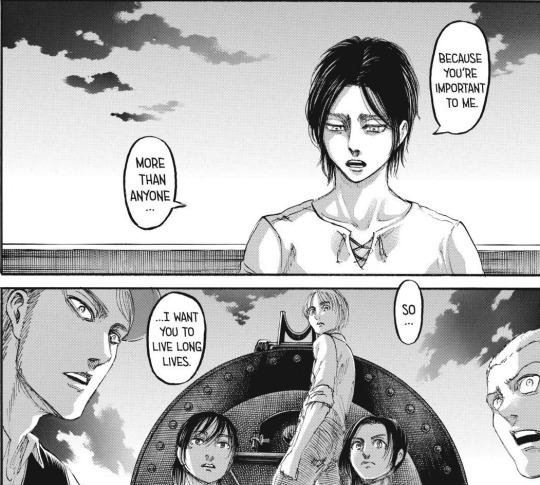
Because I believe he is fighting to defend those loved ones, I could never make the claim that he does not appreciate them. Those bonds are so important to him that he is willing to trash them in order to preserve them. While that may seem paradoxical, it reminds me of this line from Bakemonogatari:
“I care about my debt to you more than our friendship”.
linkspooky’s argument, however, is that while Eren wants to defend his friends, it’s entirely in a selfish capacity and he does not think of them as free human agents, as he never allows their words to get through to him.
I’ve argued in my attached meta about how one can only ever really look out for one’s own freedom, but in the first place, I think the argument that Eren never listens to anyone else or allows them to reach him is factually incorrect. He listened to Historia, as proven in Isayama’s interview. He listened to Petra in taking her advice to rely on his comrades, and only changed his mind based on the consequences.
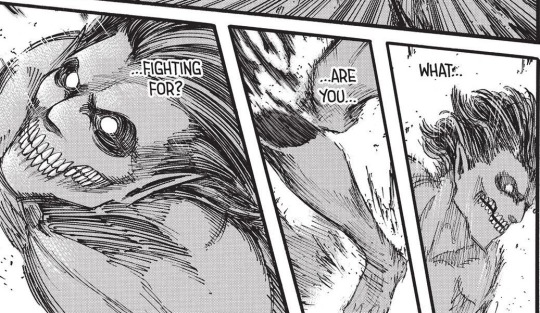
Annie reached him by shaking his black-and-white conception of the world and making him want to understand his enemies for the first time. Reiner reached him as a kindred spirit which he recognised in Chapter 100.
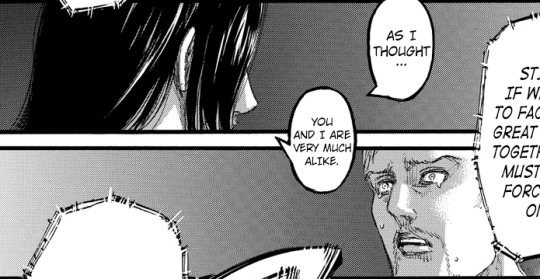
He listened to Shadis:
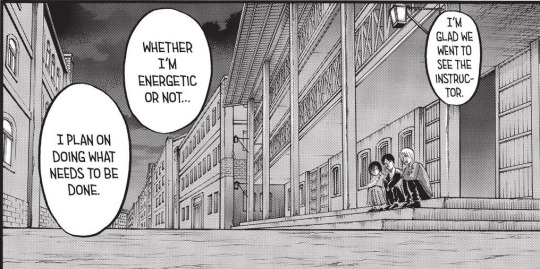
And his newfound emphasis of being ‘born into this world’ suggests he listened to Carla through him as well.
But for the sake of argument, let’s suppose that Eren doesn’t treat his loved ones like people. How does prioritising his desires over his friends make him ‘weak’, as linkspooky claims? I understand how fear of losing them might make him so, but it seems that selfishness is being argued as a form of weakness in this meta as well.
Throughout the ages there have been many attempts to conflate the Strong/Weak system of values with the system of Good/Evil, but I think all of us understand on an instinctual level that ‘strength’ is nothing more than a measure of power – a single unarmed titan is undoubtedly stronger than a single unarmed human. Yielding your own Will to the Will of others is surely an indication of submission rather than strength, no matter how moral it may be. Power can only be found in the pursuit of one’s own Will to Power.
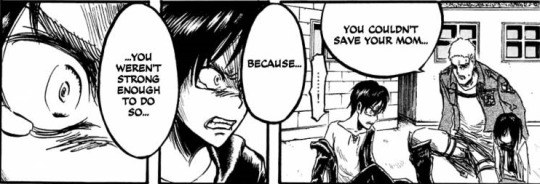
Eren failed to save his mother because he wasn’t strong enough. Lying down and accepting the death or enslavement of his loved ones would be every inch as weak.
So then, let us continue to suppose that Eren does not appreciate his connections. If this is true, Zeke is in no ways different. He does not unconditionally value the connections he doesn’t have: he hated Grisha precisely because his love for him was highly conditional.
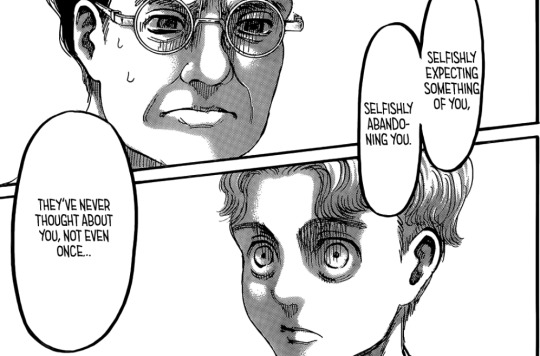
The same is true of Zeke’s love for Eren. Zeke is not treating Eren as a free individual despite his disagreements as the meta claims - he is keeping Eren trapped in the Path Dimension until he comes around to his point of view. The claim that he cannot bring himself to manipulate Eren is also untrue, because if that were the case he would have told Eren that the one with royal blood is the one who commands Ymir-Sama – but he didn’t, because he was manipulating him.
It is true that Zeke could have activated the euthanasia immediately, but he has no need to in a place of infinite time. His determination to convince Eren beforehand just illustrates his manipulative nature even further, as he cannot tolerate disagreement in his loved ones.
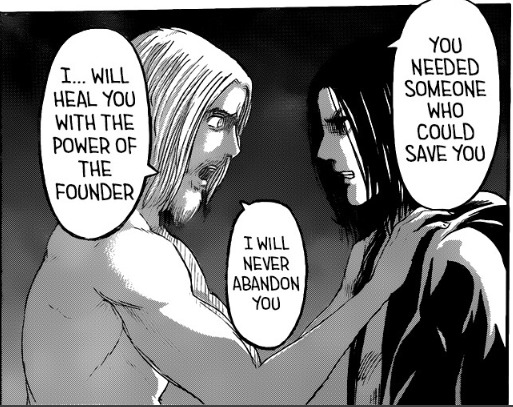
He talks of ‘healing’ and ‘saving’ Eren, as though he were a lost lamb in need of enlightenment rather than an individual of opposing desires. His only explanation for their differences is that Eren has been brainwashed. When Zeke finds out that Eren chose this path freely, his love is completely replaced by fear and he tries to activate the euthanasia without Eren’s consent.
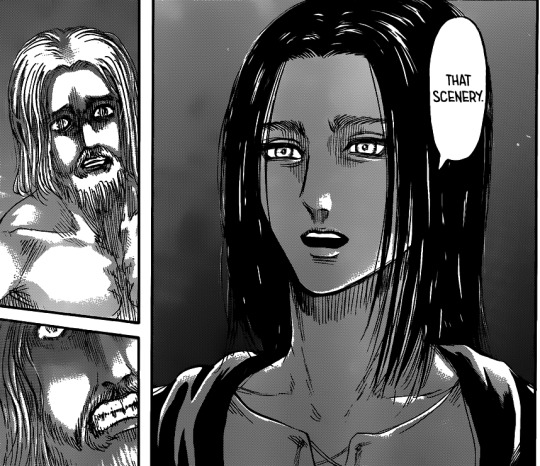
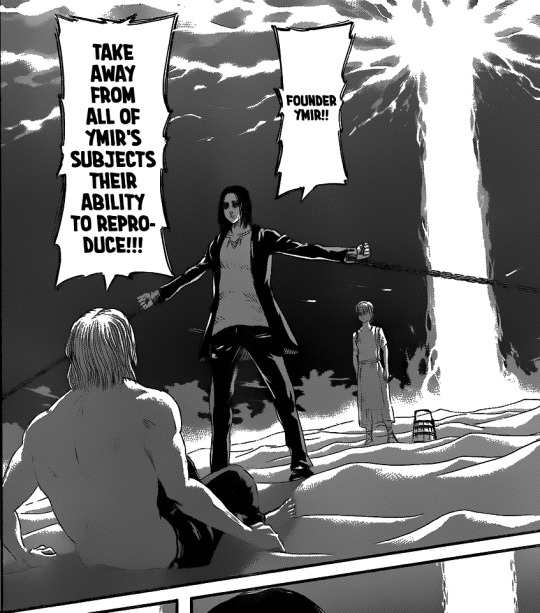
There is nothing unconditional about Zeke’s love.
The meta also claims that Eren is showing Zeke his happy childhood in order to mock him. But that is not the case at all - Eren is largely silent for that portion of Grisha’s memories, only speaking up in an effort to cut it short. The only one making observations about Eren’s happy childhood is Zeke.
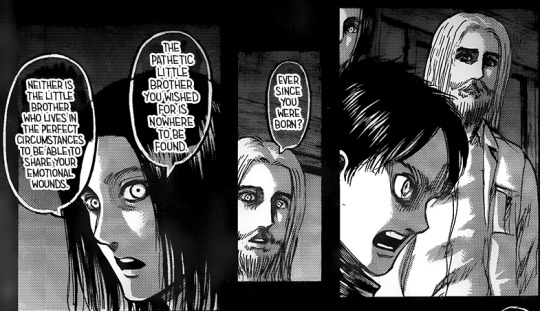
linkspooky considers the above panel to be Eren mocking Zeke, but I find it to just be Eren laying down in no uncertain terms that he’s not the willess child everyone keeps assuming him to be, that he does have a will of his own and he does act on it.
The Meaning of Carla’s Words
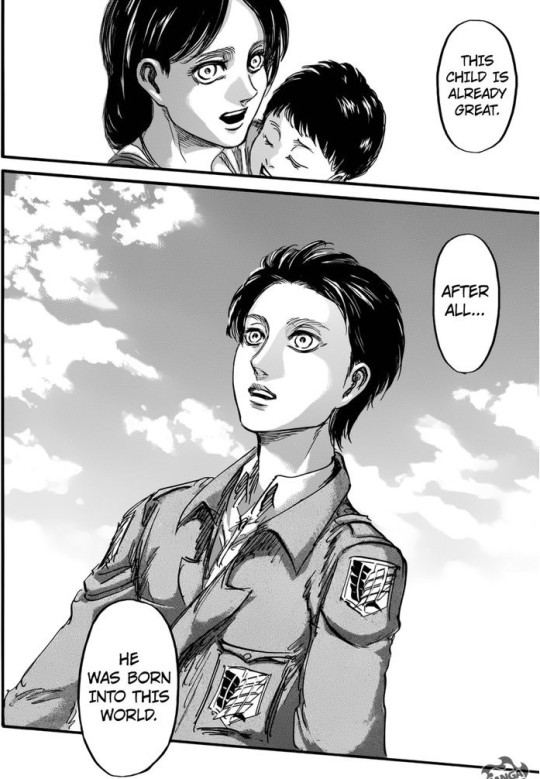
linkspooky claims that Eren is misinterpreting Carla’s words by feeling the need to prove that he is special despite already being special from being born into this world. It was precisely those words, however, that broke Eren out of that delusion – again, in the Uprising Arc.

The fact that Eren has become what-is-called-special regardless is an example of the loop that I describe in the attached meta. He is no longer fighting out of the need to be special (and this is perhaps what has made him truly special, as opposed to someone like Keith), but because, as he says, he was born into this world - and he wants to preserve the ability of Eldians to live the kind of ordinary lives Carla envisioned.
If Zeke has his way, no Eldian will ever be born into this world again. If Marley have their way, the Paradis Eldians will be wiped from the face of this world. The Survey Corps’ way would subject Historia to a life of enslavement, and, with the withdrawal of Hizuru’s aid, is no longer feasible. It is only Eren’s way which values their being born and allows Eldians to live free lives.
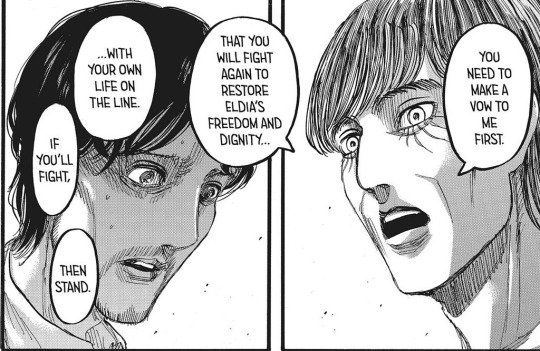
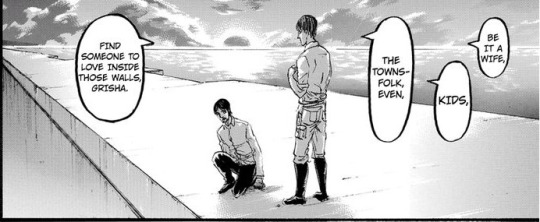
Kruger wants Grisha both to fight for Eldia and to live a loving family life. They are not mutually exclusive.
Eren’s Happy Childhood
The claim that Eren does not value others because he had a childhood where he was unconditionally loved omits everything that happened to him after he was ten years old, when his parents were brutally snatched from him, his neighbours were massacred and his hometown was destroyed.
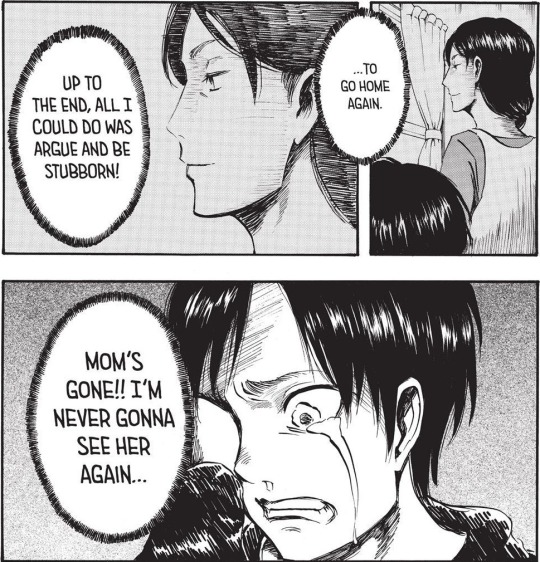
He openly expresses regret over not having appreciated his mother enough, and, just as linkspooky argues, his powerlessness at her death was a major cause of insecurity. In the Crystal Cave he also believed that his father manipulated him into a terrible destiny. Eren is no stranger to parental issues either.
Freedom as the Freedom to Not Get What You Want
I find this claim directly contradicts the definition of freedom, which I go over in my attached meta, and thus renders it a meaningless term.
Symbolism of Eren in Chains
Eren does frequently wind up enchained or imprisoned, but the real value of the symbolism is the fact that Eren invariably escapes from his confinements. The chains depicted in linkspooky’s argument are broken by Eren in the very next chapter.

Rather than representing his enslavement, those broken chains demonstrate his successful struggle for freedom.
The Manga Is Calling for Him to be Stopped
Characters are calling for him to be stopped, because as argued in the attached meta, freedom is a terrifying thing. If we want to find the authorial Narrative, we should investigate it through symbolism, and it’s difficult to read Eren breaking his chains as an image of enslavement.
Well, in many, many words, I hope I’ve successfully explained my position. Well done for getting to the end! I do it for my boi Ereh.
142 notes
·
View notes
Text
Tales From Mount Othrys
Ajax: Birth of the Triple A Chimera
Warning: cute fluffy creature death. I tried not to make it graphic. :/
The fall splintered your body. It ruined your mind.
Like Lucifer grasping at the heavens, wondering, But you said you loved me, your hand extended towards her, clinging to a snapping string, to your love, admiration, and respect. To the world how it once was. To a world how it should be.
But she let you crumble into oblivion. That angel of Justice. Your Michael. The slick-fingered Azrael. She condemned you to be lost forever.
Banishing herself into the bosom of a merciless moon queen, she left you there, on the cliff’s bottom, a scattered mosaic with nothing but Achilles’ curse keeping your meat suit together. Your eyes stare out like the exit of a well. Blank.
Dead? No. I trembled to think you dead.
Your injury is hidden behind a sheet of skin, but I can see your mind break. She betrayed your trust and betrayed your love. Your eyes gaze to the heavens as I cradle you, and you think you are lost.
I won’t let you fall apart. If God doesn’t want us in his court, we shall build our court up to him and make him love us.
--Jack, The day Thalia kicked Luke off a cliff
“Can you babysit Ajax this Friday?”
Pax wasn’t supposed to be eavesdropping on Axel and Alabaster and probably wasn’t supposed to hear that question. He was supposed to be moving boxes from the front of the new laboratory’s atrium to the center of the laboratory. This is where he hoped he would be turned into a variety of rodents (or mustelids, as Alabaster had corrected him: otters, minks, weasels—and that one time Axel was turned into a wolverine—were all part of the mustelid family).
Technically, Pax was still doing his job. He just slowed down when entering the central hub of the laboratory, where Alabaster and Axel were talking.
The two had dragged in a massive crate of magical artifacts from different colonies of Greece. Really, Axel had carried his side while Alabaster was cursing and swearing over a hand that had been smashed in the doorway. Axel pulled the box open with a crow bar. Alabaster withdrew a lion mask that he said had mislabeled from Numidia, grumbling that he’d need to fix the labels once they were ready to put things on shelves.
Between grumbles and devious chin strokes—which Pax thought made Alabaster look quite esteemed—Alabaster nodded. “I can watch him. Same time as your normal matches?”
Axel’s Adam’s apple bobbed. He set the crow bar atop a stack of unsorted wooden boxes with a thunk. He undid his hairtie, shook the mane of braids and locks out, and went to retying his hair. Recently, Axel had quarter-shaved one side when he found a wad of gum in his bed. Pax knew it was Mercedes. Would anyone else believe him? No. Pax got blamed.
“Thirty minutes earlier. Jack and Luke want to add in a pre-show. Apparently, they’re going to be recorded and sent to Antaeus. Luke… thinks he’ll like them.” Axel puffed up his cheeks and popped them. The motion made the shadows under his eyes look like a pit of Cocoa Puffs.
“Ajax mentioned that you haven’t been sleeping well,” Alabaster said. Although he held the mask up, like he was examining it with the aloof expertise of someone that Indian Jones would rob, his gaze narrowed at the older boy.
Pax hoped Axel would listen to Alabaster.
Instead, Axel glared at the door entrance, where Pax hovered with another box. Pax thought he’d been inconspicuous. He’d been wrong before though, like the time he tried sneaking into the girl’s bathroom with Matt. Their wigs and fake boobs had taken Pax a full ten minutes to assure they weren’t lopsided.
“You little snitch,” Axel snapped.
Pax gave him an innocent grin. “That’s literally my job.”
Alabaster sighed. “Get out.”
“You told me to carry in boxes,” Pax complained, setting his atop another with a huff. This box was, in fact, full of various bird feathers and did not warrant a huff, but he relied on Alabaster and Axel not to check the label.
“Yes. To carry boxes in. Not to eavesdrop. Take a camou blanket and go find Sphinx.” Alabaster pointed to the door.
Sphinx was Lou Ellen’s Mist cat, one that (Pax was disappointed to discover) could not sprout wings or a tiny human head. Alabaster often pretended Sphinx had escaped to give Lou Ellen and Pax busywork. Pax loved it. They could pretend they were hunting through the savannah. Shoddily-made safari hats included.
Today, Alabaster gave him a meaningful look. After Axel’s last match, Alabaster had agreed to talk to Axel about the nightmares. If nothing else than to get Pax to shut up for thirty minutes. Pax agreed to fifteen and they had themselves a deal.
Pax knew the real solution was to end Axel’s arena fights. Killing legionnaires for sport in front of a live audience? Good for super villains. Not good for secretly-squishy older brothers.
Axel always had nightmares, but he could hardly get through a few hours of sleep without waking up screaming. The nights that he carved a new scar into his cheeks—one for each person he killed—were the worst. “They deserve to be remembered,” he had explained. His morbid collection of trinkets from the dead had grown too large for their room (and too much like a “ZOMBIE VENGENCE HERE” sign for the inevitable apcocolype). Scarification was Axel’s new method.
Apparently, Luke wasn’t about letting Axel stop his fights; Jack said the ratings were too good.
As such, Pax hoped Alabaster could magic the nightmares away. That seemed like a healthy way to repress trauma, right?
“Ajax,” Alabaster said in his Don’t Make Me Remove Your Mouth voice.
Pax scrambled to a box with some of his, Jack’s, and Axel’s band equipment. Prometheus—likely in attempt to gain Alabaster’s eternal hatred—had suggested the boys do band practice in the laboratory while it was being set up. The lab was out in the middle of nowhere and non-disruptive for anyone but Alabaster (a hermit who loved silence). Luke thought this was a grand idea.
Pax’s fingertips found the cold, stretchy fabric of the camou blanket. They hadn’t figured out what to use it for, but Jack was sure some inspiration would hit while they were practicing.
In the meantime, Pax tossed the blanket over his shoulders and slunk out the door.
There were only a few rooms in the building. Boxes littered the front atrium and back entrance. His fingers twitched to think of all the magical ingredients mishmashed in the cylinders resting on walls and various, mysterious jugs. Supposedly, Alabaster had labeled everything. Unfortunately, Matthias was in charge of dropping off their stuff from the Princess Andromeda and had taken the courtesy to do artistic renderings over each label. To put it kindly, Matt was a genius of ideas, but would starve as an artist.
Alabaster’s new laboratory was a pioneer project—the first land-based operation center, functioning almost independent of the soon-to-be self-built Mount Othrys. Pax had ignored most of the politics involved in asking Kronos for the separate space (an area Alabaster, Lou Ellen, and Lamia didn’t need to worry about blowing up the Princess Andromeda while experimenting with magic of mass destruction). All Pax cared about was why they weren’t wearing pioneer hats if this was a pioneer project. He had even offered to reenact dying from cholera a la Oregon Trail, though no one paid him much mind.
This was super top secret. No one knew where it was. Not even Axel and Pax knew where they were going until that morning. Pax wondered what Matt knew about it and how Alabaster had managed to commandeer Axel and Pax during would-be band time. From what Pax had heard, Jack was conspiring to visit as a surprise (which meant he, and by extension, Flynn knew the location). If anyone could puppy-dog-eye information out of people, it was Jack. Pax aspired for such unassuming, devious cuteness.
Pax crept over a Styrofoam box he could only assume contained dry ice and perishable ingredients where Matt had sloppily etched a Yeti. Or those spiky bits could be a crown of thorns for a stick-figure Jesus. Pax would have to talk to Matthias about blasphemy later.
At the front, there were pillars on either side of the entrance, and a low wall between the two of them, forcing anyone advancing to pick one side or the other to enter. Alabaster explained this was in honor of Hecate and there were—in fact—three different paths to take. This led Pax and Axel to energetically vault over the low wall. It warmed Pax’s heart. Alabaster pretended he didn’t care about them, but, for whom else would he personally design an obstacle course?
A tail flicked on the other side of the wall.
Pax crawled up against it.
The front had a concrete patio with no walkway, just long grass, scattered trees, and rolling hills. Soon, the children of Hecate would make runes around the place to ward off attention. They had already put some in place to make it so no one could stumble upon it unless they knew to look for the laboratory. Pax called it paranoid. Alabaster called it preparedness.
The stone wall felt cold against Pax’s back as he flattened himself, keeping the blanket wrapped around him. This gave him a good view through the doorway—in case he could spot Axel or Alabaster for more eavesdropping—and a narrow view outside.
There, curling around the end of the low wall, was Sphinx. Her black hair bristled. Pax assumed she had see him and was lazily coming his way for pets.
However, her head wasn’t turned towards him. Her ears were alert, gaze surveying the tall grass.
Pax opened his mouth to chirp at her.
Something thudded into Sphinx’s neck, pinning her to the building. It happened so fast, Pax didn’t register that Sphinx was dead.
He was accustomed to seeing violence against humans in his favorite gore movies, his father’s “entertainment nights,” and the few cage fights he’d seen Axel do. He was used to it against mythological creatures.
Seeing the thing protrude from her scruffy fur made Pax cover a scream.
An arrow. It had been an arrow.
“Bryce, what the fuck!?” someone hissed, only a few yards away. “It was a cat! You could have given away our position.”
Pax froze, keeping his hands clamped over his mouth. Had he made a clapping sound when he covered his lips?
“A witch’s familiar, Centurion. It might have alerted the leader of Hecate to our presence. It wasn’t a real cat.”
Not a real cat. Pax thought about the times Sphinx had chased him around the ship’s laboratory when he was various rodents, the times she’d snuck into the Pax brother’s room to curl up on Axel’s chest as a space heater, the way Lou Ellen giggled with glee to see her “baby girl” lose all her grace and elegance to the superiority of a laser pointer.
Her Mist body crumbled and collapsed, leaving the arrow pinned into the wall.
Tear burned the rims of his eyes. The urge to sob reminded Pax that he hadn’t been breathing. He couldn’t tell if the world was spinning from a lack of air or from panic. A warning slithered in the back of his head, if you breathe, they’ll know you’re here.
The camue blanket had fallen to his shoulders when he grabbed his mouth. Hands trembling, he clutched the edges.
This voice drifted from the other side of the low wall.
They’re surrounding the building. Pax swallowed. Centurion. Romans.
“You’re fucked up, Bryce,” a third mumbled. “We weren’t supposed to move until Cahoon cut the power.”
If they cut the power, all the phone lines would go down. Unlike other demigods, Kronos’ men didn’t fear drawing monsters with technology; they welcomed new recruits. But, Iris wasn’t exactly cool with delivering messages for the opposing side. If they lost the power lines, they might not be able to get word out.
Pax’s breath went from nonexistent to ragged.
Alabaster had wanted privacy and quiet to set up his lab. Matthias was only supposed to do one drop off that morning. They didn’t know when Jack would show up.
They were alone.
“I can’t wait to mount a lion’s head on my wall,” the second guy, Bryce, muttered. His voice had a bouncy energy to it. Pax had heard of pre-battle jitters. These sounded too light.
A Lion’s Head. Pax choked on a whine. They’re talking about Axel.
“The lion’s head is mine,” a feminine voice stated softly.
“Alright, Ari. Sheesh, we get it. You’re mad that that cannibal ate Julian after he killed him.”
A tiny, detached part of Pax wanted to squeal a protest. Julian? Praetor Julian? The first person Axel had killed. He hadn’t eaten him—Axel fought to get Julian a proper funeral so he would remain uneaten.
Everything felt like it was tunneling to the arrow on the wall. How much time had he wasted cowering here? His brain fumbled. This was it. This was his job. He was the recon guy. That’s what Mercedes had been—
What would Mercedes do?
Pax fumbled to his belt, to the mirror she had specially made for him. It was reflective, but the surface was dulled to minimize glare. He forced himself to take two regularish breaths, to not picture Axel’s head on a wall.
“Damn it, Bryce. How did you get put on this mission? Just remember we’re not supposed to kill the younger kid with the two colored eyes. You heard command. He’s their spymaster’s assistant and a whole wealth of information.”
They know a lot. They know too much.
With as little noise as he could manage, Pax shifted the camue blanket up his arm, so he could hold the mirror with a covered hand. He leaned against the edge of the wall, tilting the mirror to see into the fields.
Memo to self: request magical one-way camue blanket that he could see-through but others can’t.
“He needs to be able to talk. Doesn’t mean he needs to be able to walk.”
“I reiterate: you’re fucked up, Bryce.”
“Quiet,” the feminine voice, the centurion, growled.
There they were: not people, but ominous divots in the grass. They might have been wearing camue blankets too, though Pax doubted it. These weren’t professionals. Pax could tell from the loud chatter. He wondered if they’d been gathered in a hurry and hadn’t been able to vet out people like the cat-killer, Bryce.
About thirty feet away, beyond the long grass, two people stood by the power line in construction workers outfits. From what Pax could see, something glinted under the bright orange reflectors: armor. The perfect, quick cover. Alabaster even said they’d been struggling with power and relying on backup generators. Would the Romans know to cut the backup generators?
One thing was certain: there was no referee to yell at the Romans for bringing too many players onto the field. If Pax had to guess, the back door and windows would be covered too. He shivered to remember Mercedes’ fingers glide across his shoulder. Pax Two, I will give you a piece of candy if you can tell me how many doors and windows we passed in this building.
He wished she were here, barking orders about the obvious things he had missed. But, then she’d be in danger too.
If Pax made it out of this alive, he vowed to write a Hey Mr. ADHD song that promoted concentration and calm. There was a back exit, a front exit, and several windows in every room except the very center of the building, where Axel and Alabaster were unaware of their plight. Pax puffed up his cheeks, barely catching himself before he popped them. He didn’t know if there were any secret exits. That would be prime information.
As he crept back through the atrium, he tilted his mirror out the window. Maybe thirty feet away, he caught sight of movement: snipers. The Romans had scouted the building. They would be watching every exit, and likely had attack forces at each entrance.
Panic later. Move now.
The Romans were far enough away that they wouldn’t be able to hear missteps past the atrium, but Pax focused on the memory of Mercedes’ bells strung at his neck, shoulders, elbows, wrists, hips, knees, and feet. If one of the imaginary bells rang, the Romans might know. They might come in here, skewer Axel, shoot Alabaster in the head with an arrow, and drag Pax off, kicking and screaming.
By the time he reached the central lab, sweat trickled off his face, threatening to make a plopping sound onto the floor. Axel and Alabaster’s voices echoed amongst the boxes. Although they spoke at a normal level, each word made Pax’s ears ring like a cannon.
He couldn’t decipher what they said. The boxes, tubes, and wayward lab and band equipment blurred as he stepped up to Axel, his feet knowing where to go while his mind was numb with fear.
His hand was on his brother’s arm. Axel and Alabaster froze, mid-talk, staring at Pax in worry. There must have been something wrong with his face.
“There is a Roman hitsquad outside. I counted five in the front. There are likely five in the back and there are snipers at every window. They want to kill Axel and take me alive for interrogation. Unsure on their intentions with Witch Boy.”
Once the words were out, it became real. It wasn’t his turn to keep it together. It was Axel’s, the planner.
Which was good, because Pax felt himself tremble with panic.
Thank you for reading! Stay tuned next week to see how well three teenage idiots panic over being surrounded. I hope you guys are staying safe and healthy!
#Axel#Pax#alabaster#Sphinx#SPHINX D:#I love cats and may have cried over this cat that has been mentioned a grand number of two times in the series#Bryce of the Head Shaped like a Dickus#Centurion Ari out for revenge#Tales from Mount Othrys#PJO#HOO#Percy Jackson and the Olympians#Heroes of Olympus#Byrce#Trying to get my steam back#I would rather be giving you guys light-hearted stories right now#but unfortunately this is all backlogged from when I was going through a rough time#soooooo--yay! Angst!#But for real--the rest of the book is basically if all the early 2000 emo bands had a reunion at an Abandoned Twinkies factory
5 notes
·
View notes
Text
Sociopath Profile: Queen Ingrith
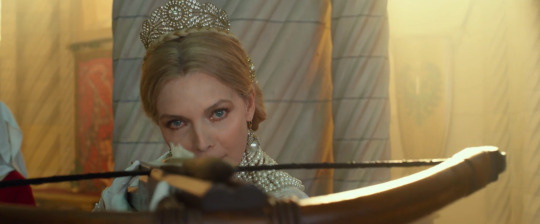
From the 2019 film Maleficent: Mistress of Evil
Played by Michelle Pfeiffer
Okay, you know what, I think we might have a redemption for the first film for being a shining example of the very reason I made the female sociopath list in the first place. Because boy, oh boy! They definitely are trying to make up for it with Ingrith. She is the main antagonist of the film instead of the eponymous “Mistress of Evil”, but that’s another conversation, and she even manages to be worse than Stefan in the first film.
[SPOILERS BELOW]
For starters, she actually harbors no true love for her family. She may feign it when it is convenient for her, but she just proves to be a controlling and dismissive of them throughout the movie. She doesn’t care that her husband has fallen to the same curse that Aurora did in the first film - she even caused it out of contempt for him. She threatens her son with violence. She also does the same to her perspective daughter-in-law. She claims that her brother dying is the reason she hates fairies and the Moors in general, but even Aurora doesn’t buy this excuse. (Even if she did believe it, she wouldn’t think it mattered.)
Ingrith also gets very manipulative. She tried to frame Maleficent for her husband getting cursed, but it was actually her who cursed him simply to justify her hatred of the fairies and an attack on the Moors. She also does this to justify the fact that she has people poaching in the Moors and experimenting on fairies. And since she can’t go into the Moors due to being allergic, she decides to lure them into the church to have her assistant slaughter them all with iron dust.
Ingrith also appears to be very bloodthirsty when it comes to fairies. Even in her first scene, she is looking over various weapons almost longingly. When she picks up the crossbow, she immediately starts pointing it at everyone with a palpable murderous intent in her eyes. Note that her assistant points out that it’s already cocked. She could not give less of a crap about it. She just nonchalantly says, “Is it?” like it was an afterthought. It’s almost as if she was about to let loose some murderous urges in that moment. And despite the fact that she remains calm, she shows that she is more than willing to unleash death and destruction upon her perceived enemies.
She tries to put on a calm demeanor and produce an aura of regal authority. However, when you listen to many of the things she says, it becomes apparent that she’s a bigoted psychopath who is barely hinged as it is. Her talk when Maleficent and Aurora are invited to dinner is littered with faux-compliments and barely-concealed seething contempt. There’s also the fact that she’s a borderline Nazi. Seriously, an irrational hatred for an innocent race to the point of attempting to wipe them out? She’s even a blue-eyed blonde for crying out loud! And she tries to position her views as necessary to the kingdom to everyone else.
And here’s the main issue with her stated motivations. She claims to be doing what she’s doing for the good of everyone, but it is obviously clear that she’s using every justification to carry out her own personal vendetta. Ingrith doesn’t care about her family at all and is willing to use them to her advantage, even if it means killing them. She only cares about herself and her own selfish desires. She may even truly believe what she’s doing is right, but that doesn’t change the underlying fact that she’s doing it because it’s what she wants.
Female Sociopath List
Disney Sociopath List
#Queen Ingrith#Michelle Pfeiffer#Maleficent: Mistress of Evil#Maleficent movie#sociopath#character analysis#profile
5 notes
·
View notes
Link
Little Moments: Reboot
Chapter Fifteen: This Means War
By Ericobard and shadows59
Rating: Teen And Up Audiences
Fandom: Ben 10 Series
Relationship: Ben Tennyson/Gwen Tennyson
Some Additional Tags:
Bullying, No proofreading, Family is Drama, Long burn
People sometimes make mistakes. People sometimes answer those mistakes with mistakes of their own. Eventually, this can lead to a downward spiral of destruction that will take everything with it. Tragedy can break the cycle because no matter what, people need to lean on each other during a tragedy.
Read my review below:
So the chapter starts in a place so charged with magic/mana that Gwen is having trouble containing herself. Then Ben openly snubs her in his mock duel attempt and takes off when Max points out Gwen's interest. Then he snubs the event that he knows Gwen was excited to come to, as was he, and takes off. Then Shadows59 reminds the reader of the events of the last chapter and the negative effect it had on both kids. Then Max puts pressure on Gwen to be nice to Ben. Which she does by getting him a weird smoothie she thinks he'll like. Once more, we are reminded of the last chapter and Gwen's fears of Ben abandoning her. Then she comes upon him bragging to a girl about being the best in their dojo, even complimenting his skills as she scoffs at his lie. Then he's intentionally hurtful and dismissive of Gwen. Gwen notes the girl is interested in Ben. Then Ben plagiarizes Gwen's advice to him about kicking. Then we are reminded again of the fear and drama the Poodle created. Ben shows he's intentionally doing these things to upset Gwen. Then Ben makes fun of the smoothie Gwen got for him and shares it with the girl instead of Gwen, like he normally does. Then Ben and the girl almost share an indirect kiss, something Gwen and Ben have only done once, and she is clearly jealous Ben is doing with a stranger. So after all that Gwen still does nothing except get ready to scream, but without her direction, her magic causes the smoothing to explode out of the cup. In the original there is no drama from an otherworldly horror, Ben isn't mean to Gwen in any way. A girl does sit down next to Ben after the demonstration starts, and he does start talking to her, but he does so for altruistic reasons that will be discussed in a later chapter. Gwen is simply jealous at this and accidentally-purposefully knocks over her drink, which the pair sit in, making it look like Ben peed himself. In the original, even Max indicates that he thinks Gwen may have done it on purpose, but here he doesn't, he's completely in the dark about what happened. As much as one might want to say the situations are the same and Gwen shares blame in both, that's not true. If Ben hadn't been so cruel to Gwen, it wouldn't have happened. Shadows59 is taking something that is at least partially Gwen's fault and gives all the responsibility for what happened to Ben.
There is a part where Ben is about to say that Gwen is the best at the dojo but is cut off by Max's call. The problem is that Gwen mutters to herself after hearing Ben say, "the best fighter in our dojo is-" but before Max calls out, there is no way Ben couldn't have finished the sentence in that time. Ironically this doesn't even need to be a problem, as rather than writing the sentence as being cut off, Shadows59 could have just ended it there, inferring he was talking about Gwen the whole time.
Why is Max sudden completely oblivious to just how upset Gwen is getting with Ben and the girl talking next to her?
It was seen as an incredibly hateful thing for Marci to called Gwen a slut. However, it seems that if you get Gwen a little jealous, she's not so averse to calling other people the same thing.
In the reboot, the chapter perspective stays focused on Gwen; the reader follows her horror and regrets at what is happening through her eyes alone, only gleaming Ben's through her empathy. In the original, the perspective swapped back and forth with each prank, giving both fears and regrets about the situation. This only makes it harder to empathize with Ben, so why change this?
Additionally, Ben's first prank against Gwen, the first real prank of the story, is done reactionarily, in the spur of the moment. In the reboot, he waits days before he acts, having plenty of time to reconsider his actions, and it even happens in what should have been a moment of levity, where they were bonding as heroes. He also does something disproportionally humiliating to her, worse then what she did to him and not even comparable to what he did the original. It too is a bit of a reversal, where in the original Gwen spilled drink made it look as if Ben had wet himself and in the reboot Ben makes it look like Gwen messed her pants. Ben is also the one in the reboot to pretend like everything is okay before pranking Gwen, whereas, in the original, it was Gwen that did this. Why change these things? Again, it seems obvious that Shadows59 is doing this to show Gwen in a much better light than Ben. Perhaps this is not his intention, but that is still what he is doing.
Even if Ben isn't trying to be mean when talking about Gwen's friends being all online, that is still how he comes across, whereas in the previous scene before his prank, she was nothing but nice. This adds to making Gwen seem like the better person. She even reconsiders her prank, but because Ben continues to be mean to her, she goes through with it.
Has Gwen's magic ever not manifested without her hands glowing? If not, then how could she cast in the dark without being seen? Also, if she is drinking from a straw, as people normally do in theaters, her grin wouldn't be hidden.
Shadows59 takes more time to show that Gwen is emotionally vulnerable due to what happened with the Poodle.
Ben pranking Gwen by turning her hair green was the crux of their eventual making up, which will likely be given over to Gwen instead in the reboot. That is bad enough, but to regulate something so key to the original to a throwaway line is hard to read.
Ben can't even prank Gwen without getting caught in the reboot, Gwen never gets caught.
The Omnitrix is a device meant to facilitate communication between alien species. Why would it take an artificial creature and evolve its form way beyond its original state? Communication with its unevolved species would be impossible, and there is no species for it to communicate with. This goes completely against the Omnitrix's function.
Why is there this interjection of Gwen being chummy with her mom? Sure she was worried about her mom being sick, but before that the last thing we read about them that Lili had completely betrayed Gwen's trust by listening in on her phone call. If they moved past that, why wasn't the resolution to that conflict shown?
I do like that Ben takes everything and, instead of impossible hiding them, strings them up in the tree.
The whole bra thing comes across as another interjection of sex into this story about eleven-year-olds. It also makes no sense that Ben, who practically had a mental breakdown when he momentarily felt Gwen's bra under her unitard because it meant she was a 'girl' would now handle her girly bra so much to carefully hang it at the very top of the tree with no problems.
There is also this persistent motif of Gwen being devastated and saddened by Ben pranks, but Ben just howls like an enraged madman when he's pranked. His yelling even summons the cops once, which causes the chapter to almost have a theme of domestic violence to it where Gwen is the sad suffering wife, and Ben is the raging husband that the cops have to restrain.
The original ended with Ben tricking Gwen as a prank after the clothing thing had been done and the pair were thrown out by Max. During the fight, Gwen wasn't one loosely buttoned shirt away from being topless as they fought like animals, and Ben wasn't soaked to the bone. Who started the fight was left vague as they were equally culpable for what transpired. Whereas here, Ben starts it by grabbing Gwen as she excused her move on him as just intending to shove him, after he called her what her bully calls her. Gwen's actions being excused while Ben is left the bad actor is pretty much this fight in a microcosm. Even in the end, he is made out like the final aggressor leaving her to whimper sympathetically with a whole list of injuries and Ben with only one, that Gwen feels terrible about inflicting. In the original, however, it ended on even terms.
"he sounded just as sarcastic as she expected, but... There was something that almost sounded sincere"
Ben can't be sarcastic and sincere at the same time.
In the original, the moment the fight ended Max arrived to tell them the bad news. In the reboot, Shadows59 gives Gwen time to try and reconcile, and she nearly does, which is exactly the opposite of what happened in the original a couple of chapters later.
-Erico
The original didn't need a bunch of drama to start the war; just a single misunderstanding that was relatable, revealing, and eventually showed Ben's good character.
You're right Little Moments didn't have the characters going from "outright hatred to sucking each other's faces off" in the original. In the reboot, however, Gwen won't stop finding excuses to kiss Ben, and he's taken a liking to pinching her ass.
What you described was the original prank war, what has changed is in the reboot we are locked out of Ben perspective while he is being shown as less sympathetic and meaner. Case in point, it is Gwen who tries to make peace at the end when in the original, it was Ben. Why does Gwen need to be so lifted up as Ben is pushed down?
How does the added drama, the addition of sexual innuendo, and long rambling of the story facilitate them being kids longer?
(As always, please go leave Shadows59 a nice positive review he won’t delete.)
#ben 10#bwen#ben x gwen#gwen x ben#benxgwen#gwenxben#ben and gwen#gwen and ben#fanfic#review#Little Moments
2 notes
·
View notes
Text
The idea that Adult!Juno is a negative Zamasu literally won’t leave my mind--
His sense of justice to wipe out evil is as strong as the lime Kai, but instead of turning his hatred to humans,
they’re the ones he’s willing to sacrifice himself for, and even nurtures a grudge for other deities.
Juno inherited the fascination and respect towards humans from his mentor, and knows better than anyone his duty as a Supreme Kai is to watch over them and protect.
But he doesn’t want to do it by sitting in front of a crystal ball and watch everything come undone, only interfering by handing them advice.
Nah, he’s looking forward to slice and dice.
Not very well-liked amongst deities; his belief Supreme Kais should take direct action against menaces is heavily frowned upon; it’s challenging their directrix and they are not prepared for combat like Destruction Gods, but here’s the thing:
Whis trained him. He could face Beerus and almost win. Besides learning how to wield swords, bow and arrow and other tools he’s got sheer power from training under an Angel.
For him, other Gods’ opinions means nothing if they don’t live up to their roles as guardians of life.
Zamasu loathes humans for their violence and disrespect towards deities, for him Gods are above them in an unreachable level. They possess no redeeming qualities and are as good as gone.
I don’t remember much of Zamasu arc bc it’s been a While since I last watched it But.
Their ideals clash in a messy way. If they were to face each other it would get ugly. Two deities bearing strong, opposite opinions towards life and their roles, plus both are trained in martial arts............
IDK I just think that would be a Very Interesting encounter orz
#off#headcanon#put under read more bc it got Long#i'd love to write more about it as soon i stop being lazy and add an adult verse once and for all :U
9 notes
·
View notes